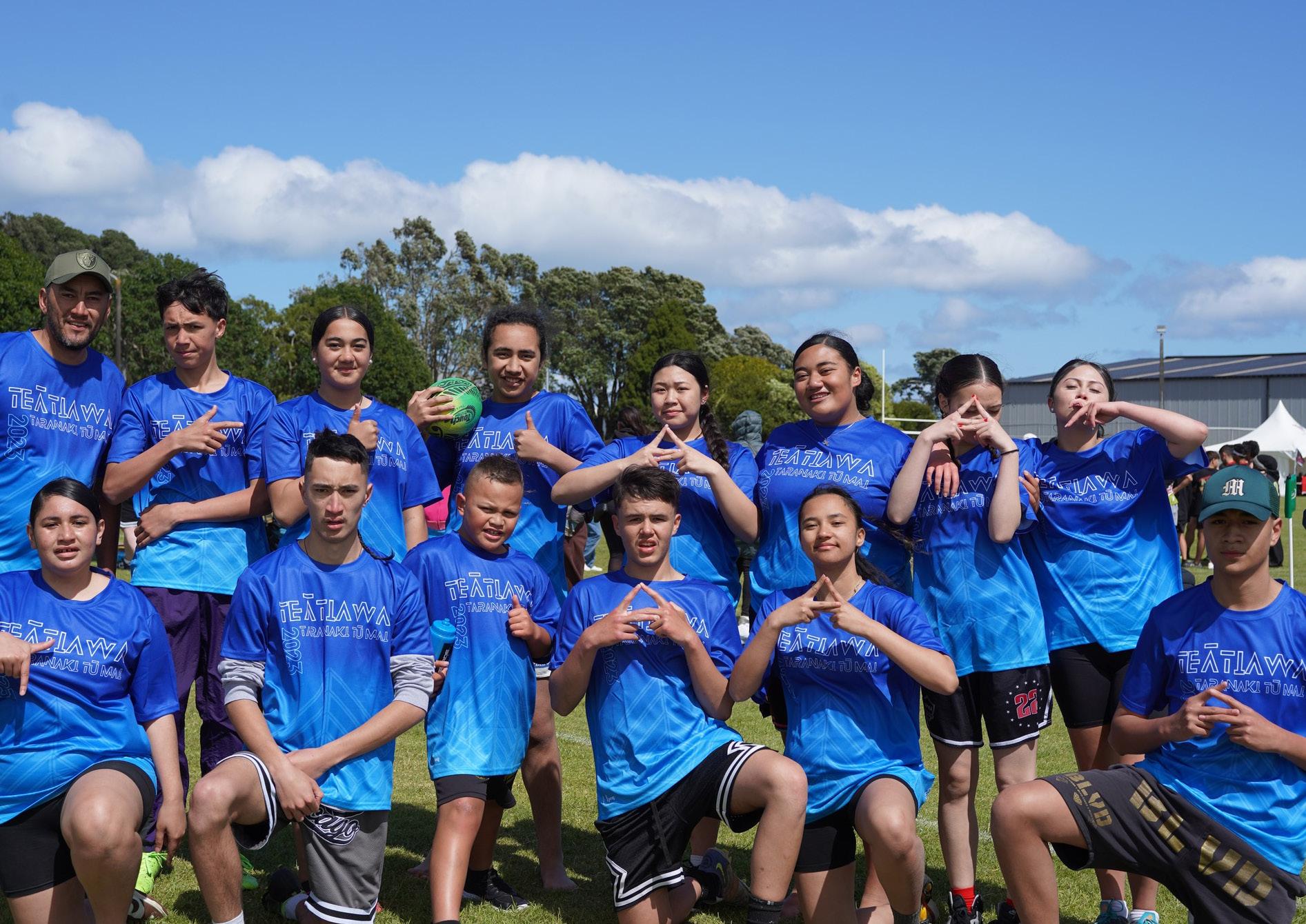
ANNUAL REPORT


ANNUAL REPORT
Tēnei au he pia nāu
Ngarue i te whenua
E Ngarue i te rangi
E Ngarue i te wawā! ki a koe, e Ngarue e.
E rere, e te hau whenua
He hau whenua, he hau moana
Whakaroro ki tai tonga ki tai mā - uru e
Ki te iho tū, ki te iho whenua
Ki te iho tangata nā Hine-ahu-one.
Tēnei ka whai tapuwae
Tēnei ka whai taumata
Tēnei ka whai marae whare o ngā mātua i au e ngaro nei
Hoaia e au ā tapuwae
He hoa tapuwae nō Tāne
He hoa tapuwae nō Tū-matauenga.
Hei hoa whakapakari nō Rongo
Tēnā kia whakanguha mai ki tēnei piringa e i
Tihei mouri ora.
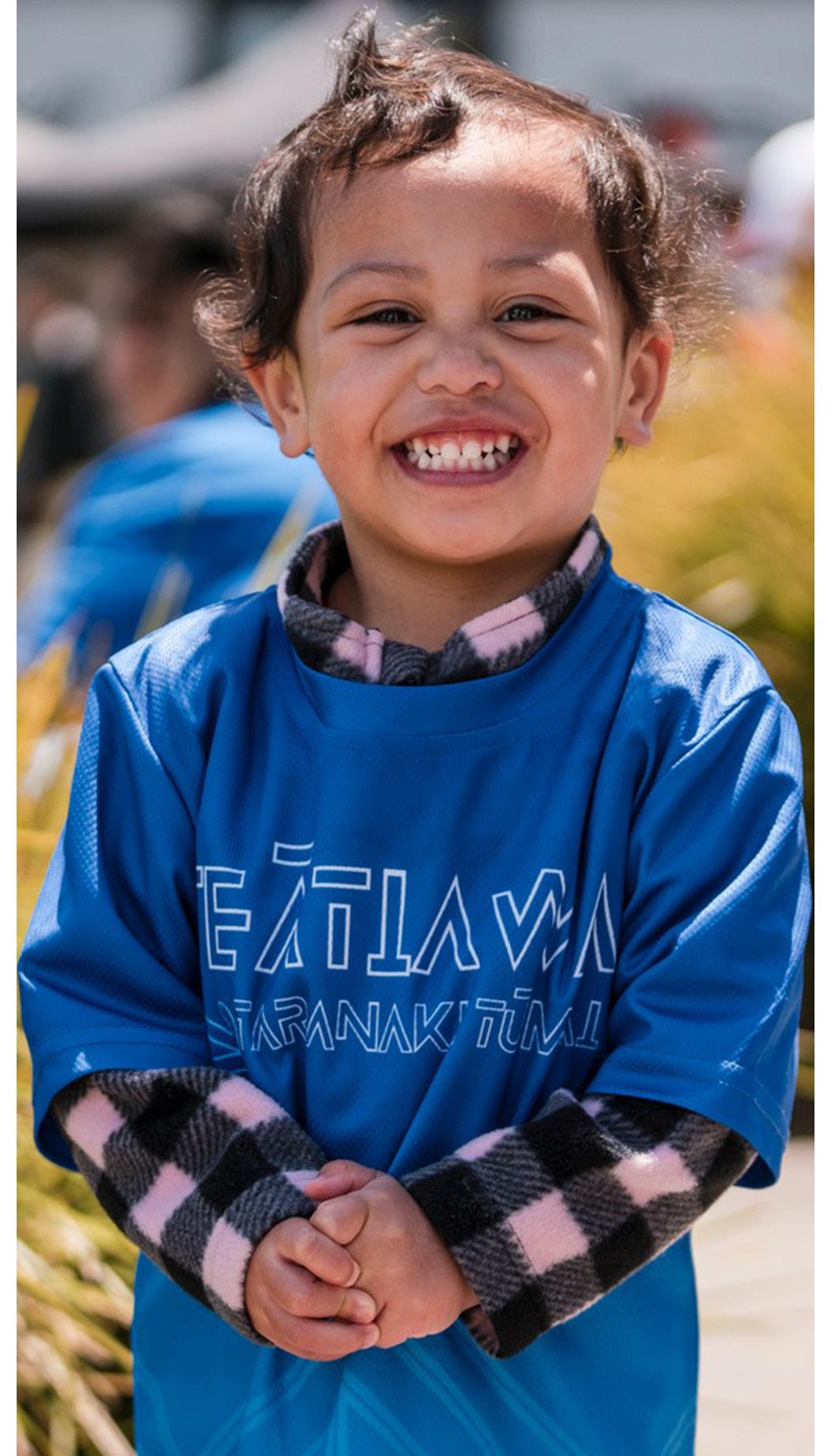
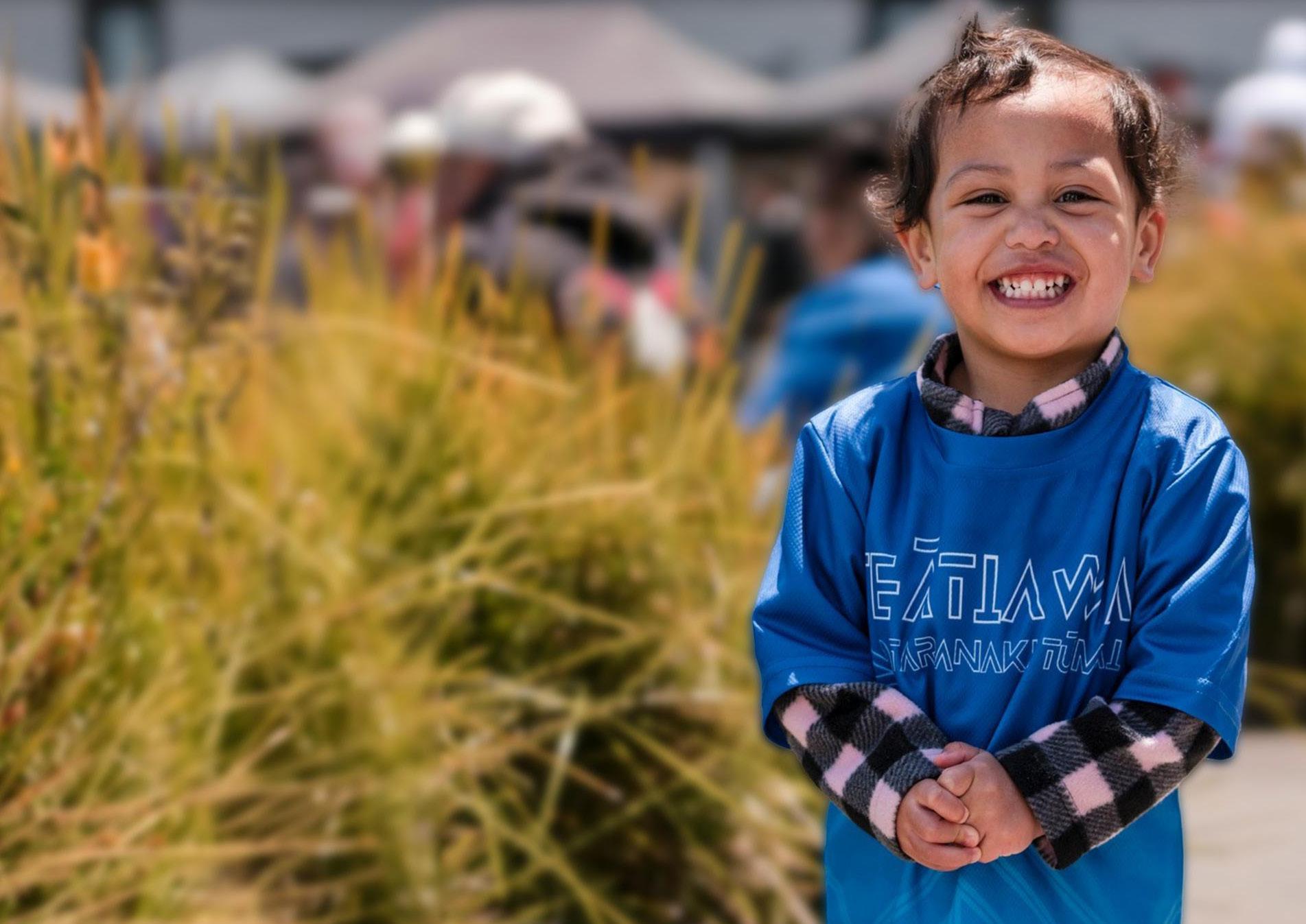
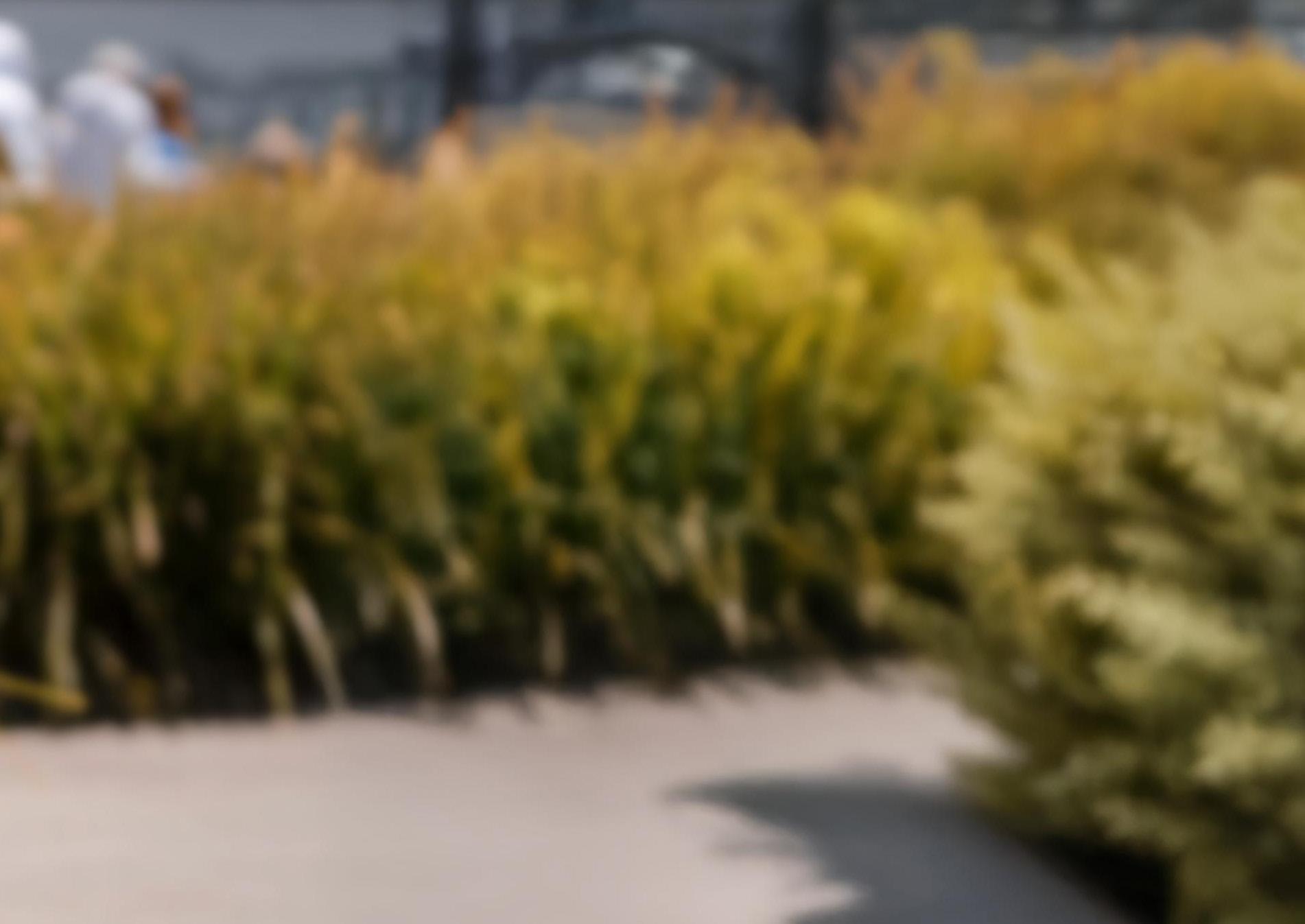
In late 2021, Te Kotahitanga launched its second five-year strategic plan – Te Atatū. This plan marks an exciting new chapter for Te Kotahitanga and Te Atiawa whānau as we come together to build upon the legacy of our tūpuna for future generations.
Te Atatū shows the choices we have made as a Trust, to strengthen and uplift our iwi. It outlines the areas where we will focus our energy and commitment, ensuring we create meaningful opportunities for our people to thrive. Most importantly, this plan sets the path forward, helping us stay on track as we work together toward our collective vision.
This is our chance to shape the future for ourselves and our tamariki, grounded in the strength of our whakapapa and our shared aspirations. Te Atatū is more than just a strategy – it’s a guiding beacon for our whānau, encouraging each of us to contribute to the legacy we will pass down to future generations.
Our Vision
‘Te Iho Tū, Te Iho Whenua, Te Iho Tangata’
Te Atiawa secure, Te Atiawa thriving, Te Atiawa conntected
He Pou Taumata
Our Values
Kia tika, Kia pono, Kia māia ai ngā mahi
We are duty-bound, we will act with honesty and integrity, and we will care wholeheartedly.
Kia toka te ara whānaunga
Embrace the value of kinship and shared experiences.
Kia manawanui
Be solutions-focused, resilient and determined in our endeavours.
Mission Statement
Te Kotahitanga o Te Atiawa Trust promotes connection and unity throughout Te Atiawa to deliver positive opportunities for Te Atiawa whānau.
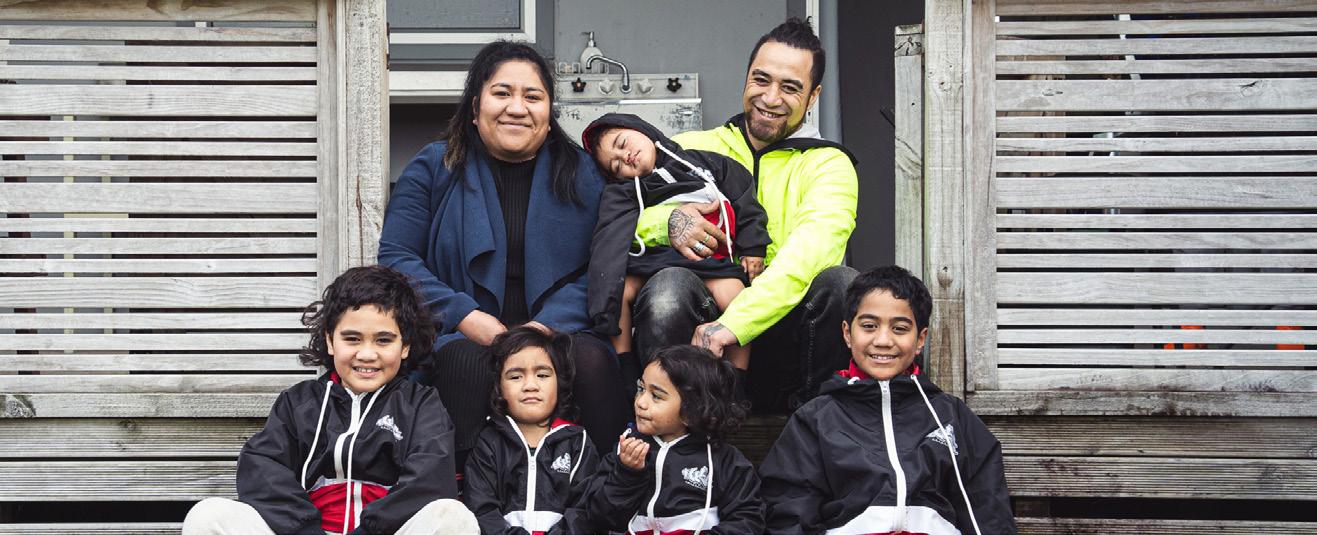
Te Atiawa is resourceful and secure
Te Atiawa uri are enabled and prosper individually and collectively

Te Atiawa is strong and connected.
Te Atiawa uri are empowered to reclaim and revitalise our reo, tikanga, and practices. Our connection to one another is paramount.
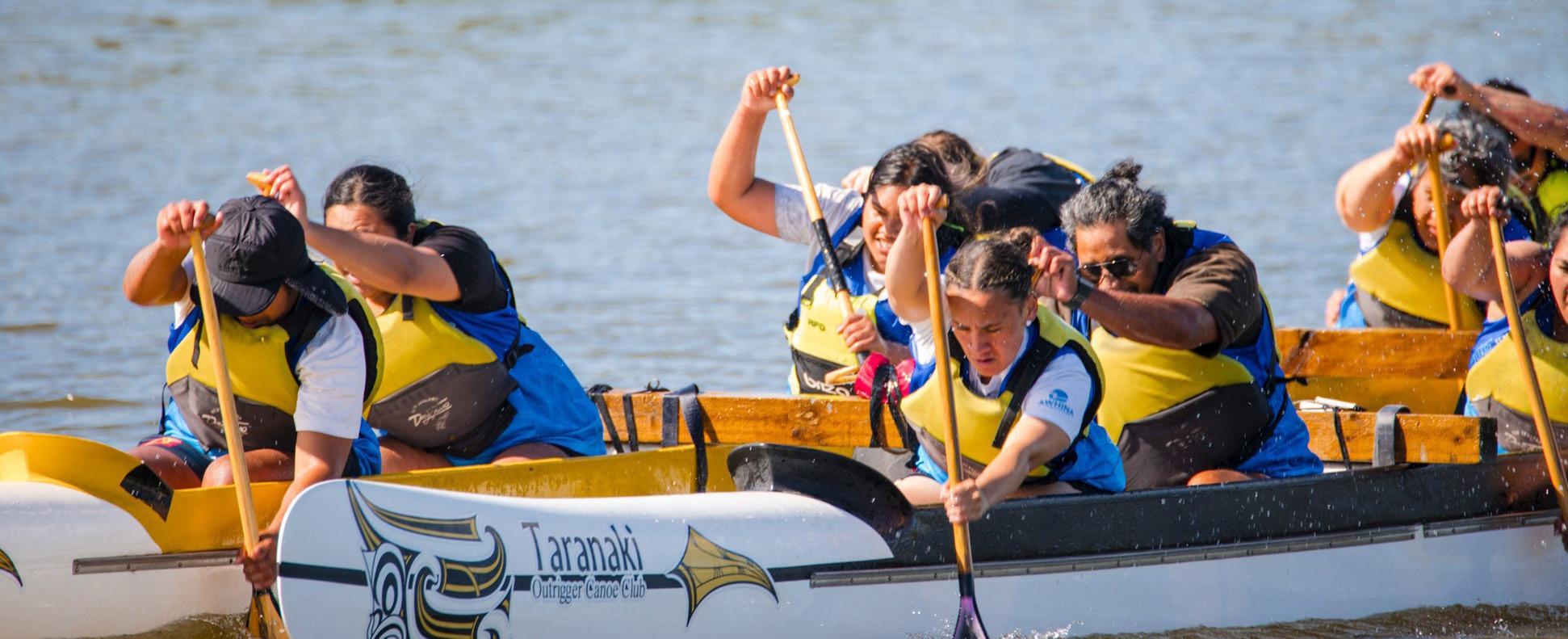
Te Atiawa thrives with the environment.
Te Atiawa uri are thriving and resilient as kaitiaki for our whānau and our taiao.
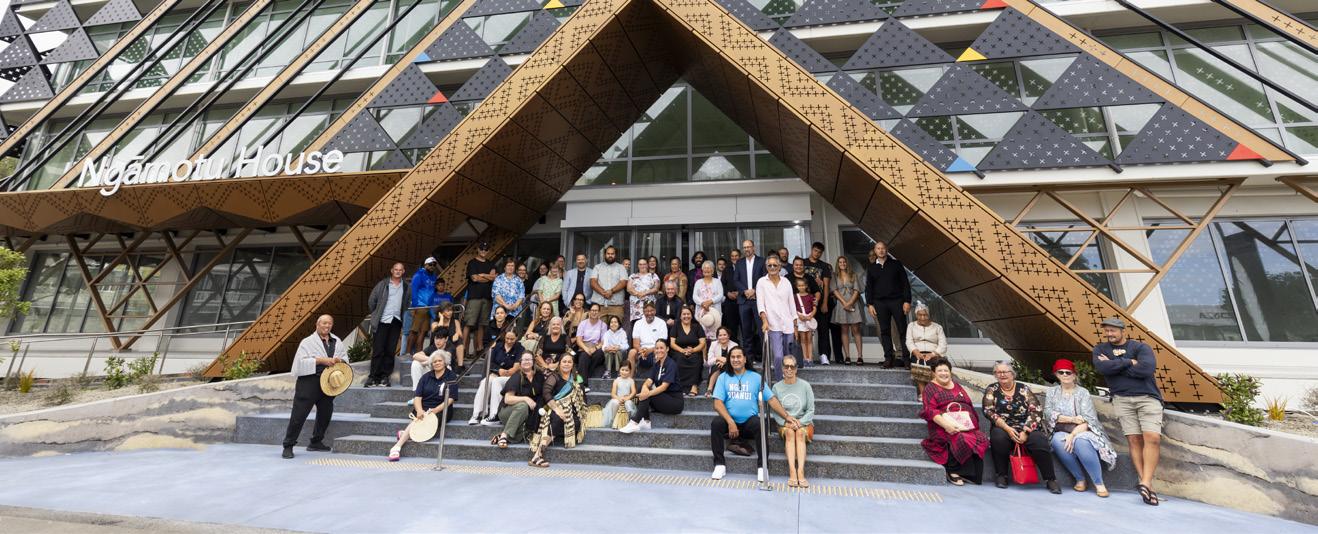
Developing our core infrastructure to deliver to Te Atatū
Communications, Policy Framework, Data and Archives
On behalf of the Board of Te Kotahitanga o Te Atiawa Trust (Te Kotahitanga) we are proud to present this annual report for the period 1 July 2023 to 30 June 2024.
As we reflect on the past year, which represents the 10th anniversary of the establishment of Te Kotahitanga, we celebrate the progress made towards our guiding vision of Te Iho Tū, Te Iho Whenua, Te Iho Tangata – Te Atiawa Secure, Te Atiawa Thriving, Te Atiawa Connected. We celebrate and acknowledge iwi members and whānau who have contributed to the growth of our iwi throughout the year.
Te Atiawa is a vibrant korowai of many independent minds, whānau, marae and hapū communities woven together by the unbreakable threads of whakapapa. Within our multi-faceted iwi, Te Kotahitanga is responsible for nurturing our collective assets gained from our historical Treaty settlement, ensuring they are protected and grow for generations to come. Our mission as an organisation remains clear – to foster unity as a foundation for creating opportunity for Te Atiawa whānau.
The Te Kotahitanga Group includes Te Kotahitanga o Te Atiawa Trust (Te Kotahitanga), our commercial board Te Atiawa Iwi Holdings Limited Partnership (TAIHLP), charitable arm Te Atiawa Iwi Charitable Trust (TAICT), and our fisheries company Te Atiawa (Taranaki) Holdings Limited (TATHL). Te Kotahitanga continues to be funded from
investment returns generated by TAIHLP. The funding is set according to our distribution policy which states that TAIHLP must return 1.5-2% of equity market value of our collective investment portfolio.
During a challenging economic environment, we are pleased to report that our collective asset base has increased from $145m to $149m for the 2024 financial year (FY24). This result is driven by an operating profit of $1.9m and non-cash revaluations of $3.8m. We believe this is a creditable result we are positioned well for future opportunities.
For FY24, TAIHLP provided a distribution of $3m to Te Kotahitanga. Details on our commercial investment activities can be found in the TAIHLP Chair report on pages 10 to 14.
The commercial distribution funds Te Kotahitanga’s governance and operating expenses and provides a charitable distribution to the TAICT. The TAICT funds our hapū distributions, Education Grants and Te Hononga Grants. During the FY24 year $1m was distributed to uri, whānau, hapū and $2m was applied towards our operations and centrally managed projects.
We have reshaped our annual report this year to report our year’s activities and outcomes under our guiding Pou,
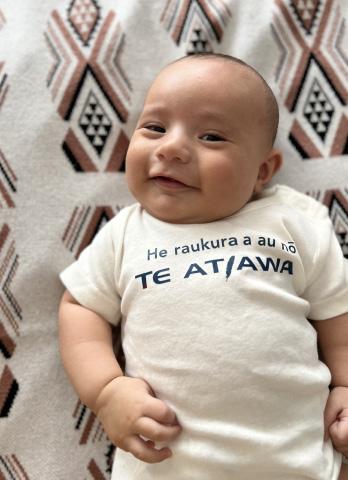
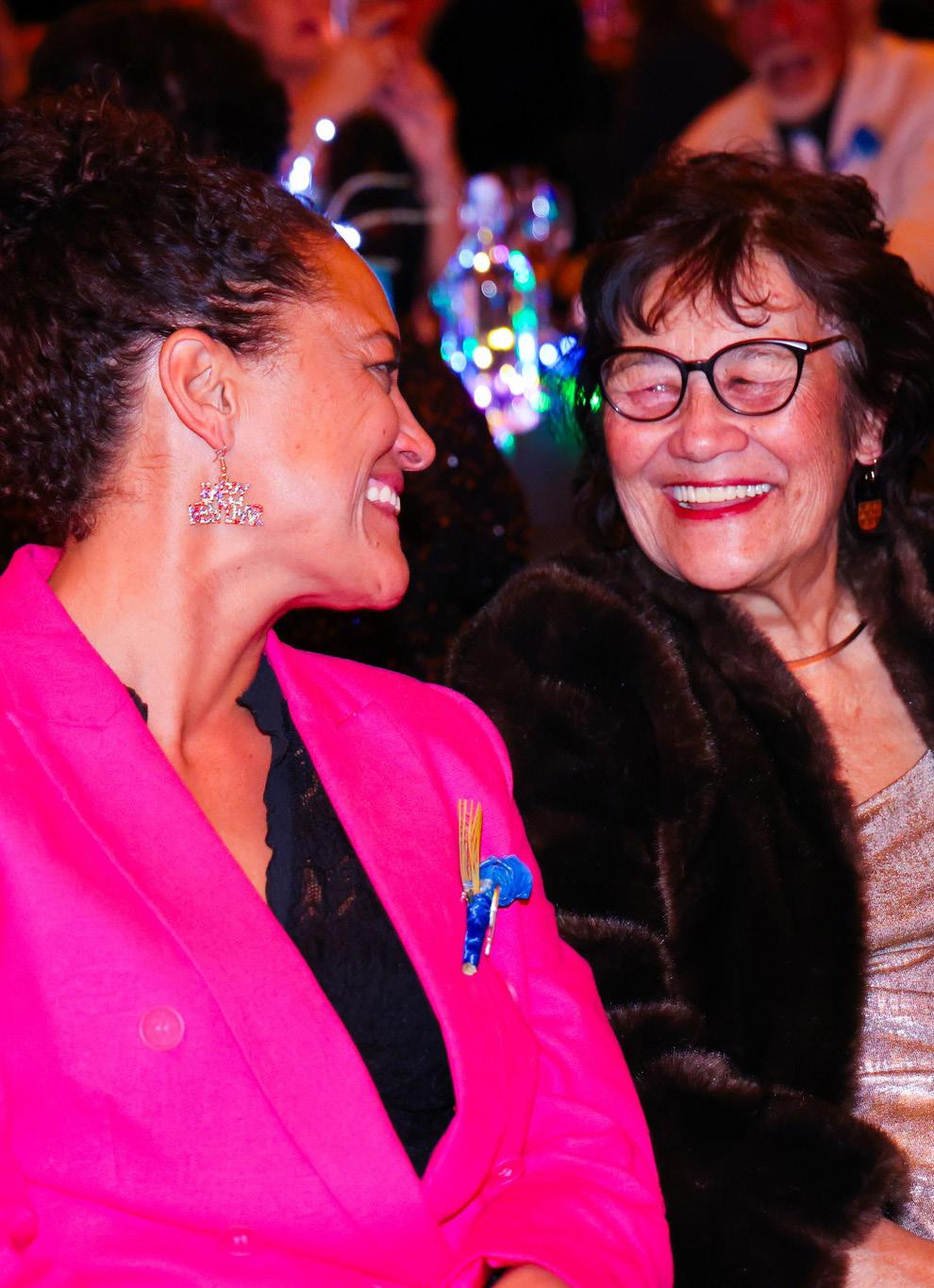
Ngā Pou Tapuwae of Te Iho Tū – Te Atiawa is strong and secure, Te Iho Whenua – Te Atiawa thrives with the environment and Te Iho Tangata – Te Atiawa is strong and connected.
Details on particular kaupapa we have supported this year, can be found in our stories on pages 18 to 39.
Our seven established hapū entities of Ngāti Rāhiri o Te Atiawa Society Incorporated, Manukorihi Hapū Charitable Trust, Pukerangiora Incorporated, Ngā Kaitiaki o Puketapu Hapū Trust, Ngāti Tawhirikura Charitable Trust, Otaraua Hapū Management Committee Incorporated and Ngāti Te Whiti Charitable Trust have received $85,000 each in operational funding to continue their ongoing kaupapa at the hapū level.
Education and Te Hononga
We are pleased to continue supporting secondary and tertiary educational pathways with $174,377 awarded to 215 uri as Education Scholarships and Grants. A full list of our education grant recipients can be found on page 93.
Our Te Hononga Grant programme supports kaupapa which promote connection. The development of Te Atiawatanga has continued, with $89,500 awarded to a range of kaupapa including whānau reunions, sporting group
participation and cultural engagements. Additional information about these activities can be found on page 92.
Once more, we supported our annual Te Riri me te Raukura kaupapa and Pōmare Day celebrations. This included hosting our second Puanga Kaumātua Ball to celebrate our Māori New Year and for our kaumātua to come together in a more social setting.
Engagement with our Ka Uruora programme (financial literacy, whānau saver, housing) by Te Atiawa whānau continues to grow:
• Te Uru Ahupūtea - 189 new whānau (approx.)
• Te Uru Tāhua - 583 whānau are regularly contributing to their personal savings with contributions from Te Kotahitanga.
Significant progress has been made during the year with 21 whānau supported into housing options that include rentals, shared ownership and full ownership.
Our progress in our property area is also encouraging:
• Homes under construction – 10
• Homes in planning & development – 79
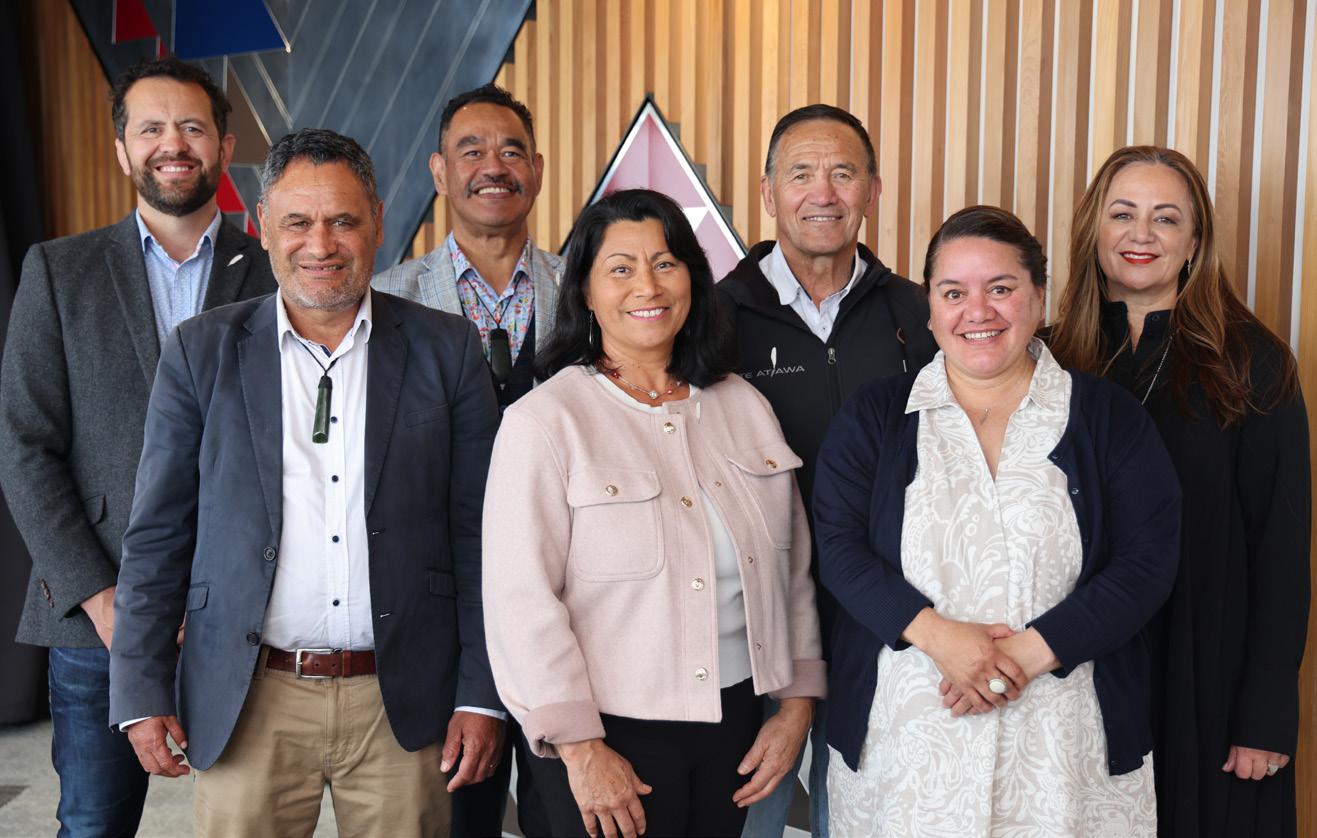
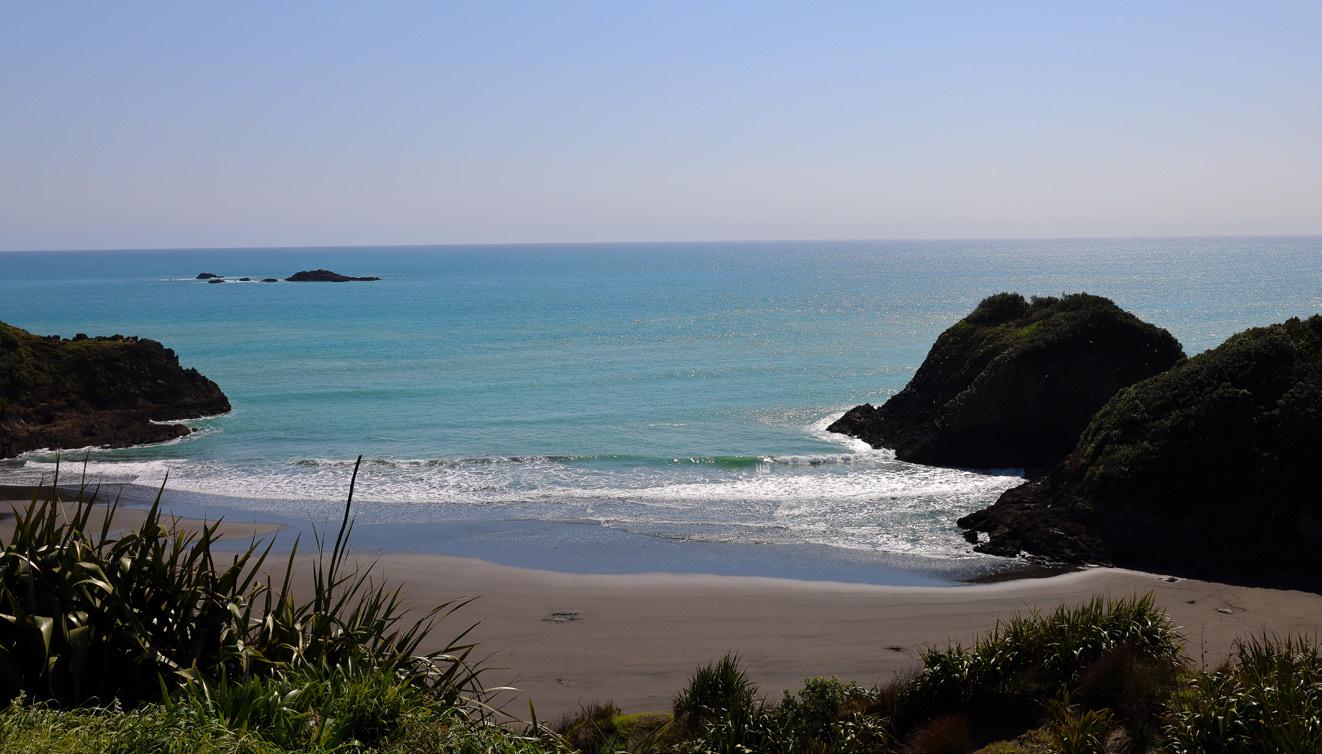
Our property development is overseen and managed by Te Atiawa Iwi Holdings Limited Partnership (TAIHLP). Our procurement process includes minimum expectations for gaining services from Te Atiawa affiliated Māori businesses and all contractors taking part in cultural induction training. This training highlights the importance of any cultural narrative prior to construction beginning at a site. We believe that through this policy we can leverage opportunities that can benefit whānau, beyond our charitable offerings.
In February of 2024, the kaimahi of Te Kotahitanga found a new home in Ngāmotu House. This significant milestone saw the transformation of the former Atkinson Building into a key space where our kōrero and identity within the city is promoted. The management of this project by TAIHLP, is a physical manifestation of what our iwi can achieve when we come together on a project. We look forward to our new building becoming a work hub for whānau, Te Atiawa groups and our wider iwi whānau.
The Tātai Tangata ki te Whenua programme originally developed by Pounamu Skelton for Taranaki iwi was launched for Te Atiawa whānau who wanted to learn about māra
kai and grow their own kai. This successful kaupapa has seen 32 whānau learning about Māori food systems enabling them to take control of growing their own kai.
Te Kotahitanga has continued to take the central technical lead with Ngā Iwi o Taranaki and the Taranaki Regional Council to draft a revised Freshwater Plan for Taranaki. Government changes to the Resource Management framework has presented challenges, but our team continues to strongly advocate for Te Mana o te Wai – respecting the importance of clean water for our wellbeing.
On the 1st of September 2023, Te Atiawa joined with all Taranaki iwi in an historical event of the signing of Te Ruruku Pūtakerongo (Taranaki Maunga Collective Redress Deed). This celebration took place at Owae Marae and brought together hundreds of Te Atiawa whānau who voted with an overwhelming 98% in support of accepting the redress arrangements.
Working alonside Puketapu hapū, significant progress has been made with the design work for the redevelopment of this site.
This is an opportunity to develop a new centre that tells the story of Taranaki maunga more appropriately. The site falls within the Treaty settlement areas of interests for Te Atiawa and Taranaki iwi. Discussions with our whānau are ongoing.
During the year Te Kotahitanga welcomed Emma Park (Te Atiawa/Ngāti Rarua) as independent observer of our Audit and Risk Committee and Lewis England (Te Atiawa/ Taranaki) as our inaugural Associate Director on TAIHLP to provide opportunities for uri to gain governance experience within the Te Kotahitanga group. These positions have been developed to provide succession pathways and opportunities for whānau looking to learn more and participate in our governance systems.
Our focus on succession planning also saw our pilot internship programme - Te Rauhī Hiringa run from November 2023 to January 2024. As part of this we welcomed Aisha Campbell, Ethan Matuku, Tere Porter-Rawiri, Shianne Klenner, Naomi Butler and Lucas Larraman into a variety of workstreams and their youthful energy and commitment was a valuable addition to our Te Kotahitanga whānau.
Our kaimahi whānau went through some change with Ella Lyon and Tui McDonald departing from our communications and
engagement team. We wish Ella and Tui all the best in their future career aspirations. We also welcomed Nikki Walden to our leadership team as the Pou Iho Tangata with responsibility for our community development portfolio.
The year ahead promises to present new challenges in the form of a challenging economic environment and new Government policies and approaches which could fundamentally reshape the current nature of Te Atiawa-Crown relations. We will remain alert to these changes to ensure our hard fought rights are not interfered with.
The year ahead also promises positive opportunities not the least of which will be Te Matatini o Te Kāhui Maunga to be held at the Bowl of Brooklands in New Plymouth from 25 February to 1 March 2025. This nationally significant kaupapa is expected to bring over 50,000 people to our rohe and will be a major focus of all Iwi of Taranaki at the beginning of the 2025 calendar year.
We look forward to many of our whānau returning home to celebrate this occasion and make this event a success.
In conclusion, on behalf of the Board and kaimahi of Te Kotahitanga we would like to thank our Te Atiawa whānau for the support over the past year.
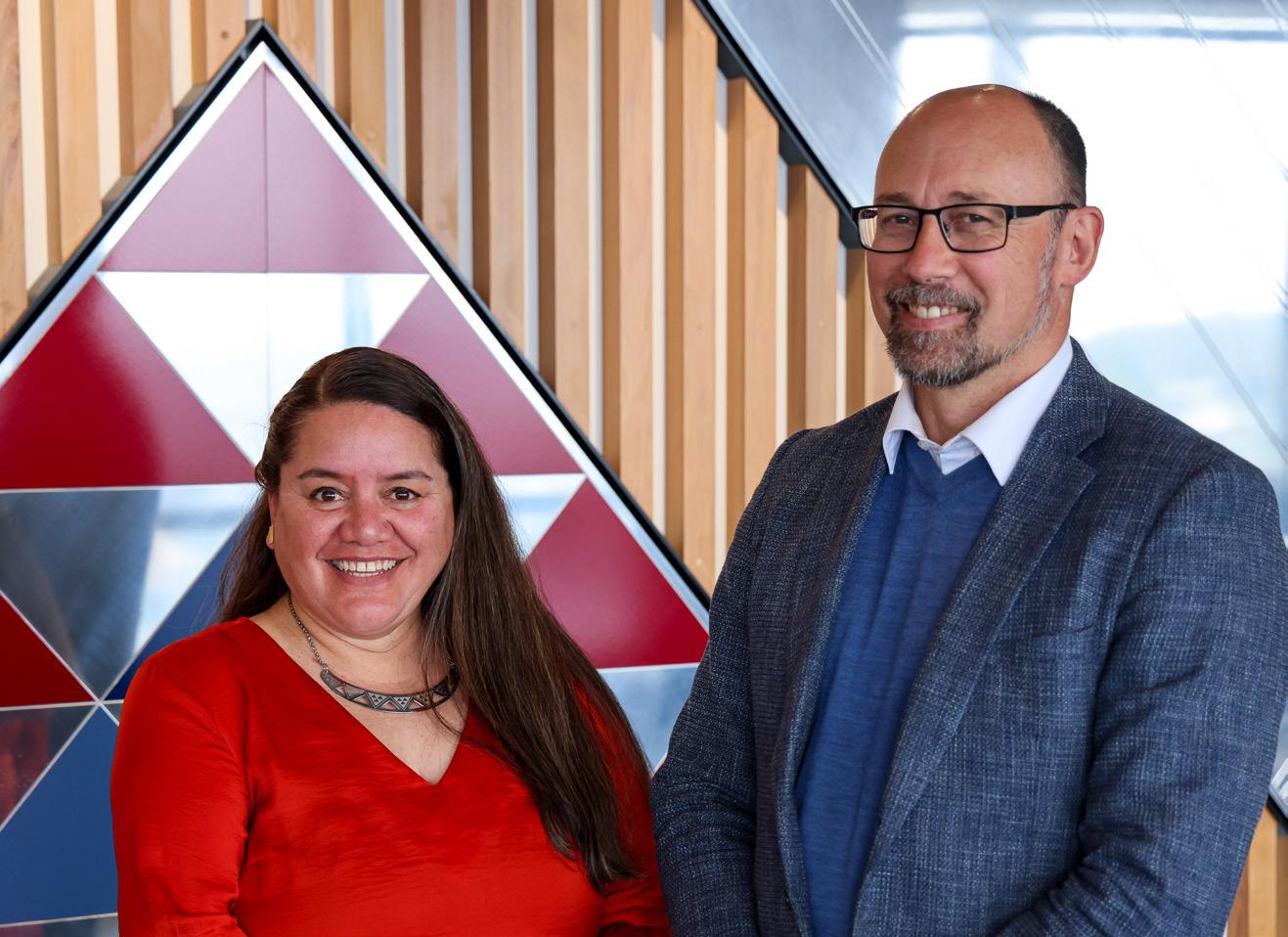
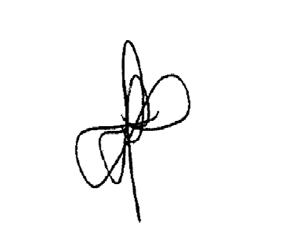
Liana Poutu (Pouwhakarae)
Te Kotahitanga o Te Atiawa

Dion Tuuta (Pouwhakahaere)
Te Kotahitanga o Te Atiawa

Te Atiawa Iwi Holdings Limited Partnership (TAIHLP) is pleased to present our performance for the year ended 30 June 2024.
At a group financial level TAIHLP delivered: An operating profit of $3.2m which was approximately $0.2m ahead of FY23 performance, key drivers being:
• Direct investment income ended $225k below FY23 levels, with the negative performance largely due to Ngāmotu Hotel (impacted by a weak market) and Puainuku Pastures (affected by lower milk prices and increased interest costs).
• Property development and lease income for the year is $1m higher than FY23, mainly due to the completion and sale of the renovated properties in New Plymouth and Inglewood and the completion of Ngāmotu House which has resulted in an increase in lease income for the year.
• Interest income is lower than last year given smaller amount on deposit as property developments and other investments have been progressed.
• Income from managed funds return of $1.2m which is slightly higher than income in FY23.
The total profit of $7.1m is $2.5m behind last year noting 2023 included a large revaluation gain from De Havilland:
• Investment property valuation increase of $2.4m following Ngāmotu House completion, and an uplift in the valuation
of the old Education House site.
• An increase in the value of managed funds of $927k during the year as equity markets continued to improve.
• An increase of $452k in direct investments Puainuku, Tai Hekenga, and Te Pūia Tāpapa.
• An increase in TAIHLP asset base from $121.8m to $125.7m, which is a $3.9m increase over the period.
• A total Dividend of $3m was paid to Te Kotahitanga o Te Atiawa Trust.
Our vision remains focused on being an outstanding investment company for Te Atiawa where uri are empowered to reclaim and revitalise our reo, tikanga and practices. As an iwi-owned investment vehicle, we are blessed with unique endowments including, a longterm investment horizon, strong relationships with other iwi, and valuable preferential Treaty settlement rights.
Our goal is to leverage these advantages to build an investment portfolio that balances growth with sustainable income for our people. Our strategy focuses on creating a diverse range of high-quality direct investments which allows us to:
$3.2m $125.7m $7.1m
• Maintain equilibrium between asset growth and iwi funding needs.
• Pursue best in class returns through long term holdings.
• Capitalise on exclusive opportunities stemming from our unique position as an iwi investment vehicle.
As intergenerational investors, we acknowledge that we are only at the beginning of our journey and can be patient in seeking out the right opportunities. We prioritise investments that align with our values and endowments, combining strong underlying assets with capable management, appropriate scale, and preferential access to generate robust riskadjusted returns that support our strategic vision and benefit Te Atiawa for generations to come.
During the year in review, establishment director Mike Pohio retired from the board after eight years of service. Mike’s deep knowledge and experience across a broad range of investment areas was key to helping establish our long-term investment strategy and setting our platform for long-term development. His specialist knowledge of property investment and development has been invaluable in positioning TAIHLP as a significant commercial property developer/ owner within North Taranaki. We thank Mike for his significant contribution to our kaupapa and wish him well in his future endeavours.
Following an extensive search process TAIHLP
welcomed Rachel Winder and Tristram Van Der Meijden to the board alongside myself, Adrian Taylor, Kim Skelton and Liana Poutu. Both Rachel and Tristram bring valuable investment experience with particular property expertise. We look forward to their contributions to our investment journey.
Our balanced portfolio is grouped into three broad categories of Direct Investment, Property and Financial Assets.
Direct investments comprise have been undertaken in a wide range of sectors that offer portfolio diversification, sustainable cash flow and growth. Direct investments consist of the following:
• Tai Hekenga : Comprising a diverse portfolio of Crown leasebacks in Wellington, it offers low-risk, stable cash flows, even during periods of economic uncertainty. There is potential for significant growth in the coming years as 5 and 7 year rent review cycles are completed. In FY24, TAIHLP delivered a 4.1% cash return, a since inception cash return of 8.0% ,and total return of 21.3%.
• Ngāmotu Novotel: Performance remains challenging, with reduced demand and steadily increasing operating costs. Leisure travel has yet to return to pre-COVID levels, leading to lower-than-expected occupancy and revenue. Since the initial investment in 2019, an annualised 2.8% cash return has been delivered.
• Pūainuku Pastures: Operating returns were lower due to a reduced milk price and higher interest costs. The FY25 outlook is positive with increasing milk price and decreasing interest costs. The total return for FY24 was 3.3% and the total return since inception has been 11.8%.
• Pūia Tangaroa: FY24 operating return was impacted by higher interest rates, despite strong market performance. The cash return in FY24 was lower at 0.9% compared to 2.2% for the previous year, reflecting a timing issue as profit sharing was delayed until July due to the distribution lag in the first year of investment.
• Pūainuku Vines : Pūainuku investment is a lease arrangement with annual rate adjustment and hard ratchet in place for 3 or 5 yearly market reviews. It is therefore somewhat isolated from wine industry volatility. Since initial investment a cash return of 7.1% has been achieved, and a total return 21.9%.
• Te Pūia Tāpapa: Still early days in terms of performance, as the fund is a long-term play with a generational horizon of 15-20 years.
Since the initial investment, an estimated cash return of 2.1% has been achieved.
Property development saw a significant amount of activity during the year with steady progress in both residential and commercial developments as well as progress in negotiations on key deferred selection properties.
To date 12 homes have been refurbished and sold to whānau including 10 shared equity homes via Ka Uruora. Another 10 homes are currently under construction with a further 79 homes planned. Additionally, as part of our development projects, we implement the group procurement policy which sets minimum expectations on allocation of development spend to Te Atiawa-affiliated service providers and businesses.
Residential Property Highlights
• 5 refurbished properties delivered as shared equity homes to whānau.
• Pirikōhatu (113 Omata Road, New Plymouth) – two three-bedroom homes under construction for delivery to whānau as shared equity in November 2024.
• Pukekura - the Parade (Liardet St New Plymouth) – Approval to proceed with construction of 36 high quality central New Plymouth townhouses. Construction expected to begin October 2024.
10 homes currently under construction
79 Homes Planned
12 Homes have been refurbished and sold
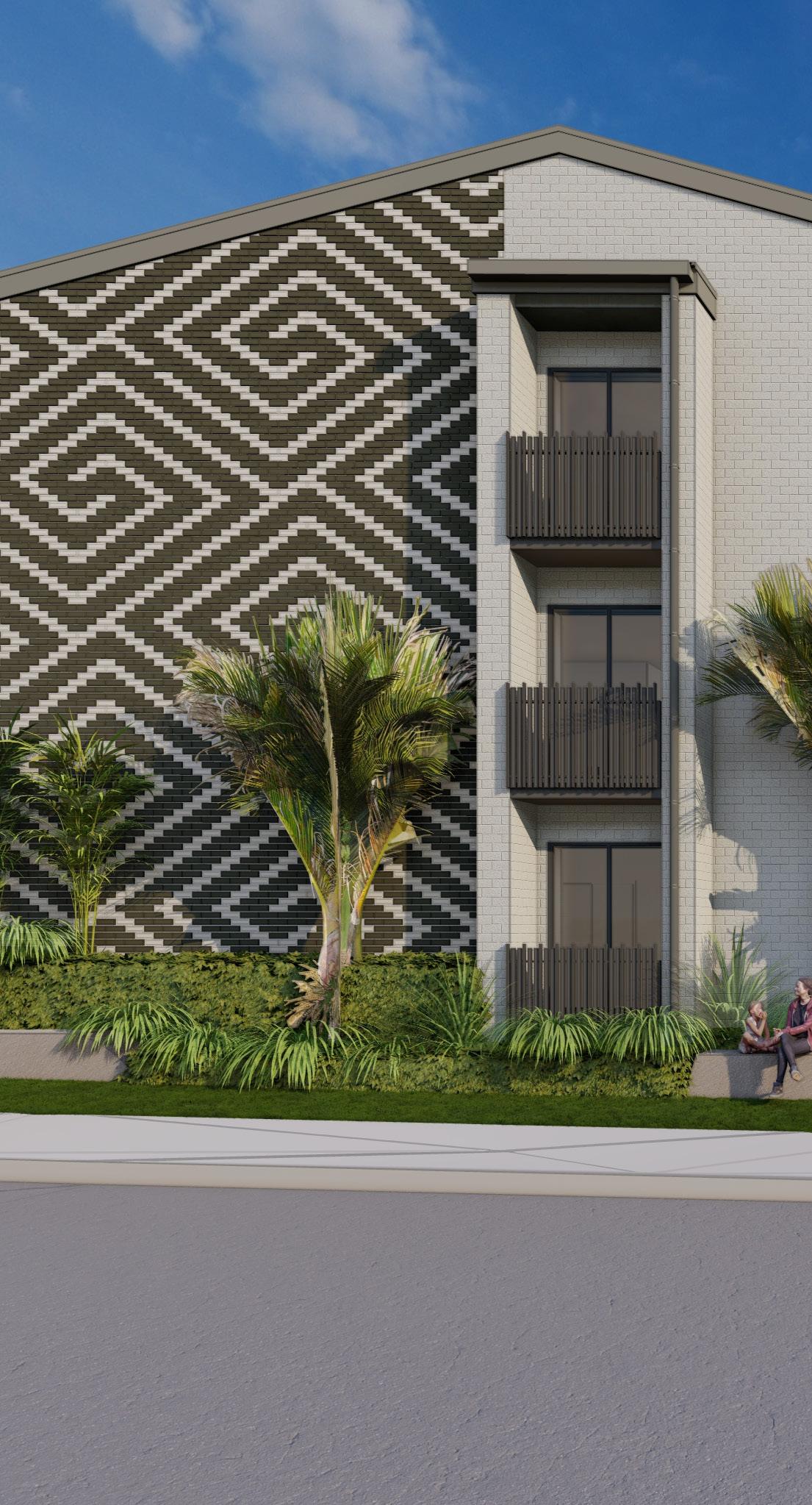
• Papapounamu (51 Barrett St, New Plymouth) – eight build to rent townhouses development approved and construction commenced with completion expected April 2025.
• Tūkāpō (186/186A Tukapa St, New Plymouth) - Resource Consent granted for 20 medium density townhouse development in March 2024. Procurement negotiations underway.
• Ngā Rau Matatiki (29 David St, New Plymouth – five kaumatua units targeted at meeting low income kaumatua housing needs approved for construction.
• Rungapiko (26 Weymouth St, New Plymouth) – pre-construction detailed design work underway for a three-story 18 apartment complex in anticipation of business case for Board approval.
• Ngāmotu House (Devon St West New Plymouth) build programme completed within budget and formal opening in February 2024 with Te Kotahitanga o Te Atiawa assuming occupation of level 5.
• De Havilland (Devon Road, Bell Block, New Plymouth) – Archaeological site assessment with Puketapu hapū identified Ikamoana Pā site for protection. Development Management services being sought to review Master planning options.
A number of DSP properties remain under the Te Atiawa Treaty settlement agreement with key effort focused on two strategic opportunities: Ōkoare (307 Tukapa St, New Plymouth) – Due diligence and valuation process subject to discussions on possible land contamination.
Ōtumaikūkū (former Barrett St site, New Plymouth) – LINZ has completed remediation work on this site. Discussions focusing on former Nurses Hostel site contamination and heritage status.
Income Funds: FY24 income funds total returns ranging between 5.1% – 5.3%. Since inception returns have ranged between 3.7% – 3.9%. Growth Funds: Off the back of global equities the growth funds have performed well with a total FY24 return of 9.2%, noting performance was weighed down by NZ holdings. Since inception an 8.3% return has been delivered.
Te Atiawa (Taranaki) Holdings Limited (TATHL) is not involved in any operating fisheries businesses but continues to lease settlement quota and receive dividends from shares in Moana New Zealand and a profit share from Port Nicholson Fisheries LP. Group contribution from fisheries was lower than prior year due to a reduced dividend from Moana New Zealand.
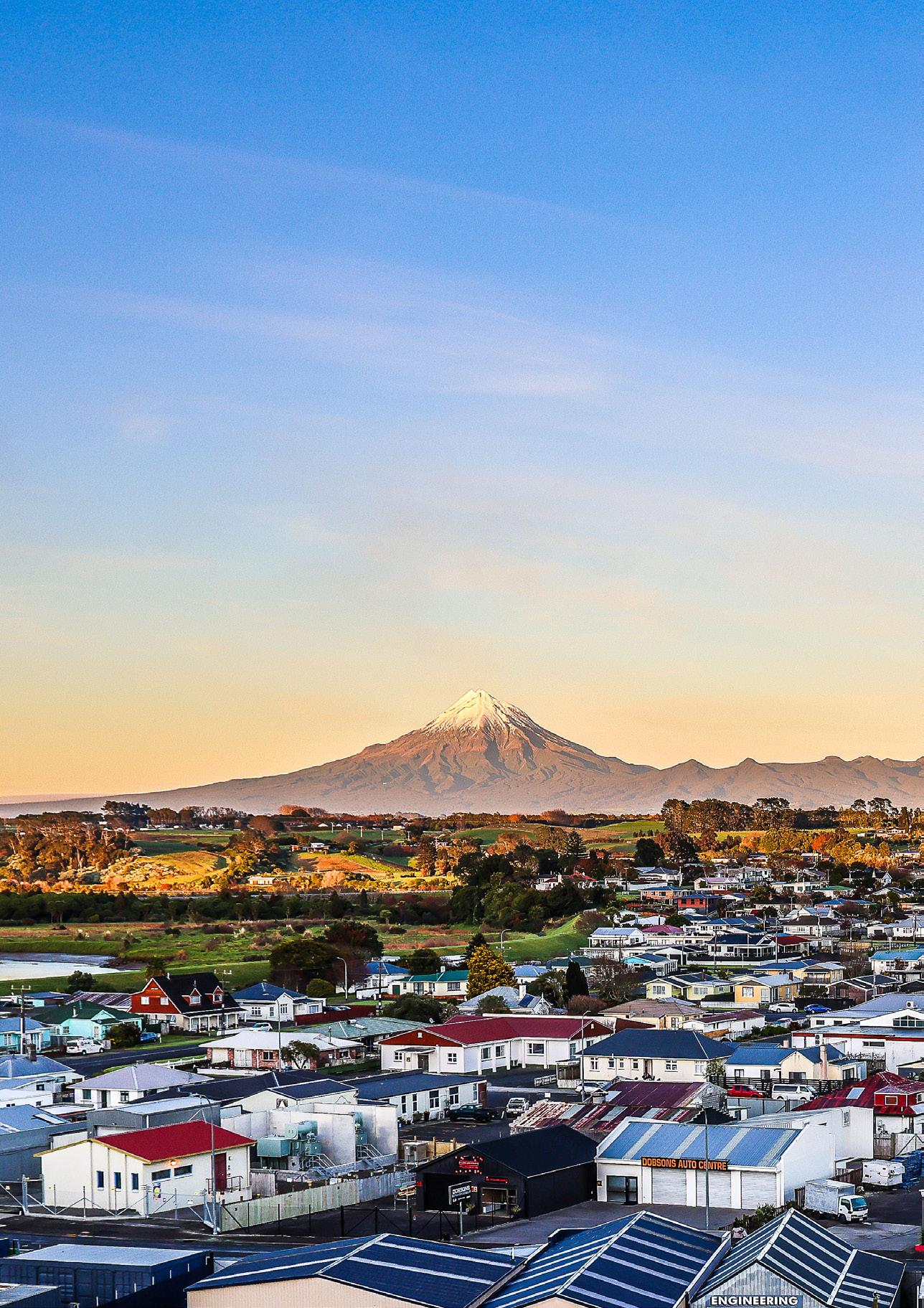
Our operating model remains focused on efficient high-quality management with a blend of external and inhouse services. During the year, a number of administrative and project management services were transferred from outsourced contract providers to the Te Kotahitanga o Te Atiawa office as part of our group journey to growing internal capacity. Cost management and efficiency remains a key focus for the Board.
Following a difficult economic environment in 2024, the FY25 outlook remains uncertain. However, we remain committed to our strategy and will continue to develop our property pipeline and implement the direct investment strategy. We have no doubt our portfolio will continue to evolve in a disciplined, patient, and sustainable manner consistent with our vision and values.
On behalf of the directors, I would like to thank Te Kotahitanga Trustees and, through them, the wider iwi for their ongoing support of us and our strategy. Thank you to Dion Tuuta for his services as CEO of Holdings LP and Te Kotahitanga. Thank you also to Ellen Seebeck and VanBurWray Chartered Accountants Ltd for the invaluable day-to-day and week-to-week provision of timely and efficient accounting information.
Lastly, thank you to my fellow directors for their efforts in working through another financial year. I am grateful for their wisdom and support, and I know we all look forward to progressing our strategy over the year ahead.
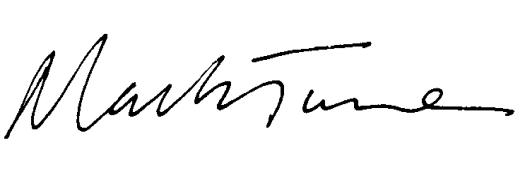
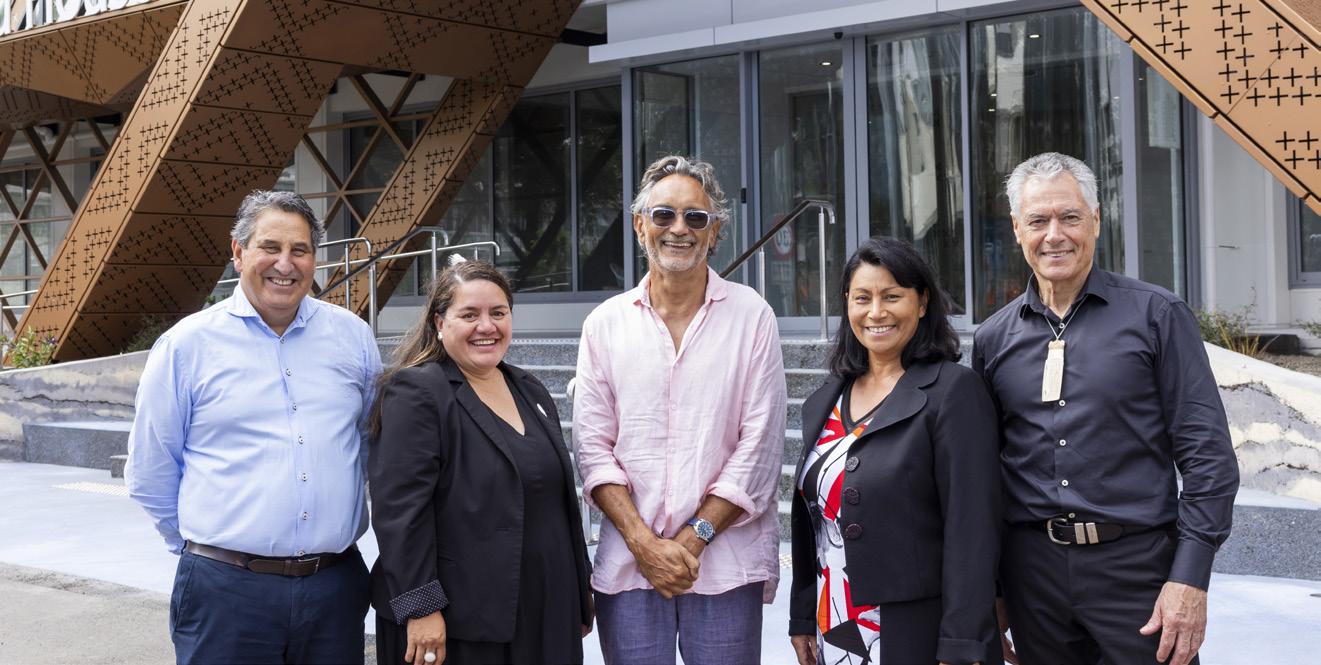
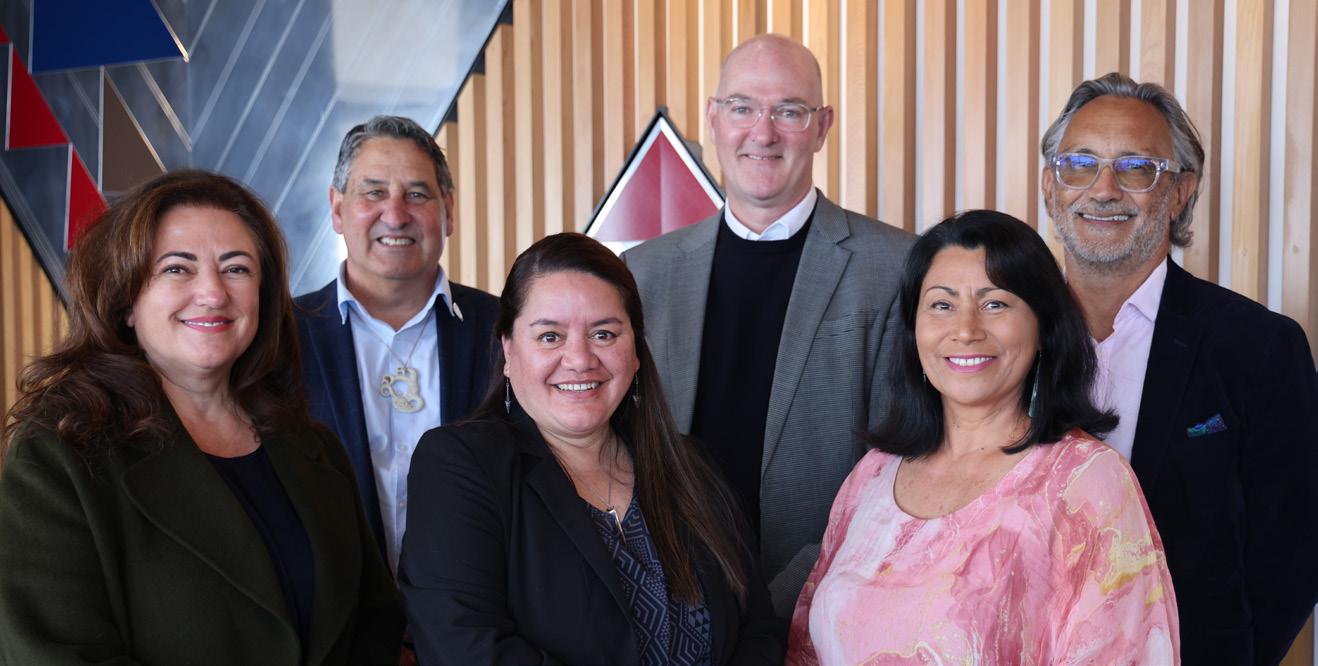
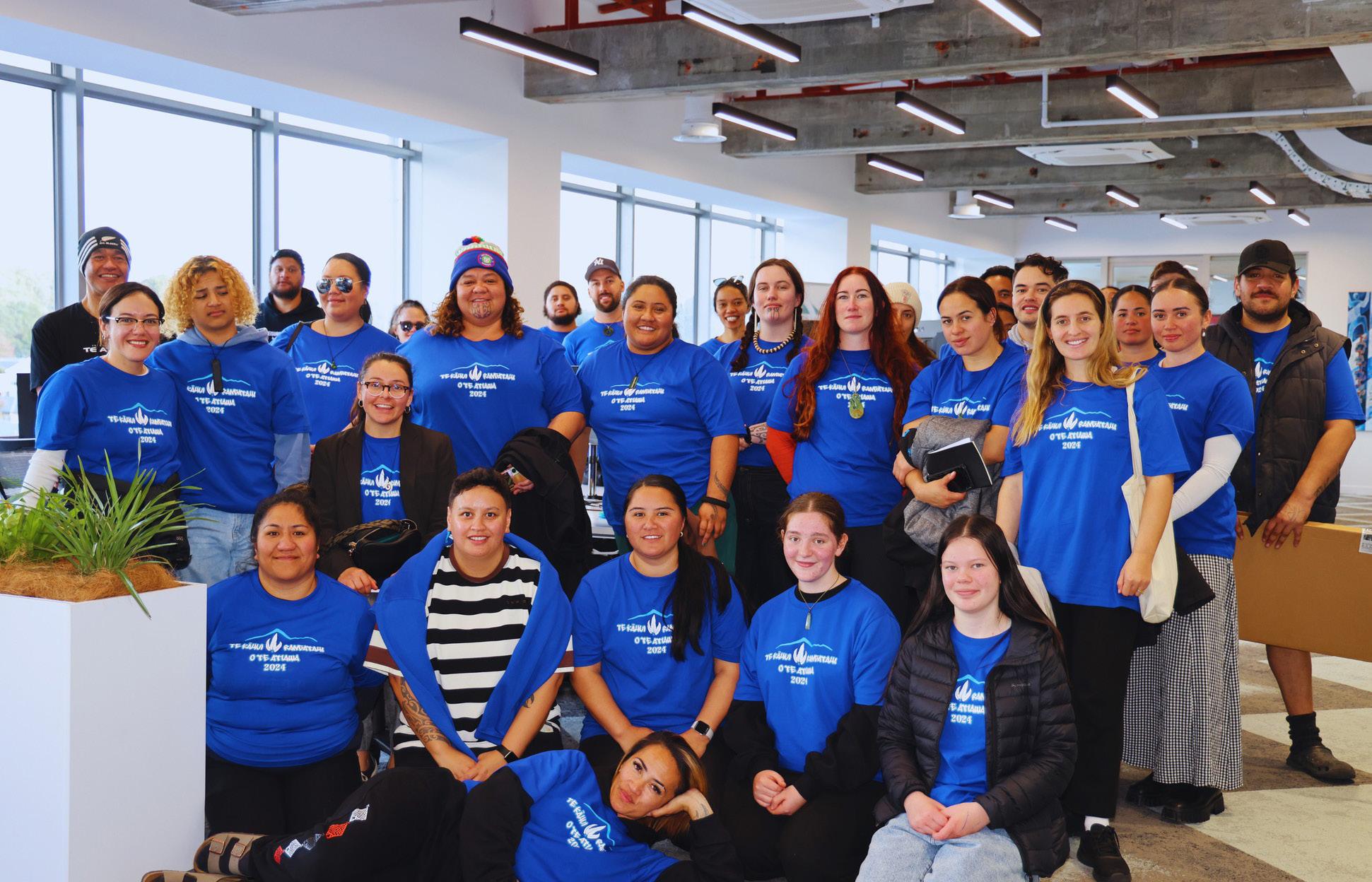
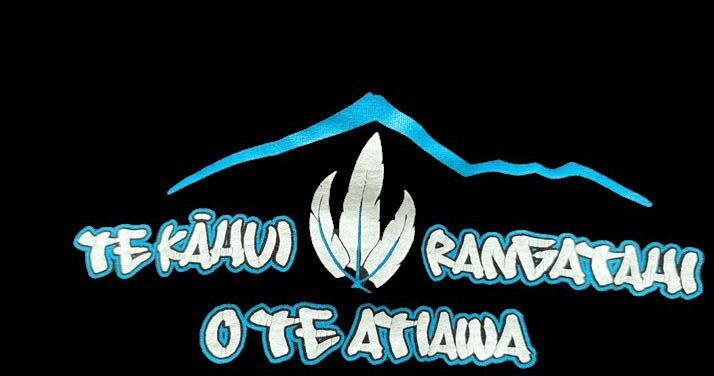
Our strategy, Te Atatū, sets out a 30-year aspiration for Te Atiawa. To realise this aspiration, we are investing our resources in areas that will provide for long-term impact. We are investing in our future through our people, our programmes, and our collective infrastructure.
During the year we distributed an additional $1.02 million from Te Atiawa Iwi Charitable Trust to uri, whānau, and hapū. This brings our total distributions since settlement to $7.7 million.
Overall, we recorded strong progress against our organisational metrics during the year. Our housing programe – Te Urunga Kāinga, continues to develop, with a further 10 whānau supported into housing through this programme and in partnership with Ka Uruora. Our procurement policy is delivering benefits to Te Atiawa and Māori owned businesses, with 17% of the total group spend being directed towards Te Atiawa and Māori owned businesses. We continue to work with He Toronga Pākihi ki Taranaki to identify opportunities to procure work from Māori businesses and grow the Māori economy here in Taranaki.
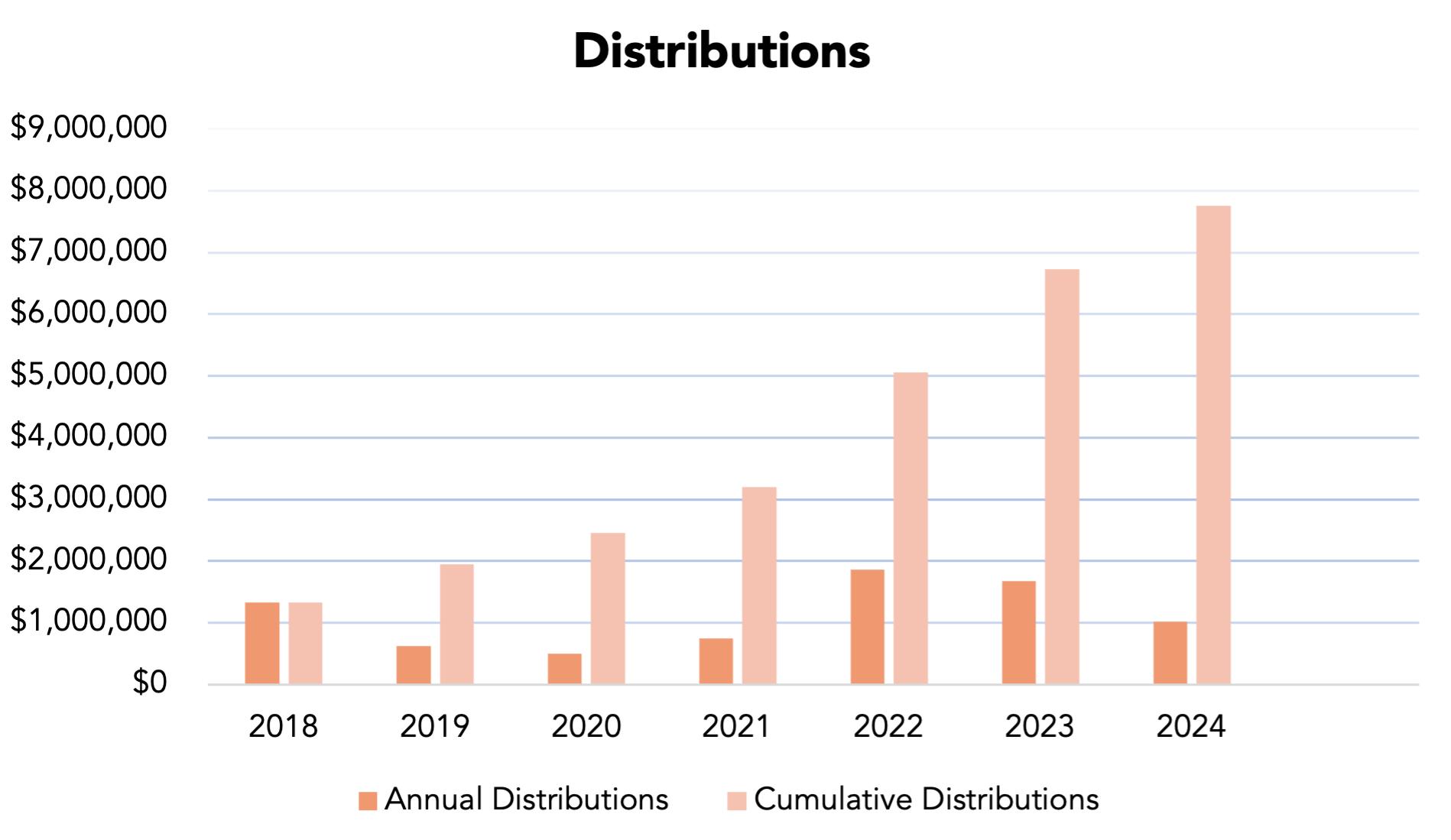
$7.7m
Group Spend on Māori Owned Businesses distributions since settlement
17%
Economic conditions throughout 2024 have been challenging and the financial performance of Te Kotahitanga has been robust during this period. An Operating Profit of $1.95 million is a strong outcome for the year. Property revaluations have resulted in an overall Group Profit of $4.4 million.
FY24 (000’s) FY23 (000’s)
Total Revenue $5,541 $5,975
Total Expenses ($3,595) ($3,592)
Net Operating Profit $1,946 $2,383
Other Income $3,702 $6,674
Income Tax Expenses ($262) ($664)
Distributions & Grants ($1,021) ($1,676)
Total Comprehensive Revenue and Expenses $4,366 $6,718
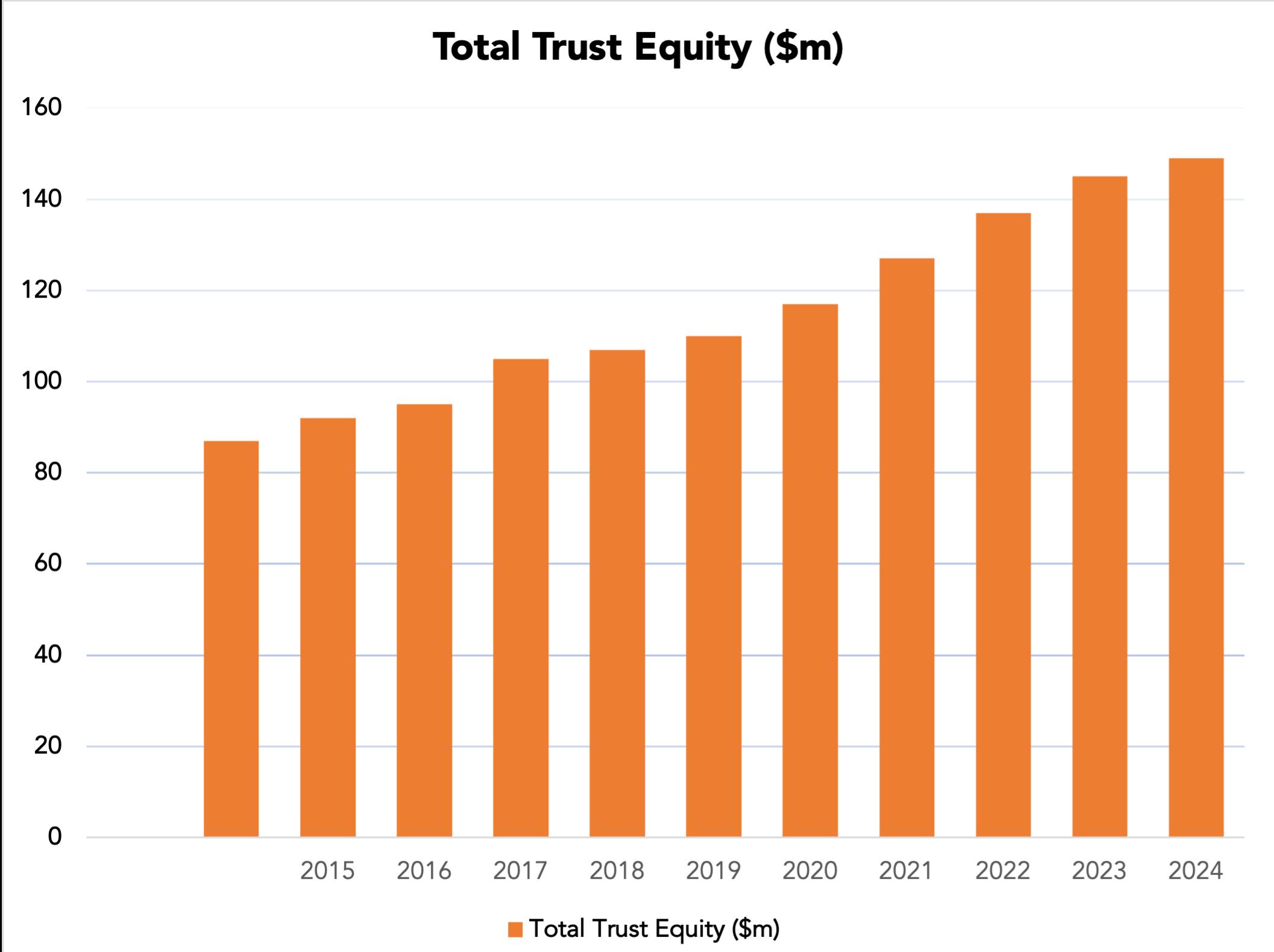
This has resulted in an increase in the Total Trust Capital from $145 million in 2023 to $149 million in 2024.
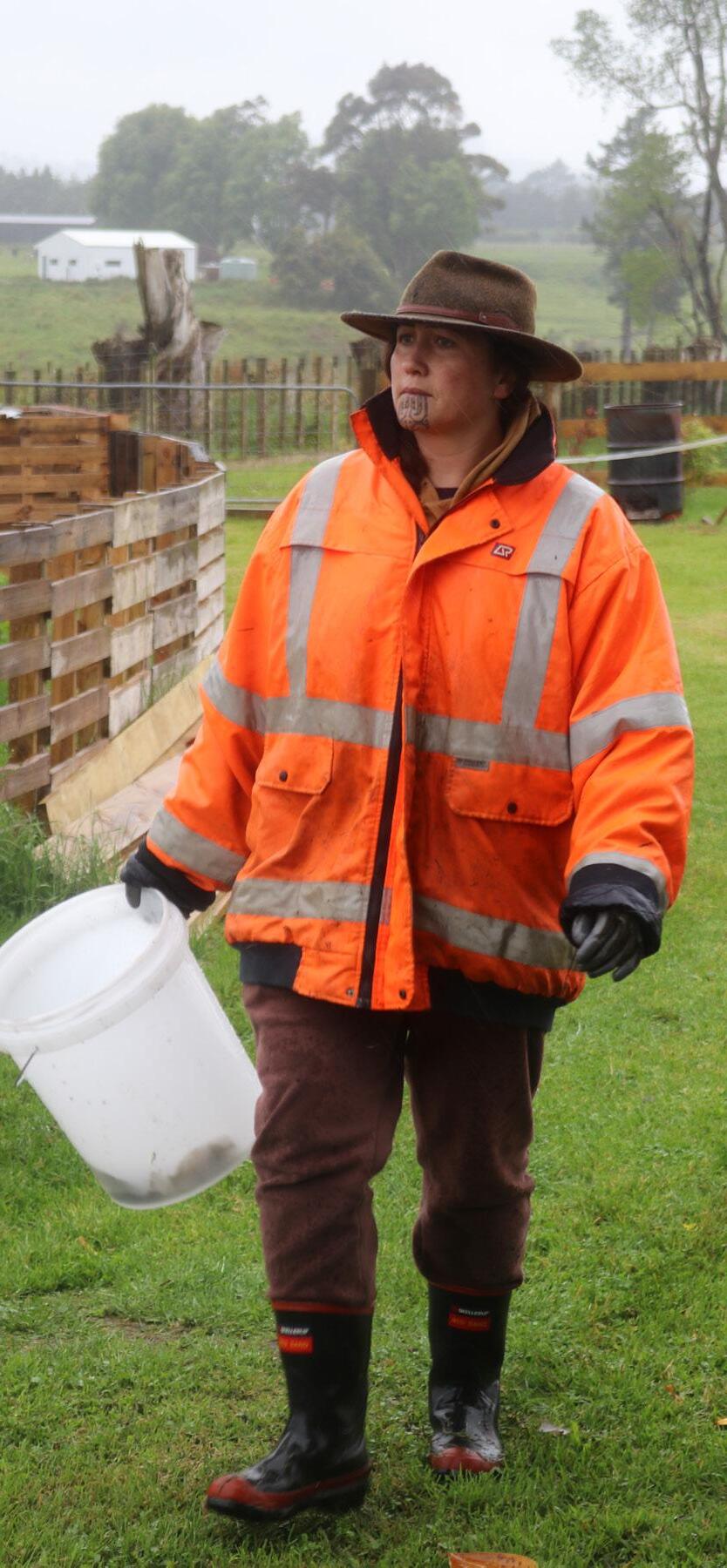
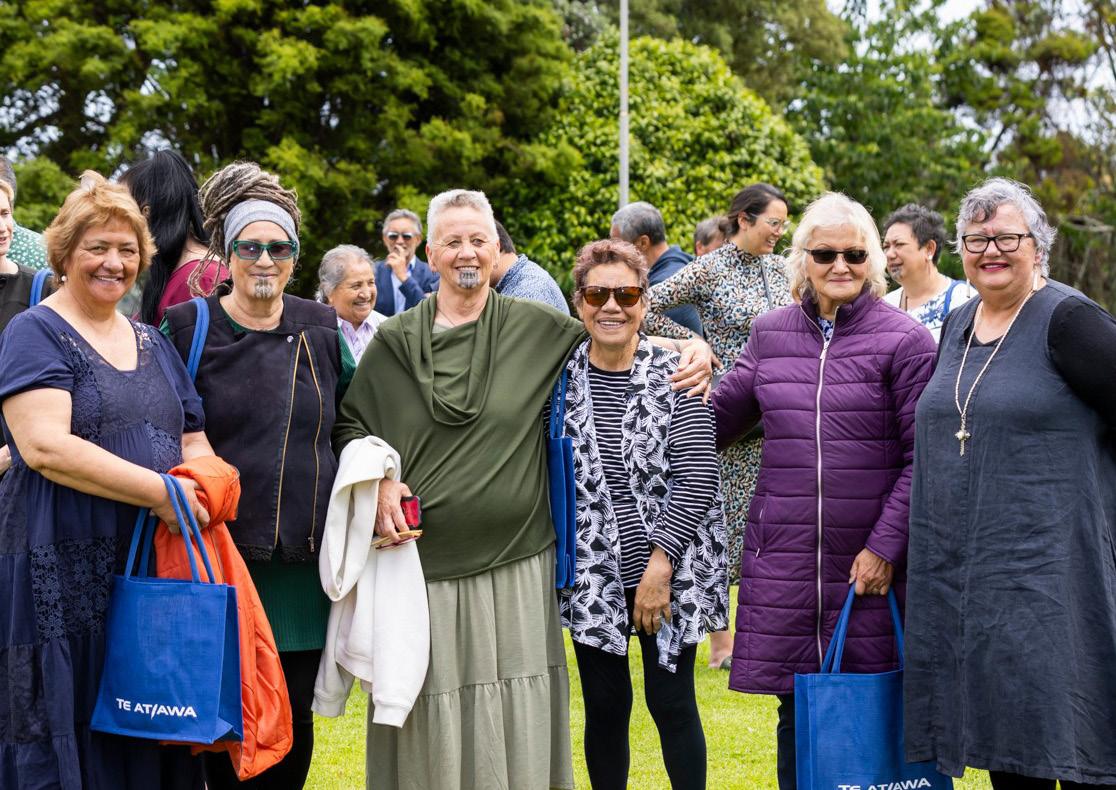
Te Iho Tangata focuses on kaupapa which celebrates our whānau coming together to strengthen connections and grow our Te Atiawatanga.
Tukua kia tū takitahi ngā whetū o te rangi - “Let each star in the sky shine in its own light”
In the midst of Te Tau Hou Māori, Te Kotahitanga o Te Atiawa were delighted to host the Te Atiawa Puanga Kaumātua ball. This special night held in July was a celebration of our pāhake alongside the arrival of the new year and was complete with waiata, kai and boundless aroha that warmed a chilly winter’s evening.
The celebrations started in the salon hours before ngā whetū lit up the sky. A team of beauticians and kaitiaki provided our kaumatua with treatments including mirimiri, hair, nails, make-up, lashes and kākahu fittings. This was accompanied by sweet treats and hot drinks; preliminary nibbles in preparation for the threecourse meal ahead!
With Puanga shining brightly up above and our pampered kaumatua ready to dance the night away, the evening that followed was one to remember.
Our chosen venue, the Waitara War Memorial Hall, was adorned with fairy lights with hints of gold, and tables set for fine dining. The evening started with a photo montage, allowing time to remember our loved ones lost in the past year. While many tears were shed remembering the amazing people who have passed before us, it was time to celebrate the new year ahead.
In the heart of the hall, music beamed from the stage where performances from The Ambience Band, Raymond Tuuta, Jacqui Waru and Thoze Guys took place. The diverse and vibrant journey of sound radiated on the dance floor with our kaumātua showcasing their dance moves between reconnecting with whānaunga and savouring their delightful meal. Joy teemed from our kaumātua whose smiles shimmered just as bright as Puanga.
The kaumātua ball was a success that transpired from the support of many people. We thank everyone who was involved in bringing the ball together and to our kaumātua who joined us to share in this special night celebrating them.
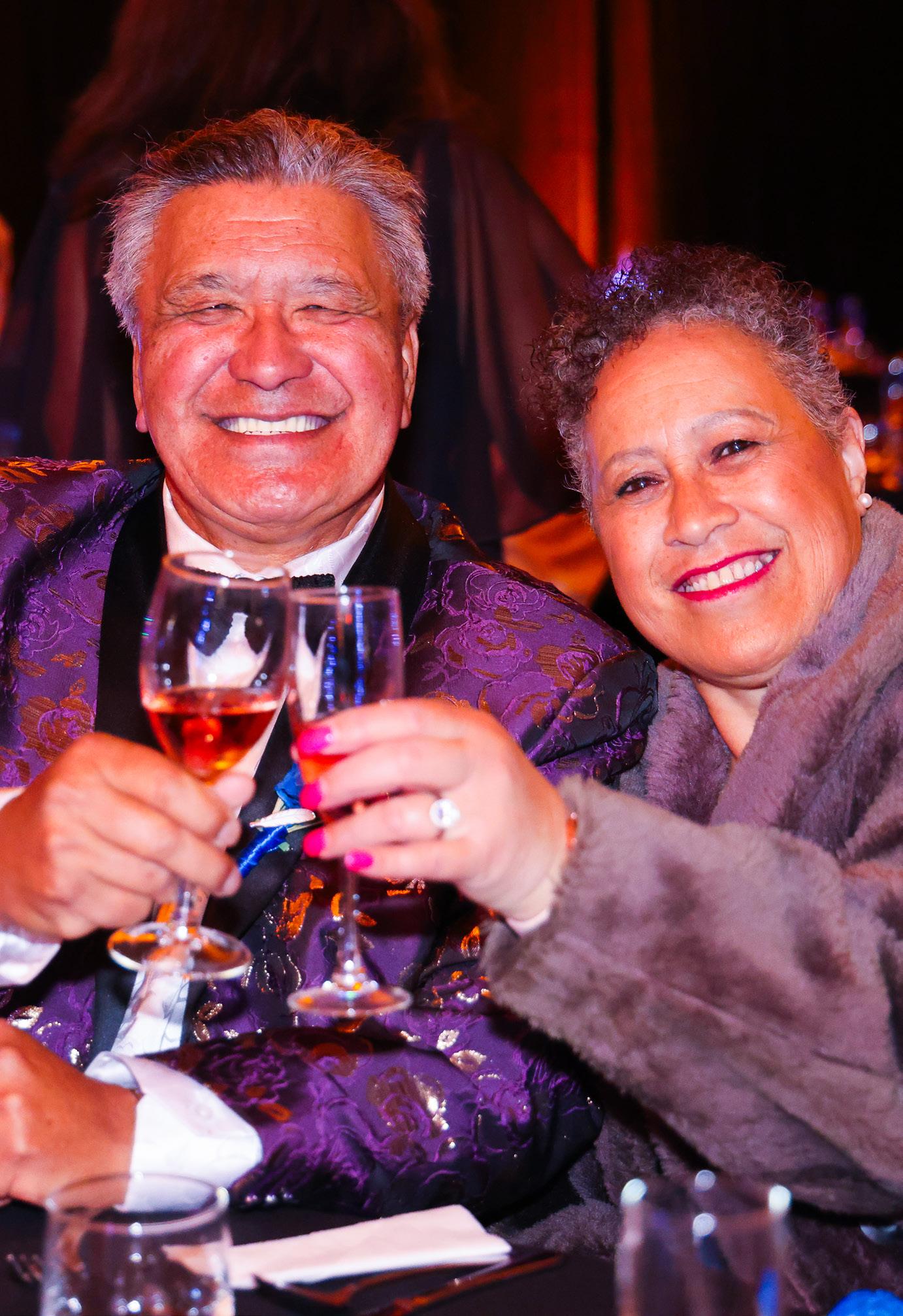
Te Hononga Grants are an annual distribution from the Te Atiawa Iwi Charitable Trust. They support initiatives that strengthen the capacity, capability, and connections of Te Atiawa Iwi and its members. . For a full list of Te Hononga Grant recipients, please see page 92.
As dawn breaks on the 6th of February every year, our people rise with a commitment to commemorate Te Tiriti o Waitangi.
This year our people of Te Atiawa upheld this commitment at Otupaiia Marine Reserve – where the fifth Waitangi ki Whaitara event was held, and most certainly relished.
Waitangi ki Whaitara is an event led by He Rau Oranga Trust that commemorates our history and celebrates our identity. The event boasts entertainment, kai, tamariki activities, educational stalls, art stalls, spaces for our kaumātua and importantly, a place for whānaungatanga.
Commencing the 2024 event was karakia and kapa haka from our local rōpu, Ngā Purapura o Te Tai Hauāuru. A community kōrero followed to discuss the importance of Te Tiriti to our hāpori. This set the scene for a day of continuous conversation about our past, our present and the beauty of our future as Māori.
Tama-nui-te-rā arrived, and the day got into full swing. Otupaiia Marine Reserve radiated with the smiles of over 3000 attendees who visited
throughout the day. Stalls ranged far and wide to fill up the perimeter of the reserve with cuisine from around the world, mahi toi workshops, hauora initiatives and much-needed sunshades.
Energy radiated from our tamariki and rangatahi who were spoilt for choice with a youthzone; furnished with endless activities from bouncy castles and sports games to face-painting and a pēpi play area.
The rhythm of the day was upbeat, and this was sustained by the various entertainments. Waiata from local musicians graced our tāringa and an interactive workout by Kanifit kept our tīnana in motion. The groove continued as award-winning band Three Houses Down took the stage to spill out the soulful sounds of Aotearoa reggae.
The brilliance of Whaitara shone through in this atmosphere of positivity and prosperity. Waitangi ki Whaitara 2024 held firmly the principles of Te Tiriti o Waitangi and was a platform for our people to come together, celebrate our identity and set a precedent for the future of tino rangatiratanga.
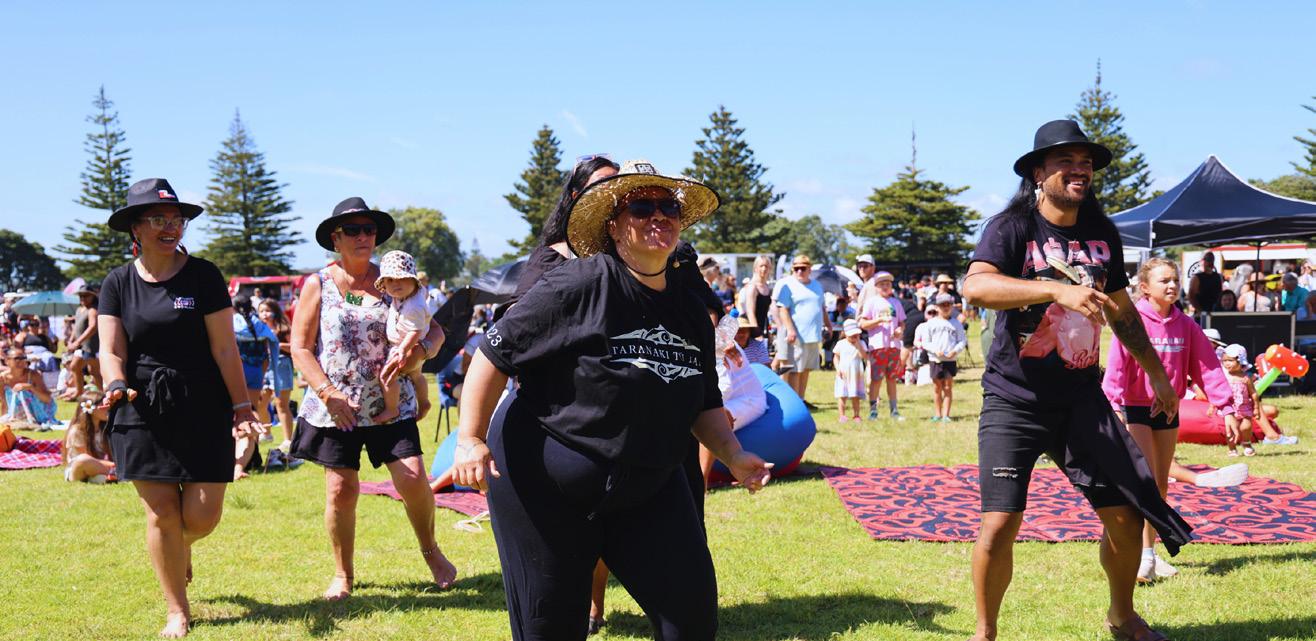
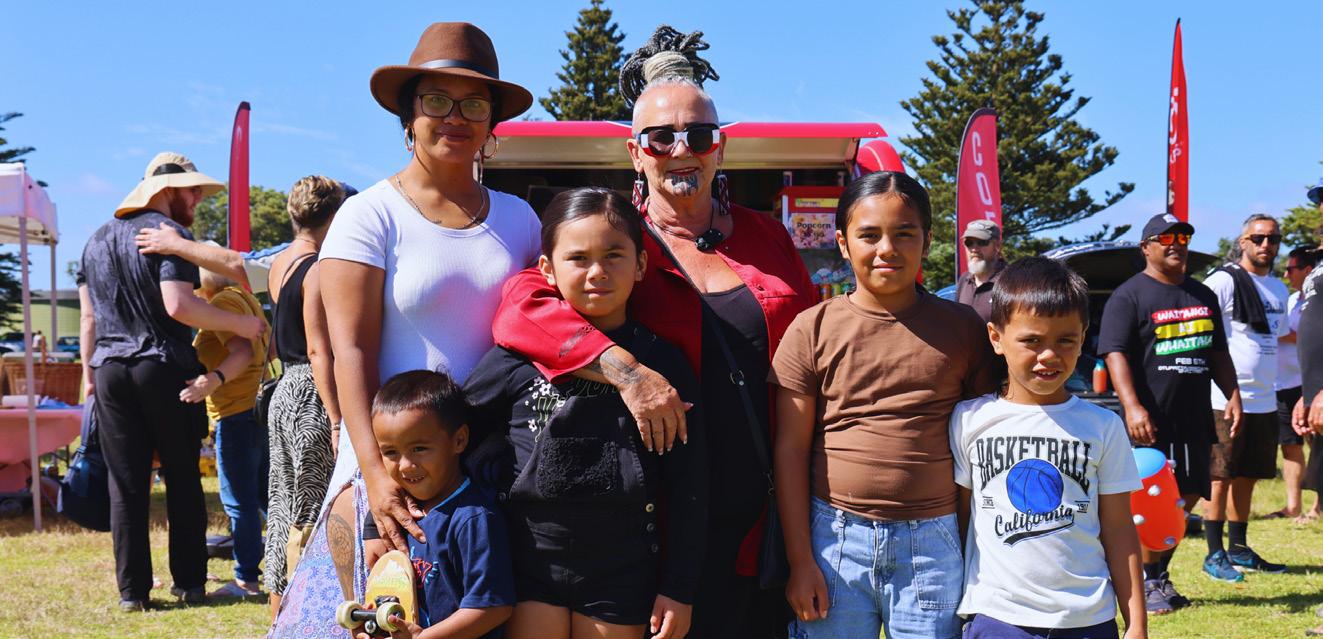
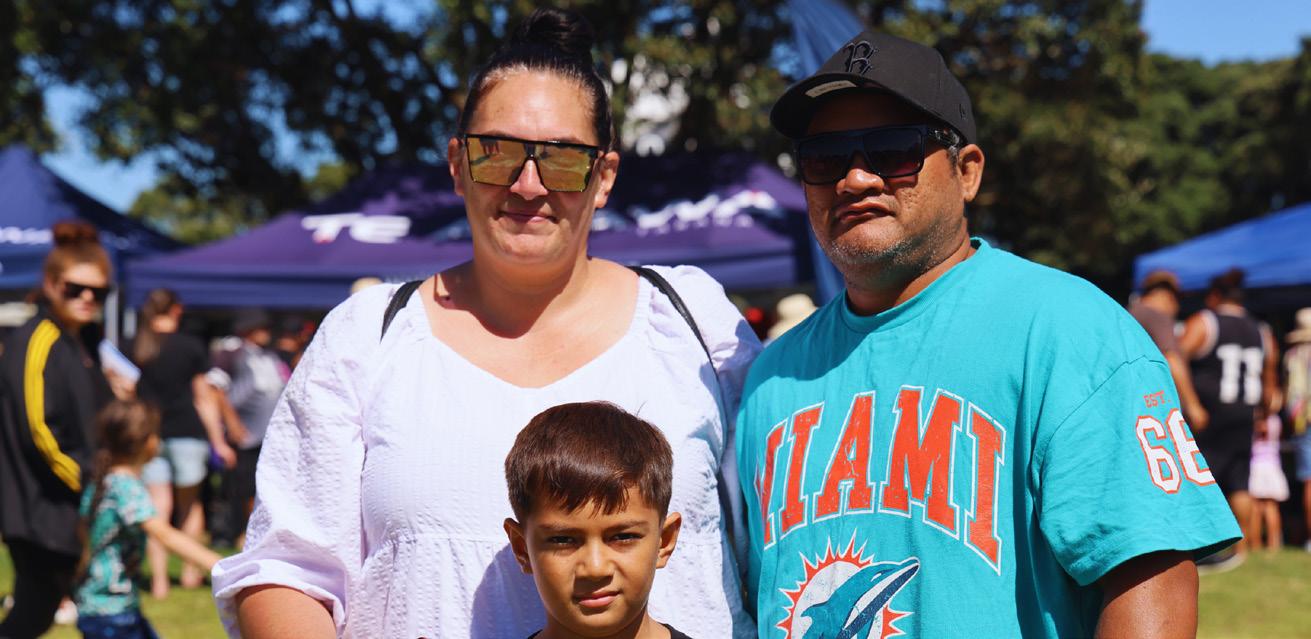
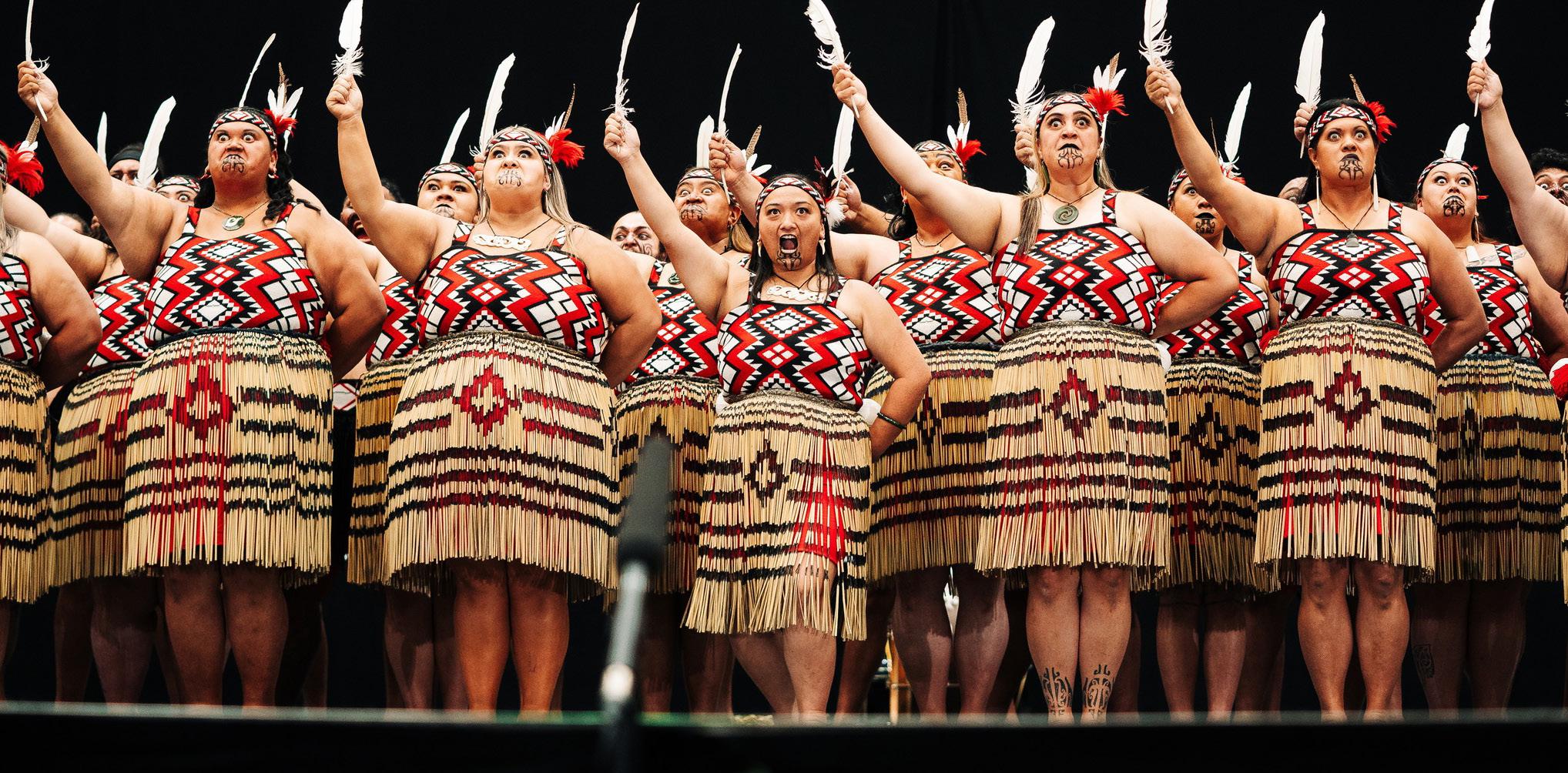
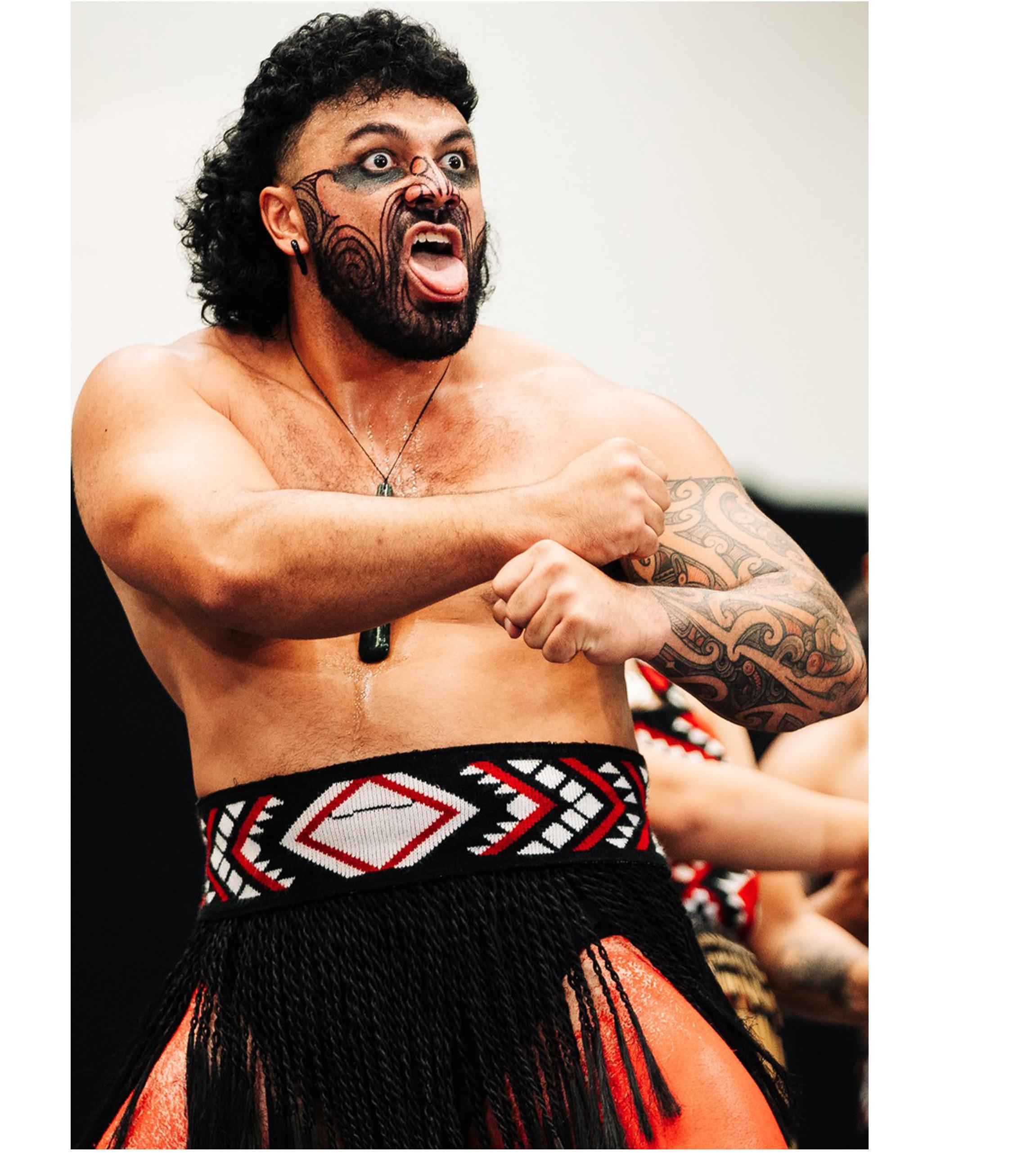
In the pokapū o Taranaki blooms Ngā Purapura o Te Taihauāuru. The Whaitara-based Kapa Haka Rōpū was established in 2002 and has since become a whānau that is successful on the stage and inspiring throughout our community.
Ngā Purapura identify as a rōpū-ā-iwi, with many of their members having an affiliation to Te Atiawa. It is the unique identity as Taranaki Māori that grounds Ngā Purapura o Te Taihauāuru. Taranaki reo, whakapapa, history and mātauranga are grounded both on and off stage. This philosophy stretches from the appearance of their kākahu and the essence within their brackets to an extended commitment to their whānau, hapū, marae and iwi.
Ngā Purapura o Te Taihauāuru never ceases to showcase their excellence. They have proudly represented Taranaki at seven Te Matatini events - the largest Kapa Haka competition in the world that is hosted biennially. Rōpū from around Aotearoa first compete in regional competitions, from which the top teams are selected and qualify for this national event.
Ngā Purapura o Te Taihauāuru came second in the 2024 Te Kāhui Māunga Regional Competition, sending them through to the 2025 Te Matatini Competition. Next year’s competition offers additional vigour with the event being hosted locally in Taranaki. The wairua of their forthcoming performance will be nurtured on the very whenua from which it was born. The stage will truly be theirs.
The success Ngā Purapura has had on stage is a testament to the dedication and loyalty held within the rōpū. Kapa Haka is a way of life for the members and requires a firm commitment to weekly practices and monthly wānanga that begin months before competition time. But a persistent passion and enduring aroha towards this kaupapa has seen Ngā Purapura continue this path for 22 years. From what they have achieved on stage, to the impact they have had within the Taranaki hapori, it is no doubt that this commitment has paid off.
Te Kotahitanga o Te Atiawa has a continuous commitment to removing financial barriers in education for Te Atiawa members as a means to promote life-long learning and reward excellence. The total amount distributed in Education Scholarships and Grants this year to registered members was $174,377 to 215 uri. This includes a portion of $1250 that is allocated towards a joint scholarship with Parininihi ki Waitōtara.
An important development in our Education Grants this year is the renaming of the scholarship and grant titles.
Each title begins with “Pou” which alludes to the grants and scholarships being a pillar of support. This is followed by a term that represents the characteristics of a person who is awarded that scholarship and where they are in their academic education journey.
• Pou Tina Scholarship (Post-Graduate Annual Scholarship): $5000
• Pou Whenua Scholarship (Undergraduate Scholarship): $2500
• Poupoutahi Scholarship (Joint Scholarship: Te Kotahitanga & Parininihi ki Waitotara): $1250 input
• Pou Wānanga Scholarship (Tertiary Grant): Full-time: $1000, Part-Time/Fees Free: $500.00)
• Pou Kōrero (Secondary School Grant – Year 11-13) - $250
The titles of the Te Kotahitanga Education Scholarships and Grants derive from a sequence of Te Atiawa whakapapa. This ensures that the education grants are clearly interconnected with Te Atiawa identity and align with Te Kotahitanga vision and values.
Te Kotahitanga is pleased to continue a partnership with Victoria University of Wellington. Te Atiawa students attending Victoria University who receive an education grant from Te Kotahitanga will also receive financial support from Victoria University equal to the value of their education grant.
Scholarships and grants were communicated through social media channels, emails, iPānui, educational initiations and the Te Kotahitanga website. Access to the grants and scholarships remains via the Taranaki Scholarships Portal. This portal streamlines the region’s scholarships/ education grants and enables uri to have convenient access to other scholarships they may be eligible for.
For a full list of Education Grant recipients, please see page 93
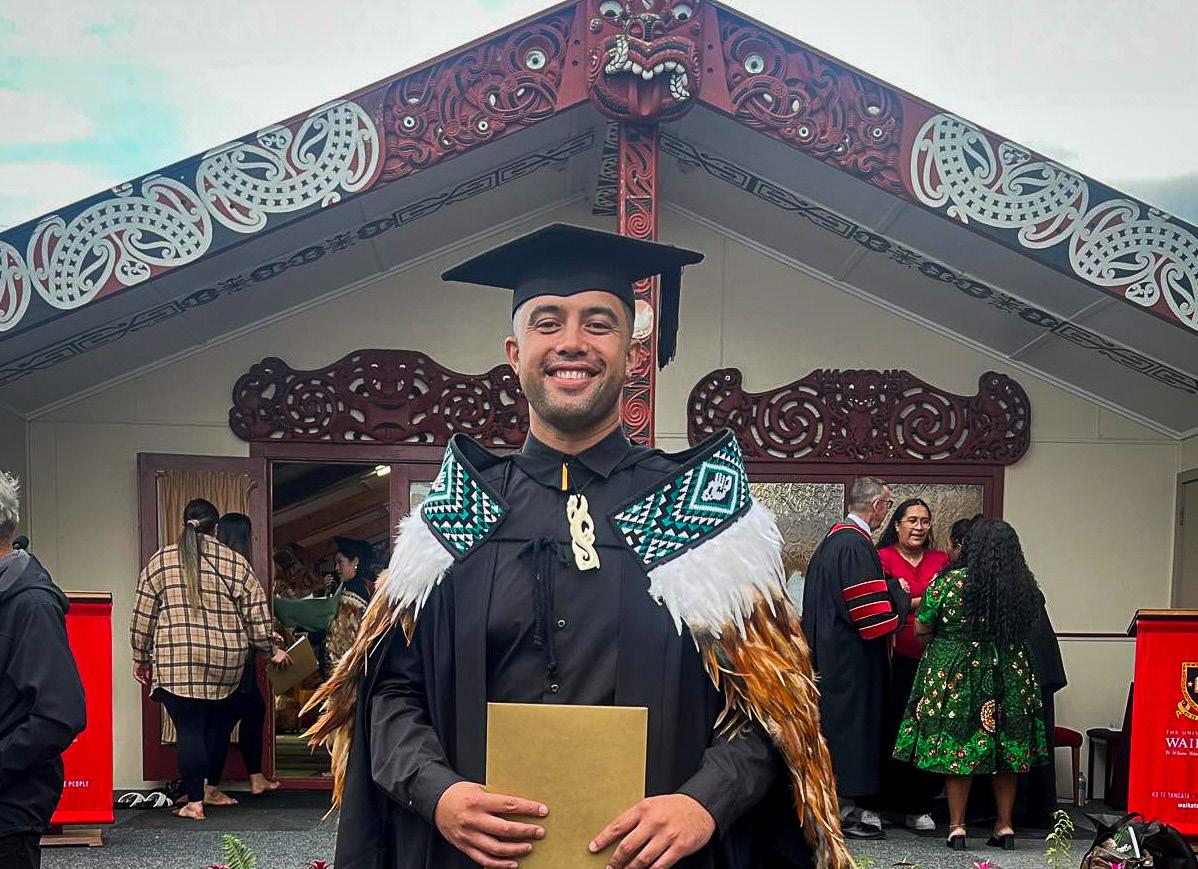
Pou Whenua Scholarships: Vallance Wrathall - Bachelor of Design and Arts
Teina Ngaia - Bachelor of Arts, Health Promotion & Anthropology
Bailee Manukonga - Bachelor of Nursing
Madeleine Hall - Bachelor of Medicine and Surgery
Jessie McKenzie - Bachelor of Laws (LLB) & Bachelor of Commerce Law & Accounting
Poupoutahi Scholarship: Sean Wipatene - Bachelor of Architectural Studies
‘Te toi whakairo, ka ihihi, ka wehiwehi, ka aweawe te ao katoa’
Embellishing Waitara and bringing their presence to the fore, Ngāti Rāhiri has made their mark with new whakairo on the exterior of their Queen Street office.
The carvings depict our tupuna Rāhiri and his wife Rākei, along with his journeys and connections to locations all around Aotearoa. These whakairo are the works of Rangi Bailey and Morgan Watson who have been key figures in the growth of toi Māori within the Te Atiawa rohe.
Amidst the freshness of a June morning, a dawn ceremony took place to unveil the carvings. A clear sky flaunted its stars and moon, illuminating the blessing process below and the hundreds of people that were gathered. Delight beamed from all as they savoured the sight of the office waharoa now beautifully framed by the new carvings. The glow continued into the marquee where breakfast was served to complete the ceremony and this monumental event for Ngāti Rāhiri. It was distinctly special to have descendants of Rāhiri from Te Tai Tokerau in attendance. Their presence signified unison and sparked discussions on how we move forward together, strengthened, connected, and following in the footsteps of our courageous tupuna Rāhiri. Whakaaro about what the carvings should
represent and details were shared at previous wānanga and incorporated within the final works. Te Atiawa uri Bobby-Lee Waru affiliates to both Ngāti Rāhiri hapū o Te Atiawa and Ngāti Rāhiri hapū o Ngāpuhi. She says this kaupapa was close to her heart as her whānau had been actively involved in their hapū for many years.
“To have our whakairo acknowledged like this ignited overwhelming feelings of wairua, kare ā-roto and pride,” she says. says it is a significant step for Ngāti Rāhiri in the development of their āhuatanga Māori.
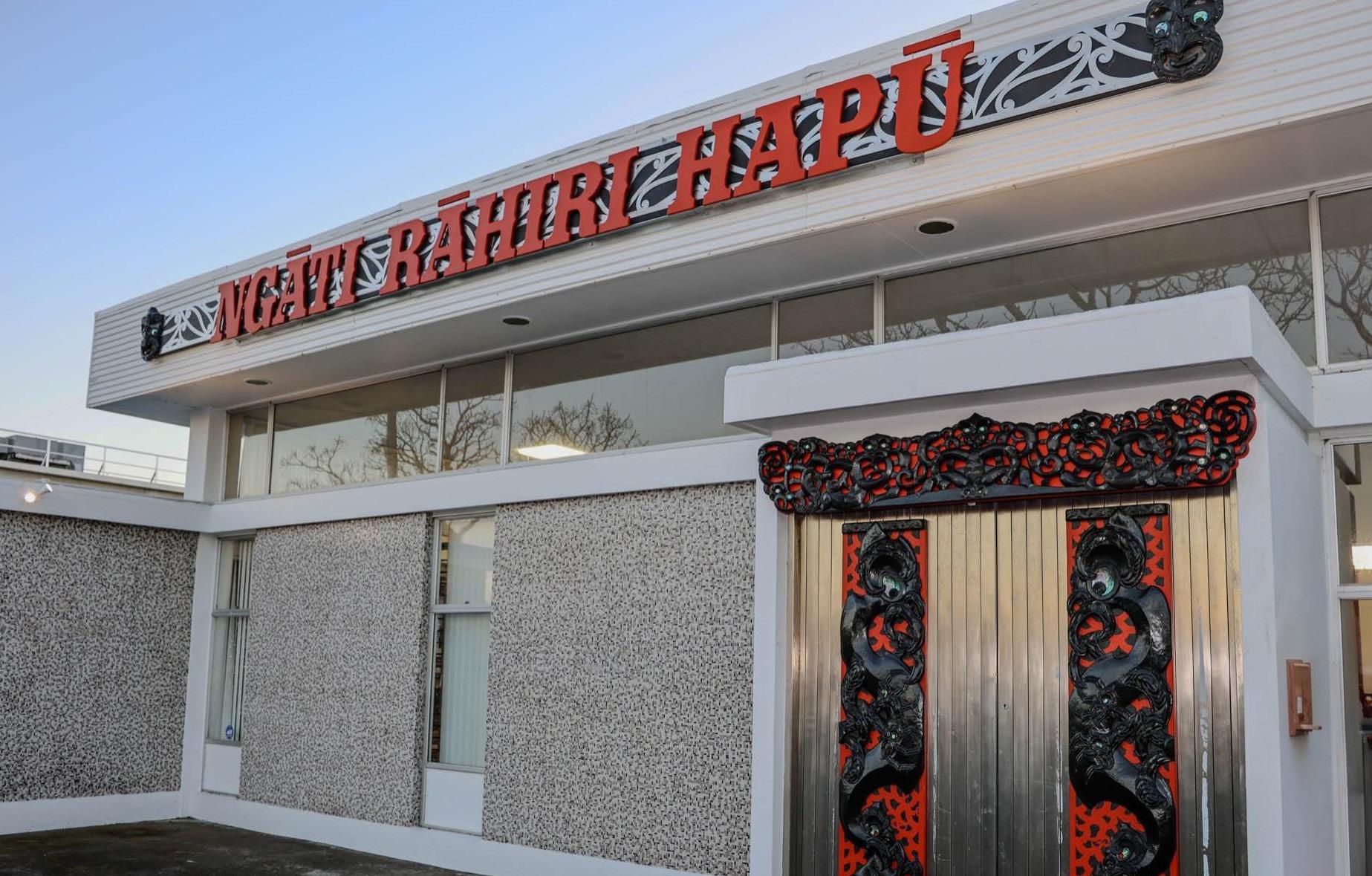
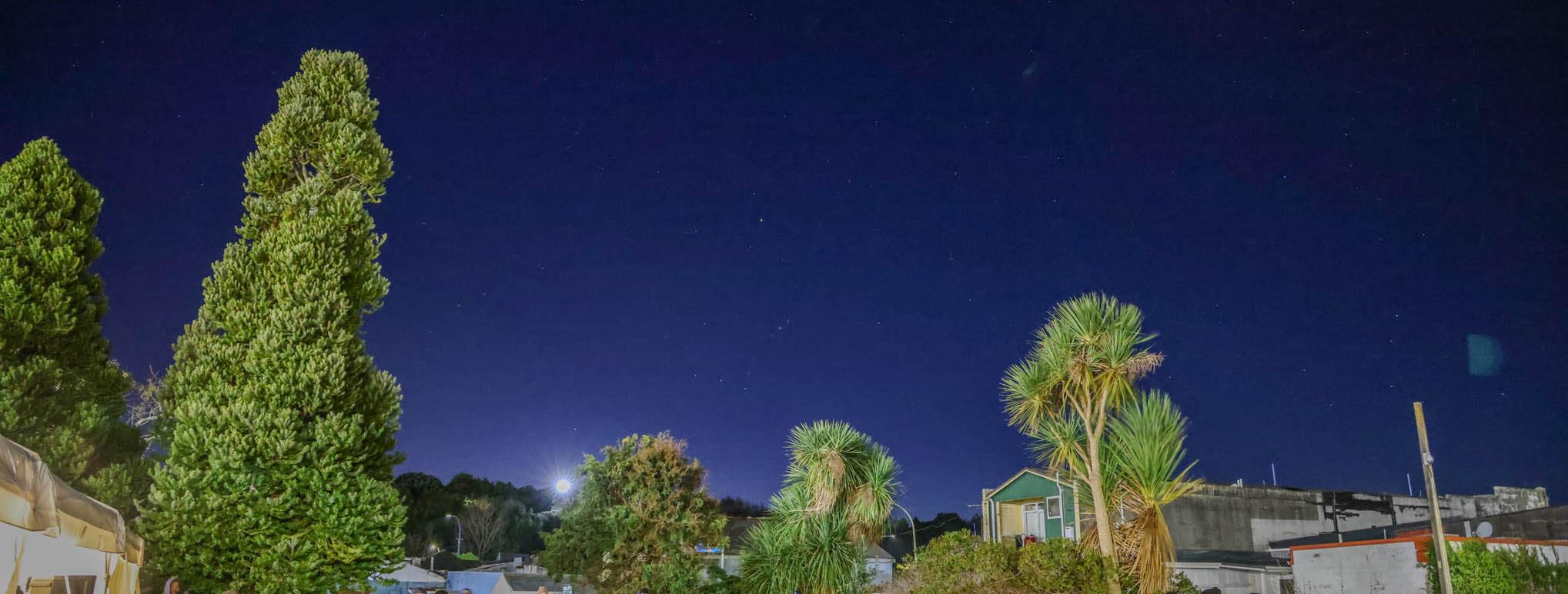


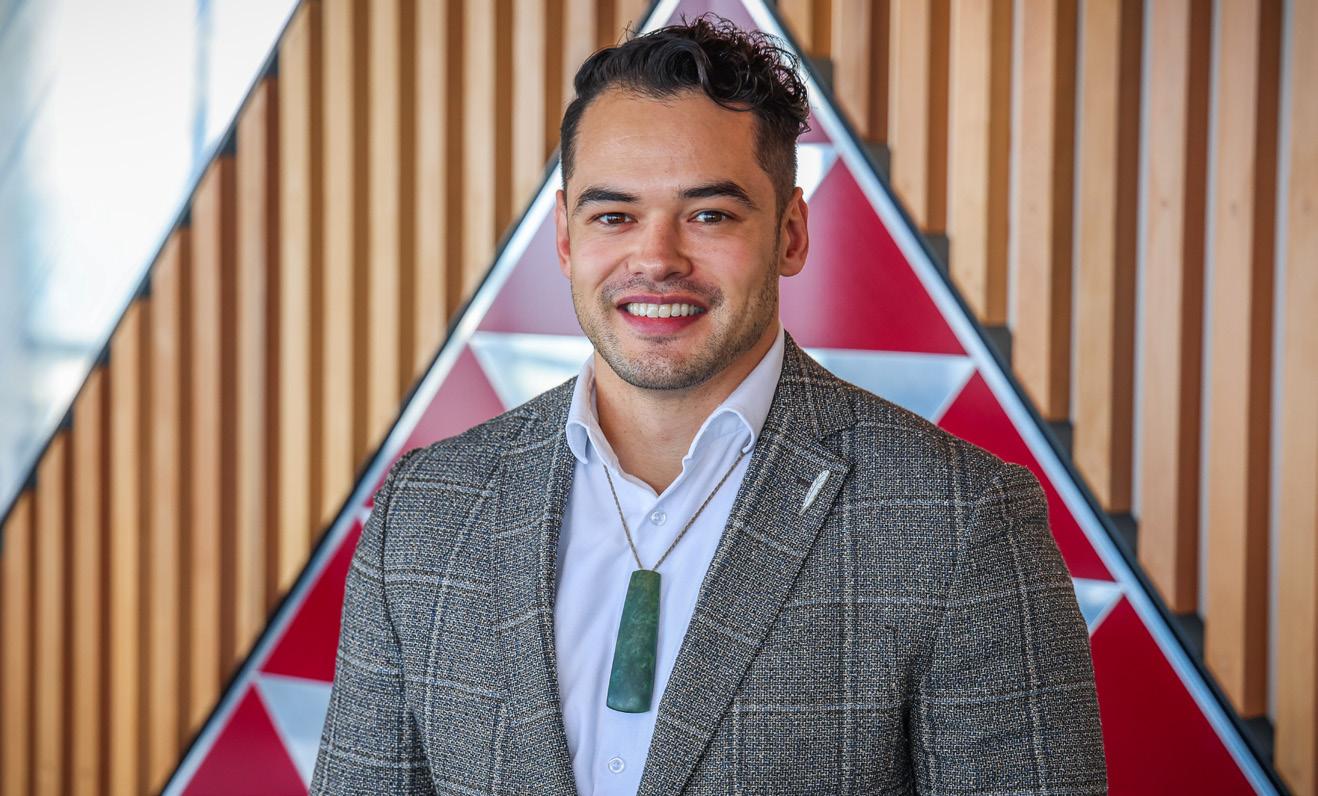
Te Kotahitanga o Te Atiawa has long spoken of the need for effective succession planning. Recent developments have seen the induction of two Te Atiawa Uri into observer roles which has seen them gain experience and mātauranga within various divisions of Te Kotahitanga. These appointments aimed to increase the proficiency of our own uri and give them the opportunity to serve in specialist roles in the future.
The first appointment was of Lewis England as an associate director of Te Atiawa Holdings Limited Partnership and Te Atiawa (Taranaki) Holdings Ltd. Lewis has extensive experience within the Real Estate Industry, with this new role being his first step into governance.
The second appointment was Emma Park as an observer on the Te Kotahitanga o Te Atiawa Finance, Audit, and Risk Committee. Emma is a Fellow Chartered Accountant, a member of the Institute of Directors, and has held various financial accounting positions in her career.
The growth of specialist knowledge within our iwi and succession planning has led to the establishment of these roles. Te Kotahitanga aims to recruit annually for twelve-month positions, cultivating an experienced and skilled generation who are prepared to serve as our next generation of visionaries and directors.
Te Kotahitanga o Te Atiawa have long spoken of how to best position the Post Settlement Government Entity for effective succession.
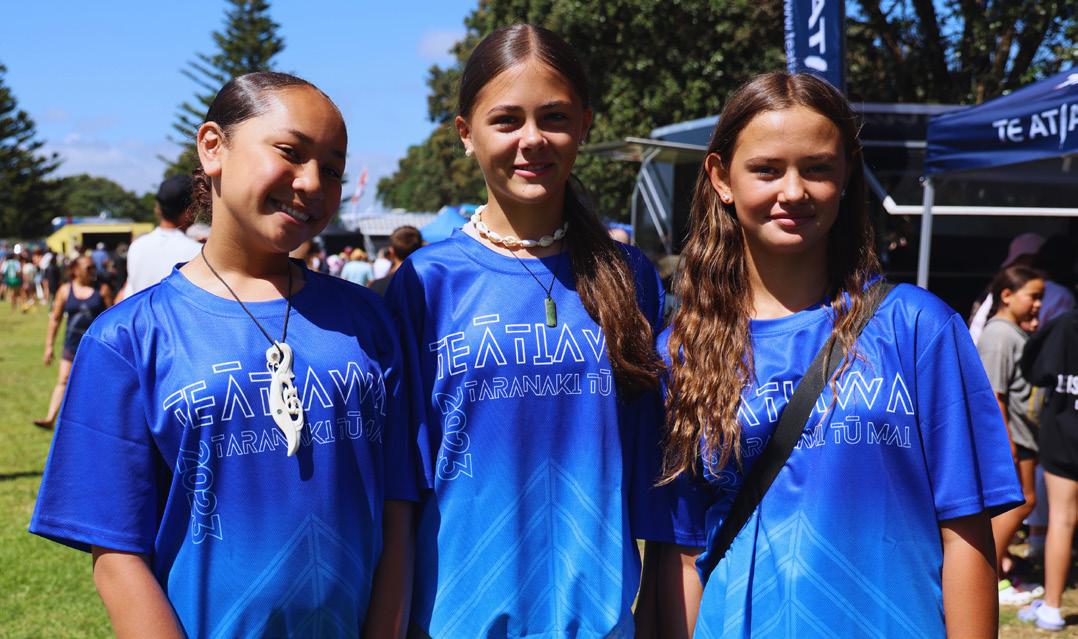
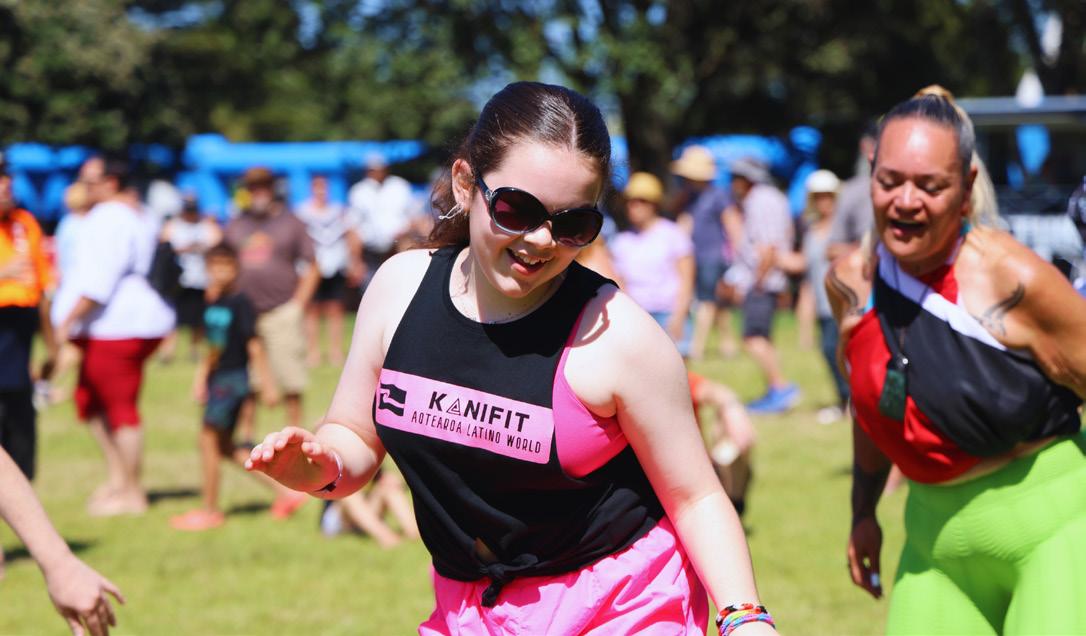
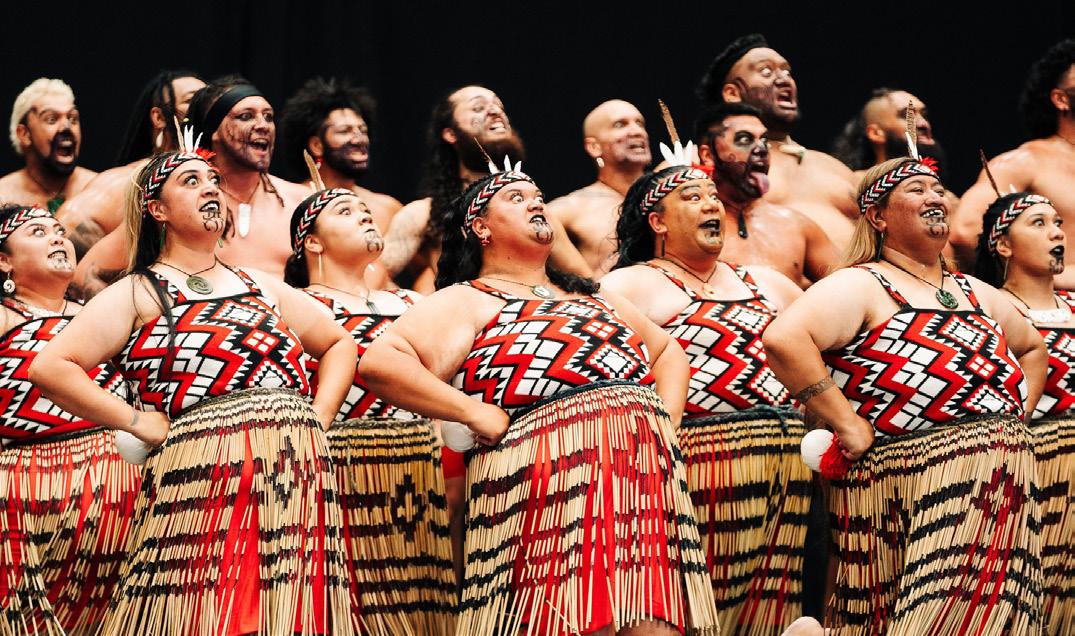


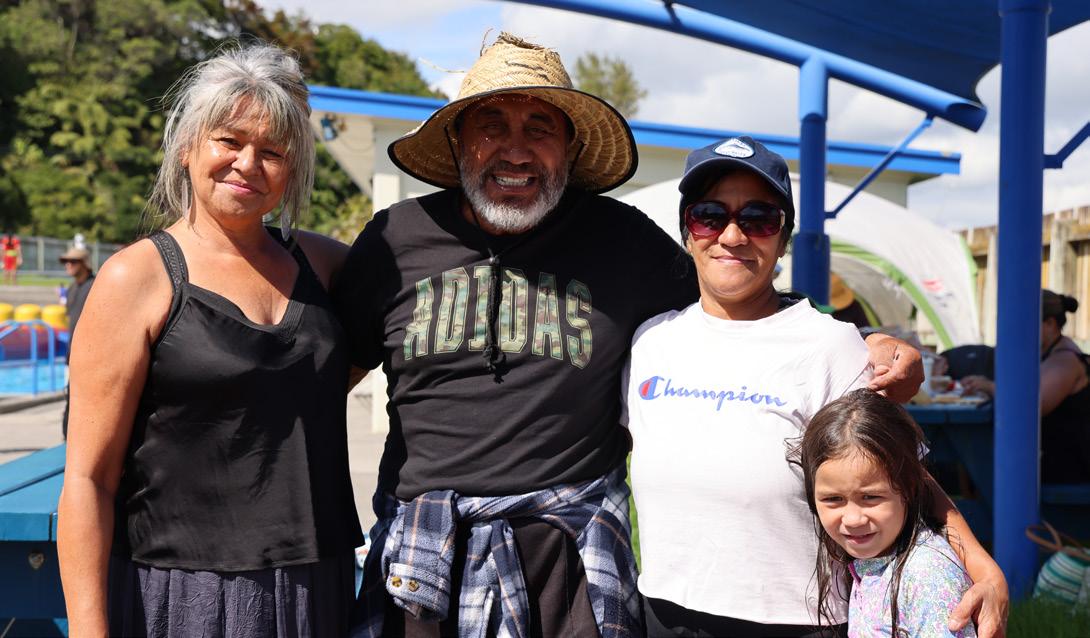
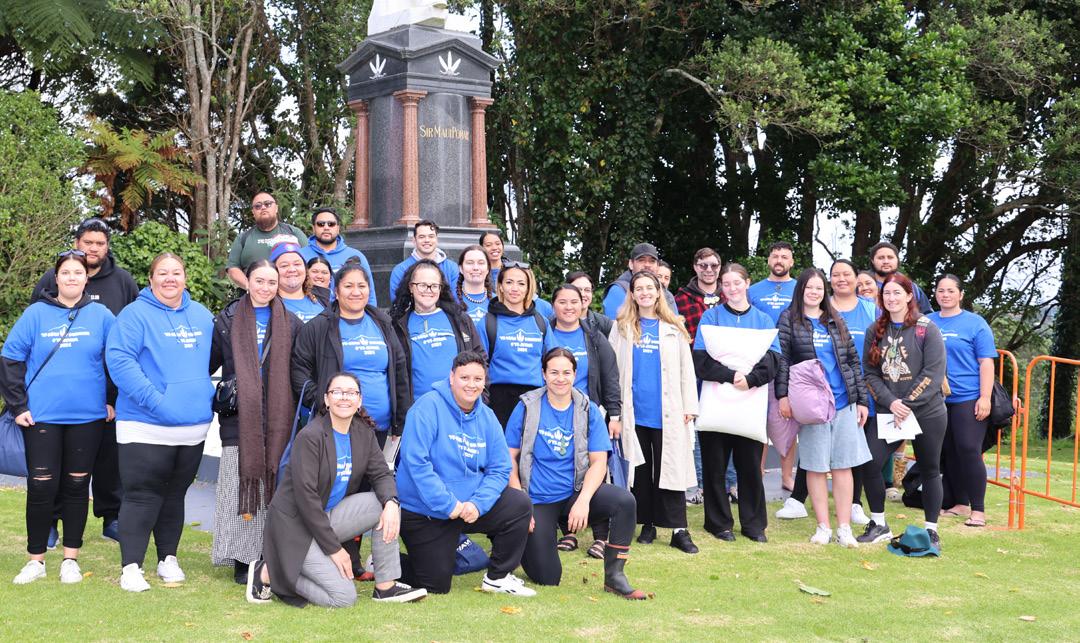
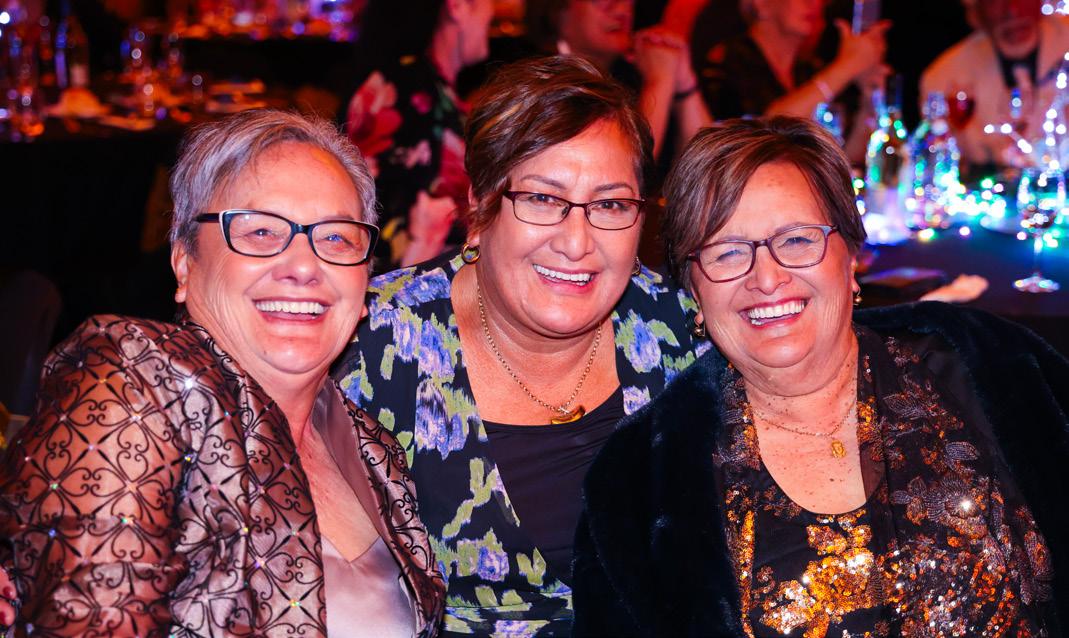
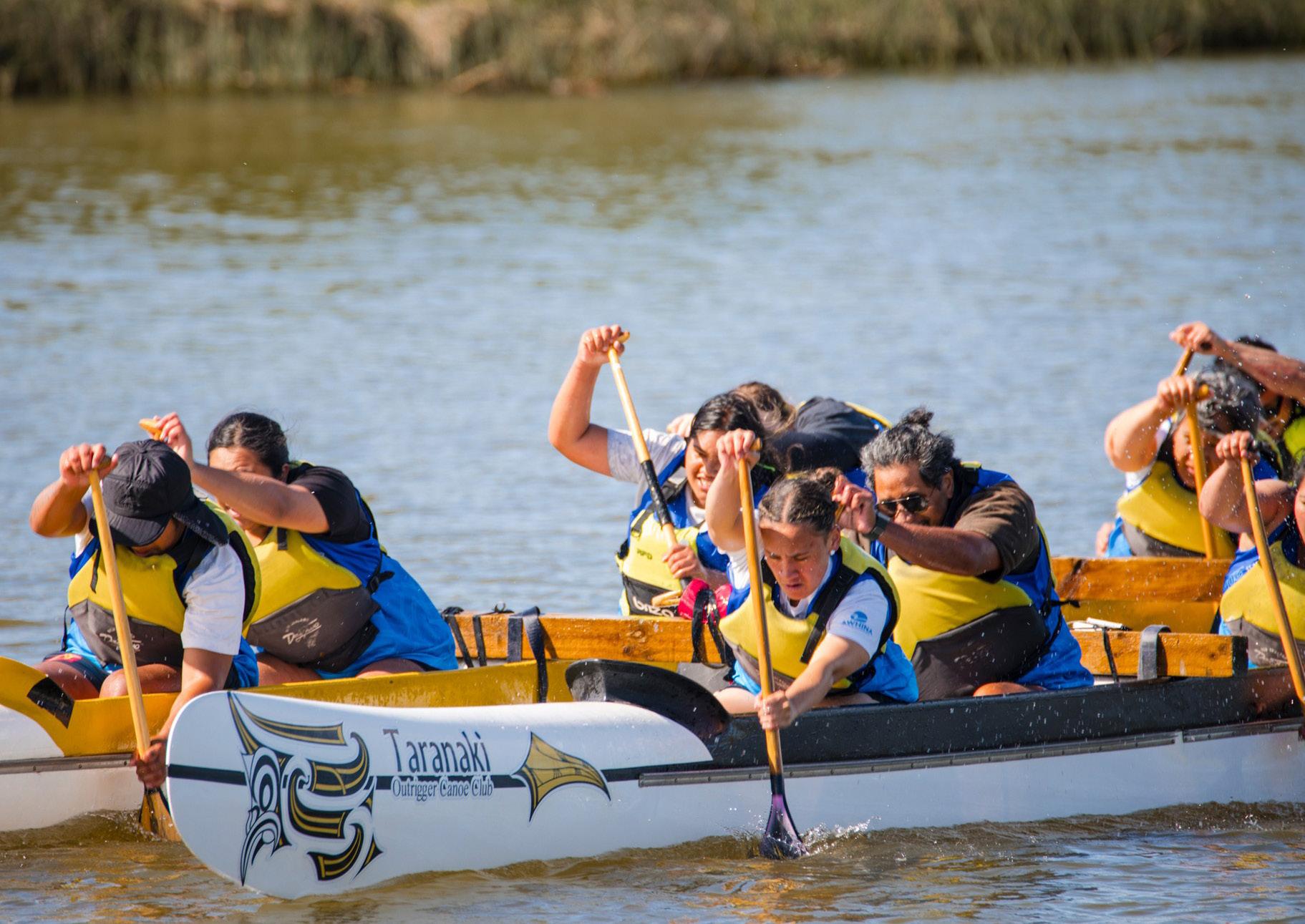
Te Iho Whenua focuses on opportunities that enable Te Atiawa whānau to reconnect with our whenua and taiao.
Te Mana o te Wai recognises the vital importance of clean, healthy water for maintaining the health of our water bodies, freshwater ecosystems, and the communities that rely upon them for their sustenance and well-being. In essence, by protecting the health and well-being of our rivers, lakes, streams, and other freshwater bodies, we, in turn, protect the health and well-being of our people and surrounding environments.
In 2022, the chairpersons of the eight iwi Post-Settlement Governance Entities (PSGE) in Taranaki and the Taranaki Regional Council (TRC) entered into a partnership agreement for the delivery of freshwater policy in Taranaki. The purpose of the partnership agreement is to provide support for iwi to be involved in and respond to TRC policy and planning processes under the Resource Management Act (RMA) 1991 on areas of current interest to iwi of Taranaki. This is currently being led by Maria Hokopaura, who is located with Te Kotahitanga o Te Atiawa but works on behalf of all eight iwi.
There have been a lot of policy, regulatory and statutory changes brought in by the current Government which has required some adaptation of the partnership agreement. Much of the agreement was driven by the National Policy Statement for Freshwater Management (NPS-FM) 2020, which required that the concept of Te Mana o Te Wai be embedded into regional councils’ freshwater management and decision-making by the end of 2024. The current government has stated that they will review the NPS-FM to “rebalance Te Mana
o te Wai to better reflect the interests of all water users” and has extended the deadline to December 2027 to allow for their changes to be made. The ability for councils to consider Te Mana o Te Wai in consent applications has also been removed.
While these changes are challenging, it emphasises the importance of tangata whenua partnering with regional council at the planmaking stage and having strong relationships at multiple levels that can support and facilitate the desired outcomes. TRC have decided, with the support of iwi, to continue with the development of the Draft Land and Freshwater Plan for Taranaki, aiming to publicly notify the draft plan for submissions in mid-2025.
As part of the plan development, a series of public consultation sessions regarding draft targets was held and because of the partnership with iwi, seven iwi/hapū/marae-hosted sessions exclusively for tangata whenua were also held around the region, including one hosted by Ngāti Rāhiri at their tari in Whaitara. The hui ā-kanohi in our own spaces was a new and welcomed approach and TRC received very valuable information and honest feedback from our whānau who attended.
It is hoped that future consultation and engagement for the Draft Land and Freshwater Plan builds on this experience and continues to provide meaningful opportunities for our marae, hapū and iwi to see themselves reflected in the Plan’s visions, values, outcomes and targets.
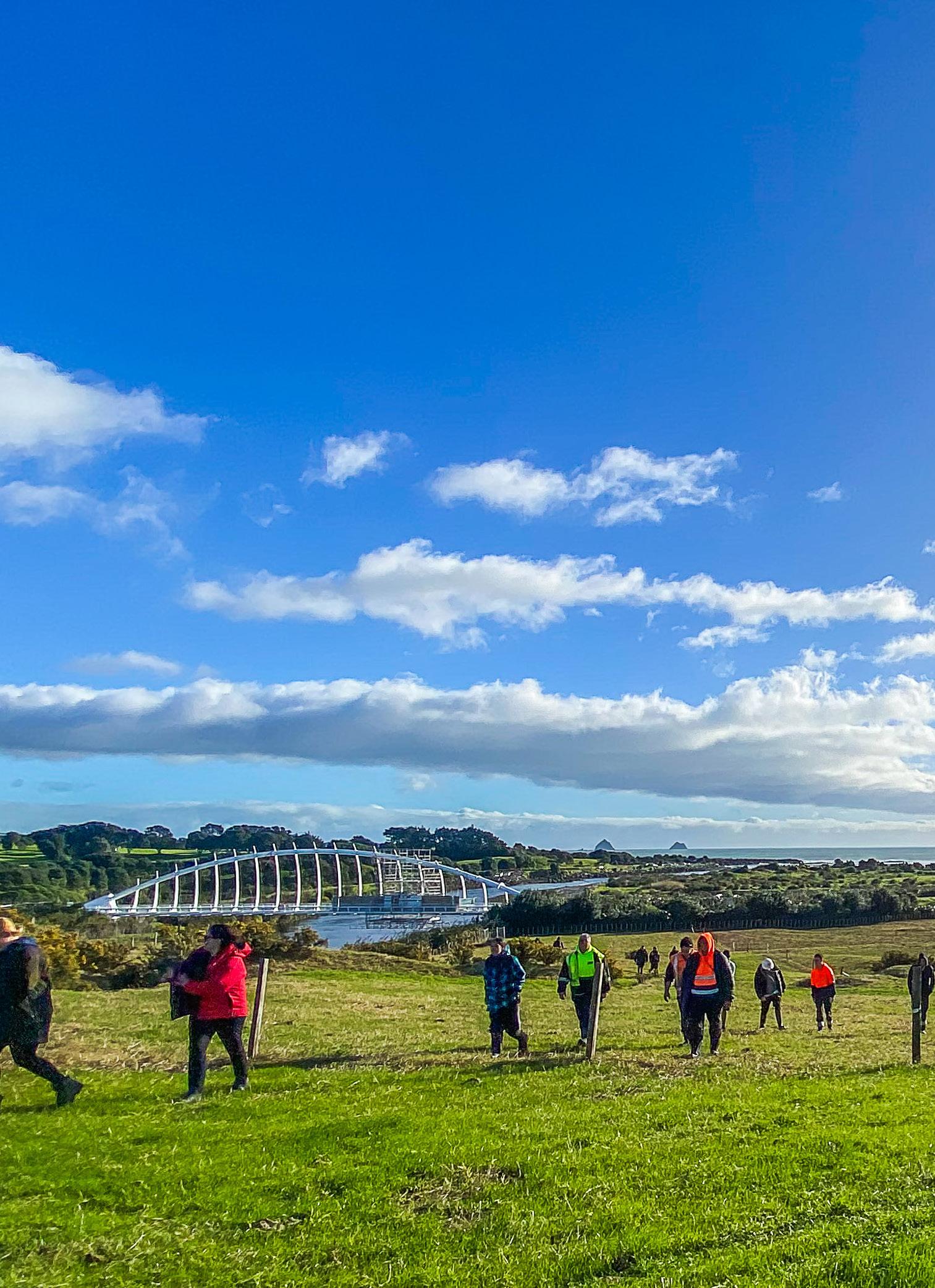
Te Kotahitanga o Te Atiawa (Te Kotahitanga) are committed to supporting Te Atiawa uri as resilient and thriving kaitiaki of our taiao and whānau.
Te Atiawa rohe was traditionally a fertile land that was abundant in natural resources. The whenua sustained our people and the māra kai (garden) was an integral site of sustenance where our tūpuna had well-established māra practices. However, challenges including raupatu, urban and industrial development and cultural erosion have seen the dismantling of these traditions.
Te Kotahitanga firmly acknowledges the importance of enabling uri to reclaim our traditional food systems and restore our knowledge of the māra.
In alignment with this desire, Te Kotahitanga was able to offer the opportunity for uri to join the Tātai Tangata ki te Whenua programme in 2023.
Tātai Tangata ki te Whenua is centred on the māra and provides participants with knowledge and materials that help build foundational gardening skills. The program promotes kai sovereignty, reconnection to cultural landscapes and traditions and the ability to relieve uri from the high cost of fresh fruit and vegetables.
Beginning in Kōanga and completing in Ngāhuru, tauira are involved in a series of online and inperson wānanga facilitated by our whānaunga Pounamu Skelton. During this six-month period, whānau become empowered to grow their own māra and furthermore, build a stronger connection with te taiao.
Tātai Tangata ki te Whenua is a holistic journey that demonstrates the interconnectedness between the hauora of the whenua and the hauora of ngā tāngata. Emphasis is placed on the Maramataka, Tikanga a te Māra, and Te Reo. The practices and philosophies that are taught, such as Parakore, consistently highlight the importance of protecting Papatūānuku. Whānau develop a kete of mātauranga that supports them with competence in the garden and mātauranga that enhances their identity, increases their cultural capacities, and promotes environmental awareness.
Over the 2023-24 period, 32 Te Atiawa uri participated in the Tātai Tangata ki te Whenua Programme.
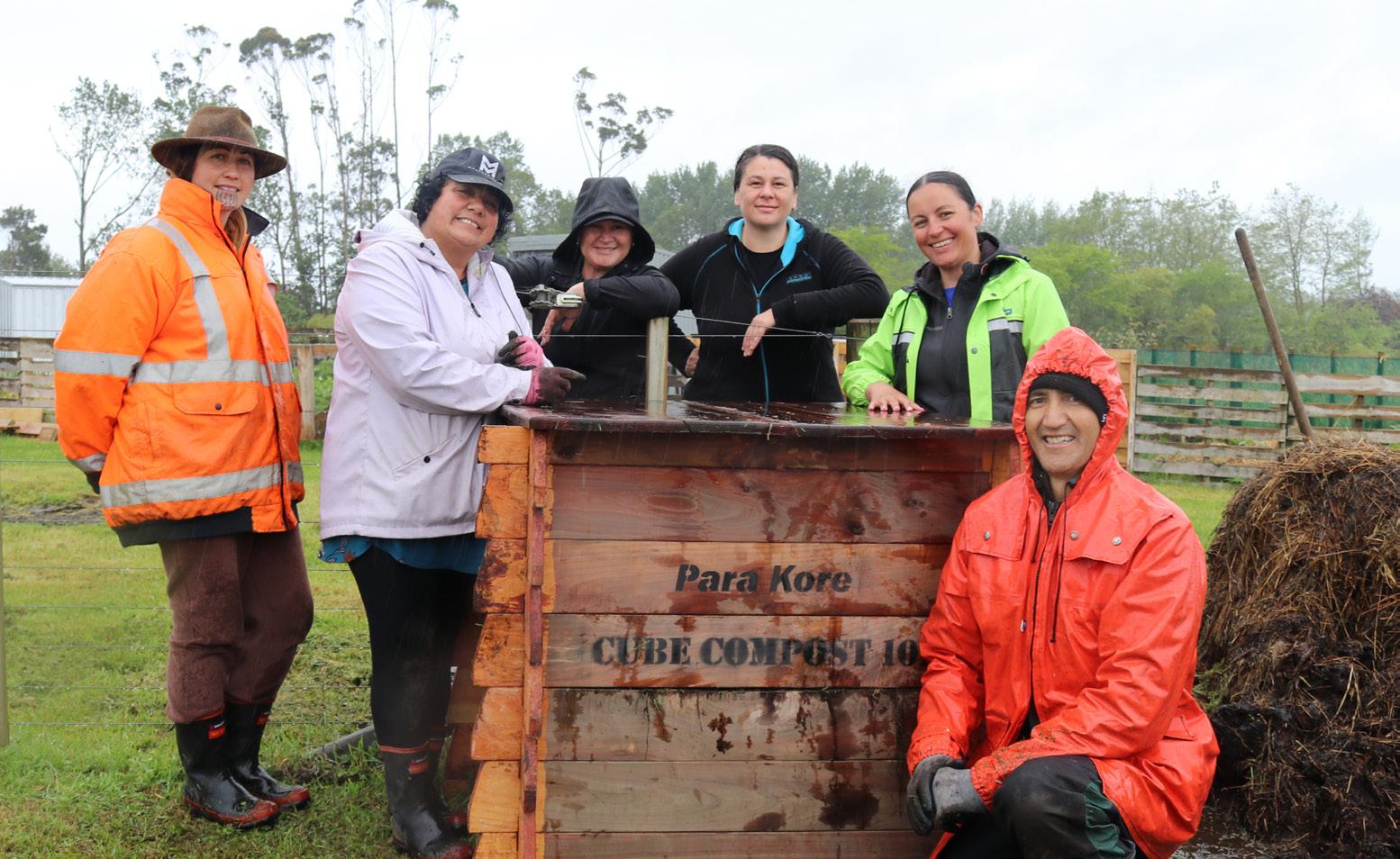
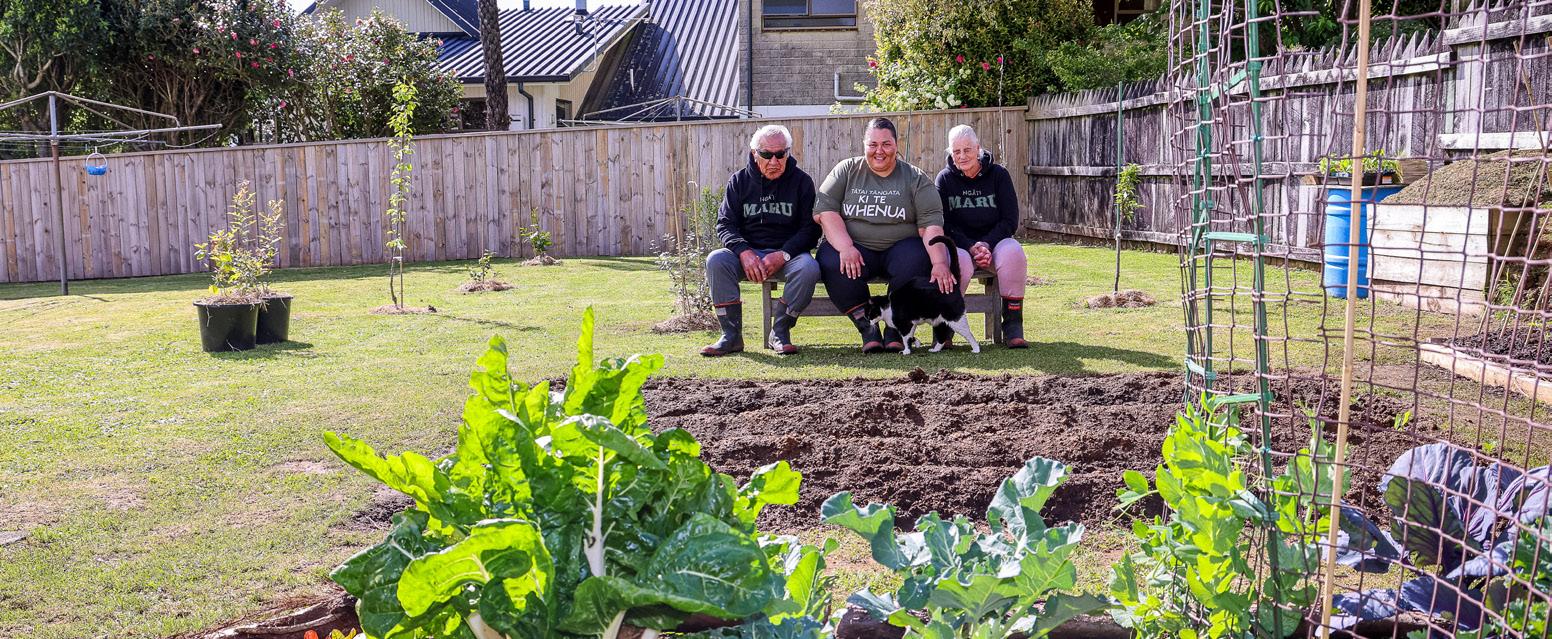
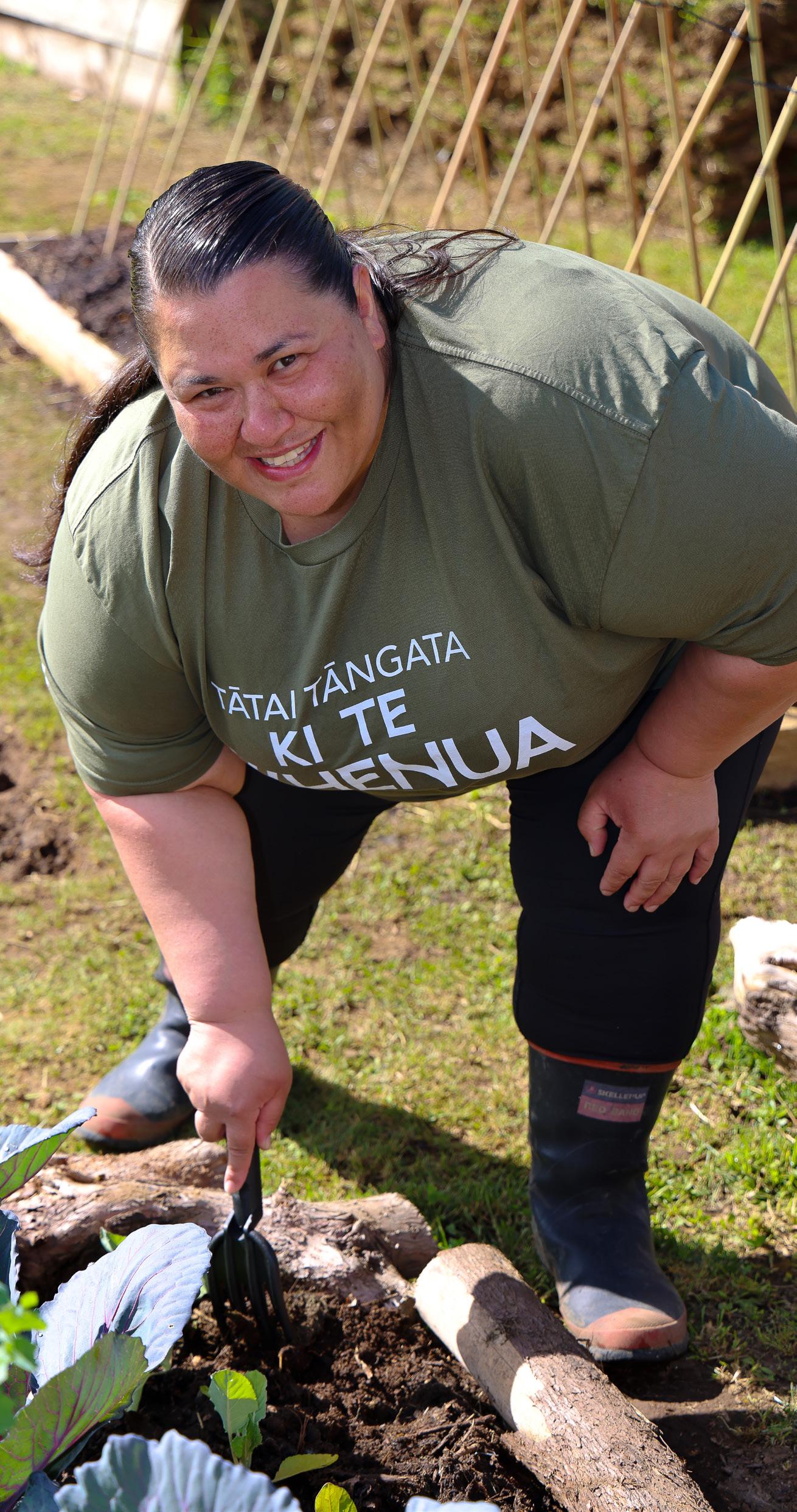
Mirihana Patu was a part of this first Te Atiawa cohort and describes the experience as life changing.
“Learning about the influence of the Maramataka has not only become a tool for my garden but also for my life, my entire ōranga. The māra has given me the grounding that I need; physical wellbeing, spiritual wellbeing, mental wellbeing.”
Mirihana also acknowledges how Tātai Tangata ki te Whenua strengthened her affiliation with Te Atiawa.
“This was one of the first opportunities for me to connect with the iwi and get to know some of my Te Atiawa relations,” she says.
Te Kotahitanga is pleased to continue offering this programme for a second year. The 2024-25 cohort of 25 uri began in Ngāhuru and will have access to seven in-person wānanga and eight zoom wānanga throughout the duration of Tātai Tangata ki te Whenua.
Te Kotahitanga remains dedicated to ensuring that location is not a barrier for uri in accessing iwi opportunities. We are working towards developing the infrastructure that allows all Te Atiawa uri to take part in the Tātai Tangata ki te Whenua program, regardless of where they are located.
“What I loved about it was there was always some learning, and it has become a part of my hauora.”
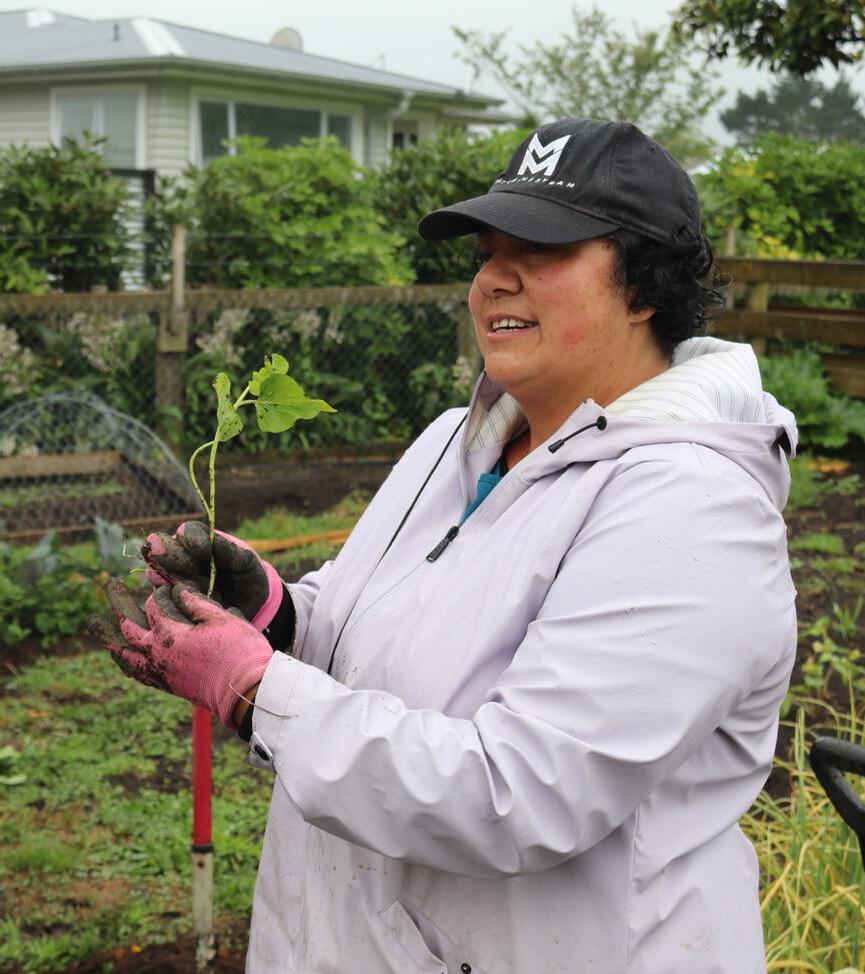
Taranaki Maunga stands proudly in the centre of the Taranaki rohe. Our principal tupuna acknowledged by Ngā Iwi o Taranaki, embodies the essence of our spirituality and identity. Despite our Maunga being remarkably sacred, our connection had been severed following years of raupatu. Historical injustices saw 1.2 million acres of Taranaki whenua confiscated by the crown, including Taranaki Maunga. Our people were deprived of access to sites of ancestral significance, food sources, and ultimately isolated from our tupuna.
However, tireless mahi has seen our people reconnecting to our whenua, and our Maunga receiving the care and protection it deserves. The past year has seen major advancements that have brought Ngā Iwi o Taranaki closer to transforming their aspirations into legislation that will reflect the values and identity of our tūpuna Maunga.
On the 1st of September 2023, Ngā Iwi o Taranaki came together with the Crown at Owae Marae to sign Te Ruruku Pūtakerongo; the Taranaki Maunga Collective Redress Deed. Within the deed, the Crown acknowledged its historical breaches in relation to raupatu and outlines the aspirations of Ngā Iwi o Taranaki. This includes renaming the national park as Te-Papa-Kura-o-Taranaki, and recognition of
the Maunga as a legal person named Te Kāhui Tupua. Te Tōpuni Kōkōrangi, a governance collective, will represent the face and voice of the Maunga, guided by the agreed values set out in the deed.
Certain provisions in Te Ruruku Pūtakerongo require statutory measures to be implemented. It was thus a further momentous occasion on the 9th of April 2024 for a pertinent bill, named Te Pire Whakatupua mō Te Kāhui Tupua, to make its way into parliament.
Te Kotahitanga assisted a small delegation of our kaumātua to travel down to Whangānuiā-tara where the first reading of the bill took place. The Te Kotahitanga tari also screened the reading in the newly opened Ngāmotu House for whānau to collectively witness this landmark event alongside a number of our Kaumatua who were unable to travel.
Te Kotahitanga are proud, motivated and inspired to be on this journey of properly asserting the mana of Taranaki Maunga. The deed acknowledges that the protection of its health and wellbeing is indispensable, and shall establish, restore and strengthen the unique connection that uri of Ngā Iwi o Taranaki have with our tūpuna.
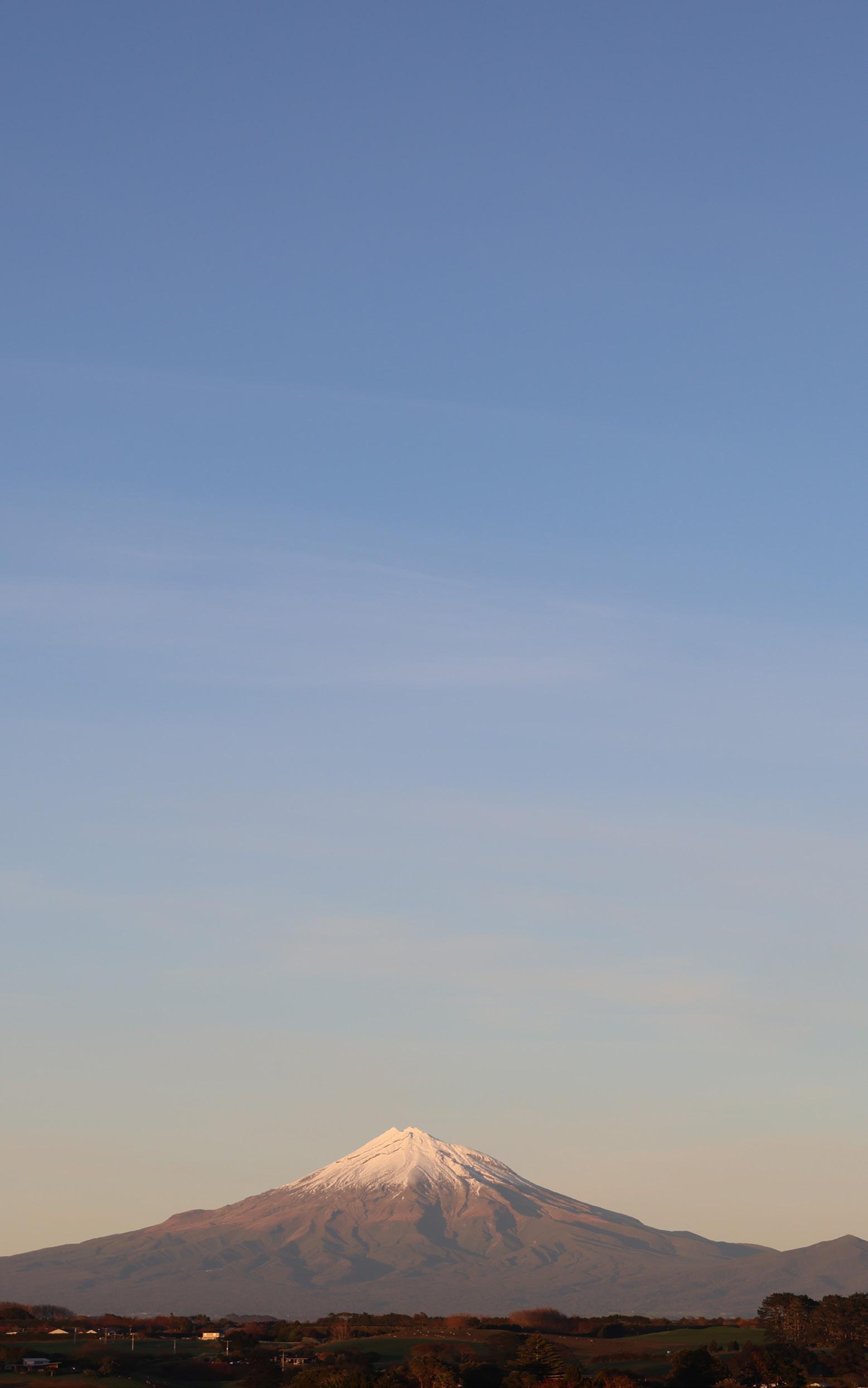
He pikinga poupou e
Ki roto o Taranaki
Ki reira au nei
Mātakitaki iho
Tukutuku roimata e
Tū mai Taranaki e
Tiketike mai rā tātou
Roto i te kawa tapu
Hāpainga tō mana
Torotika ki a Rangi e
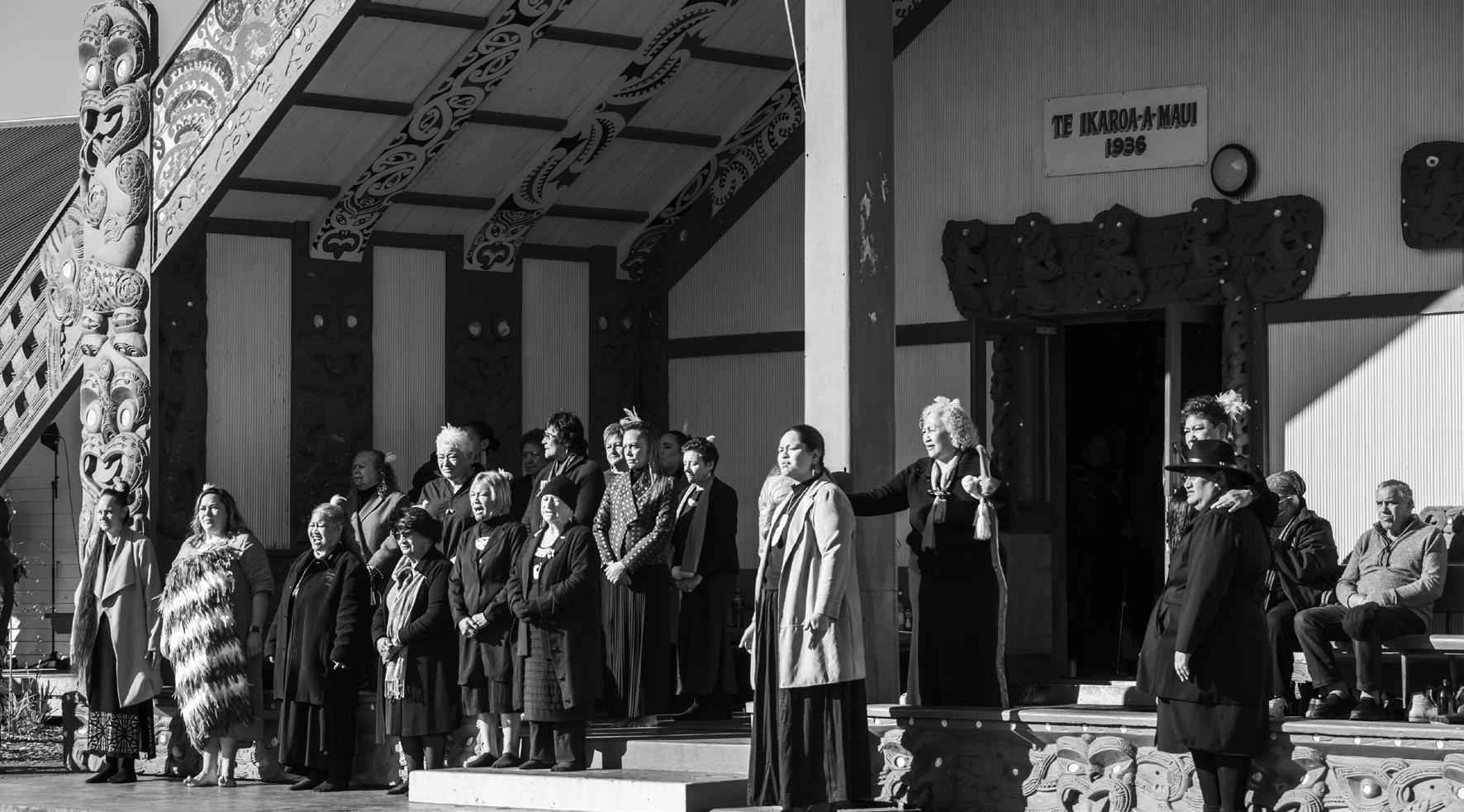
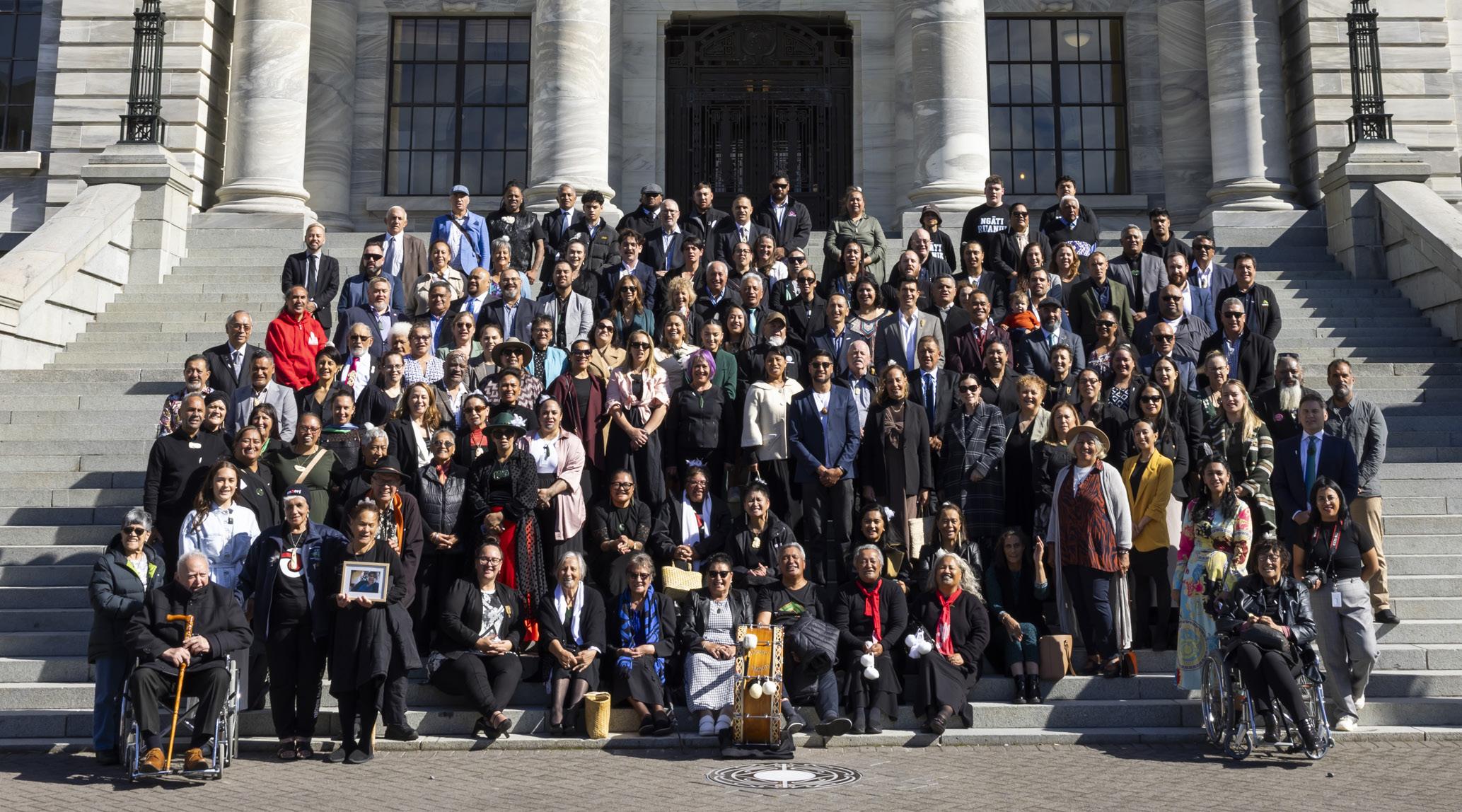
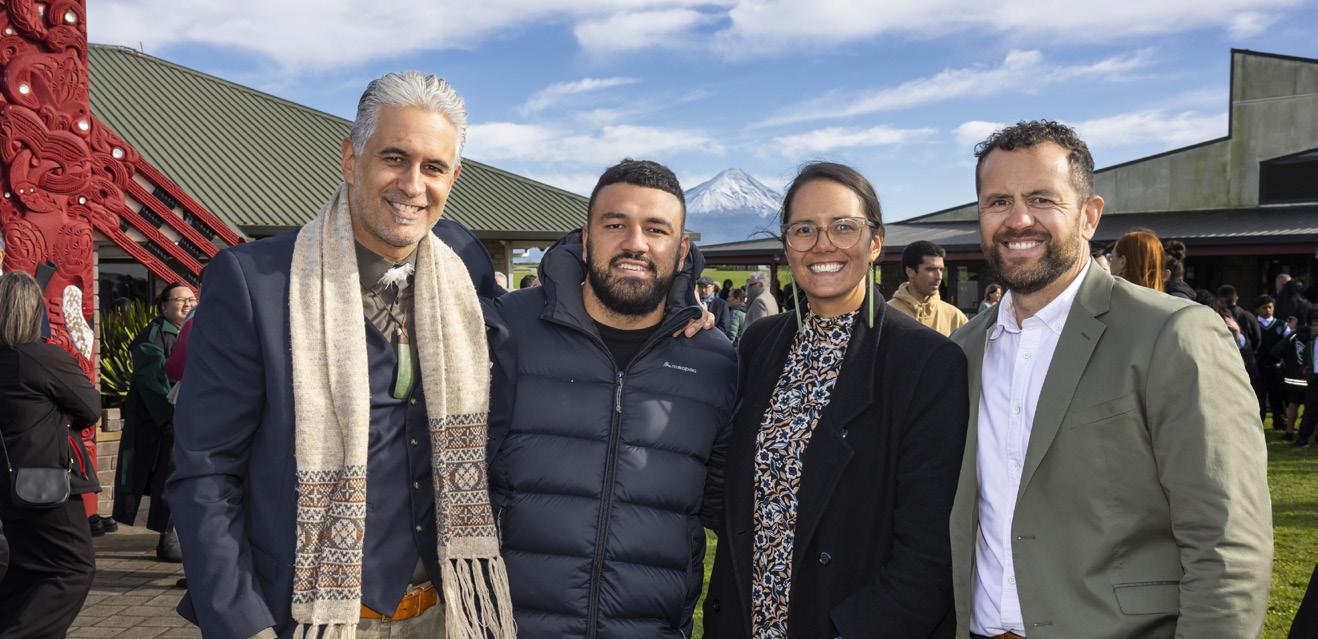
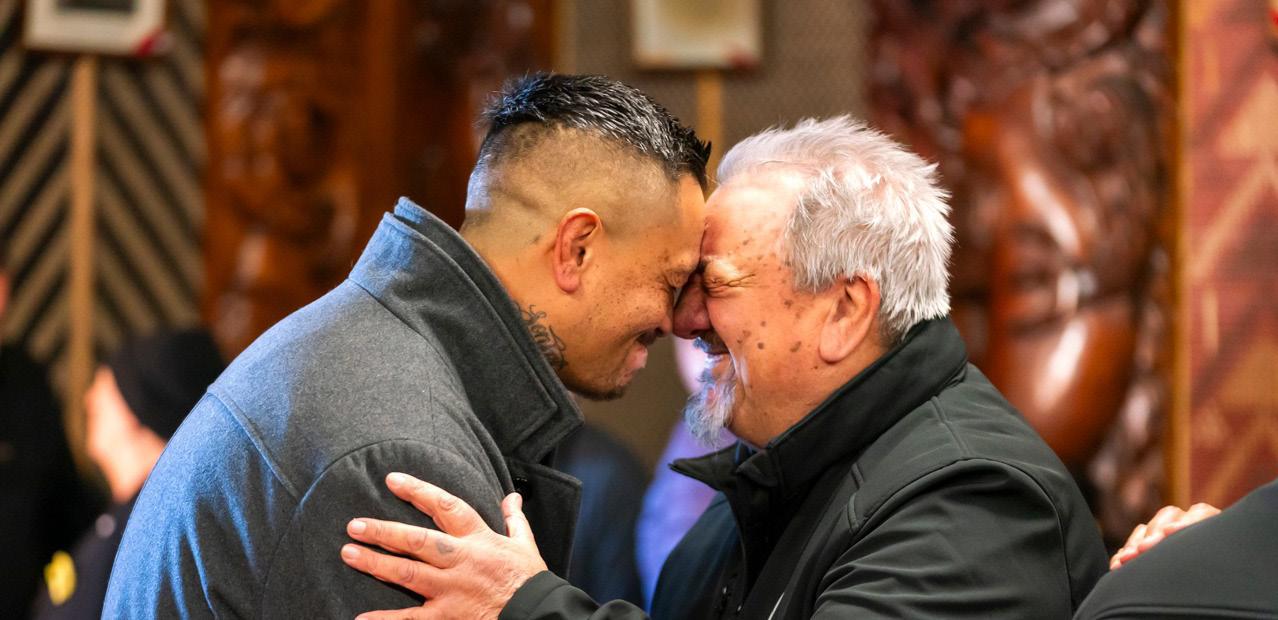
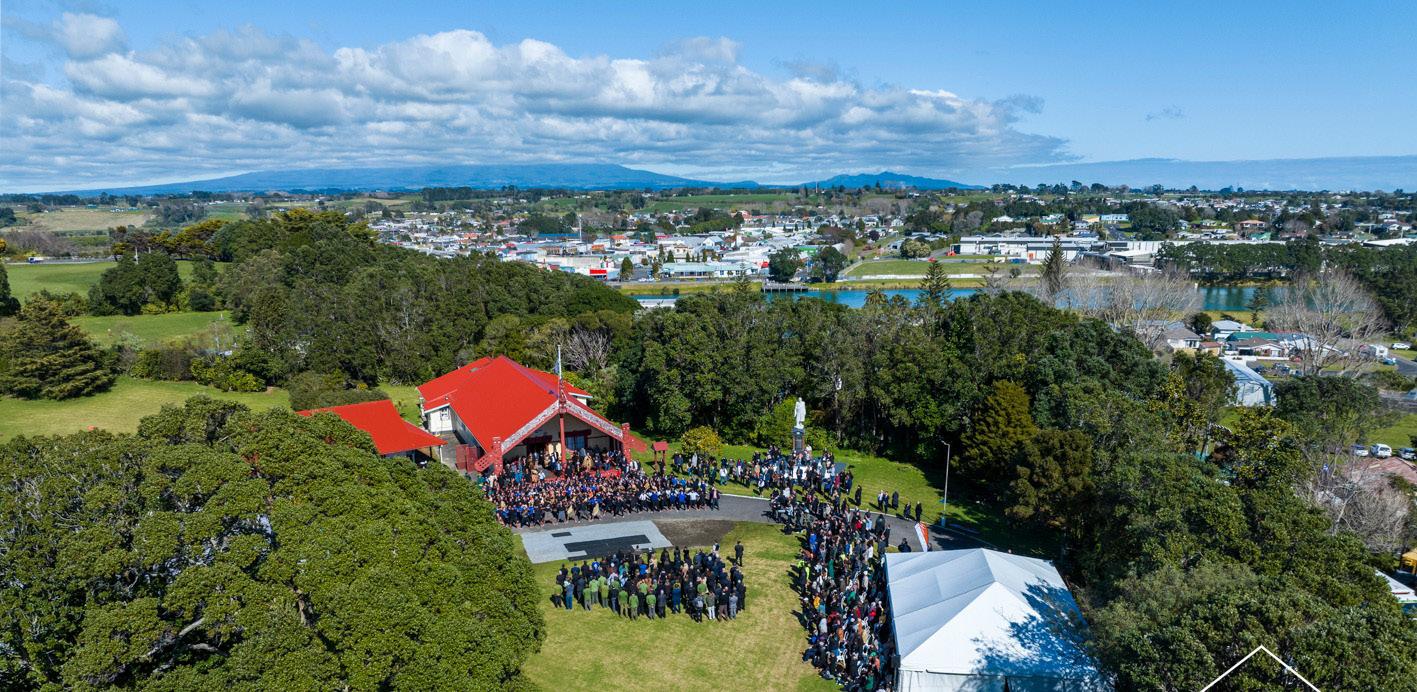
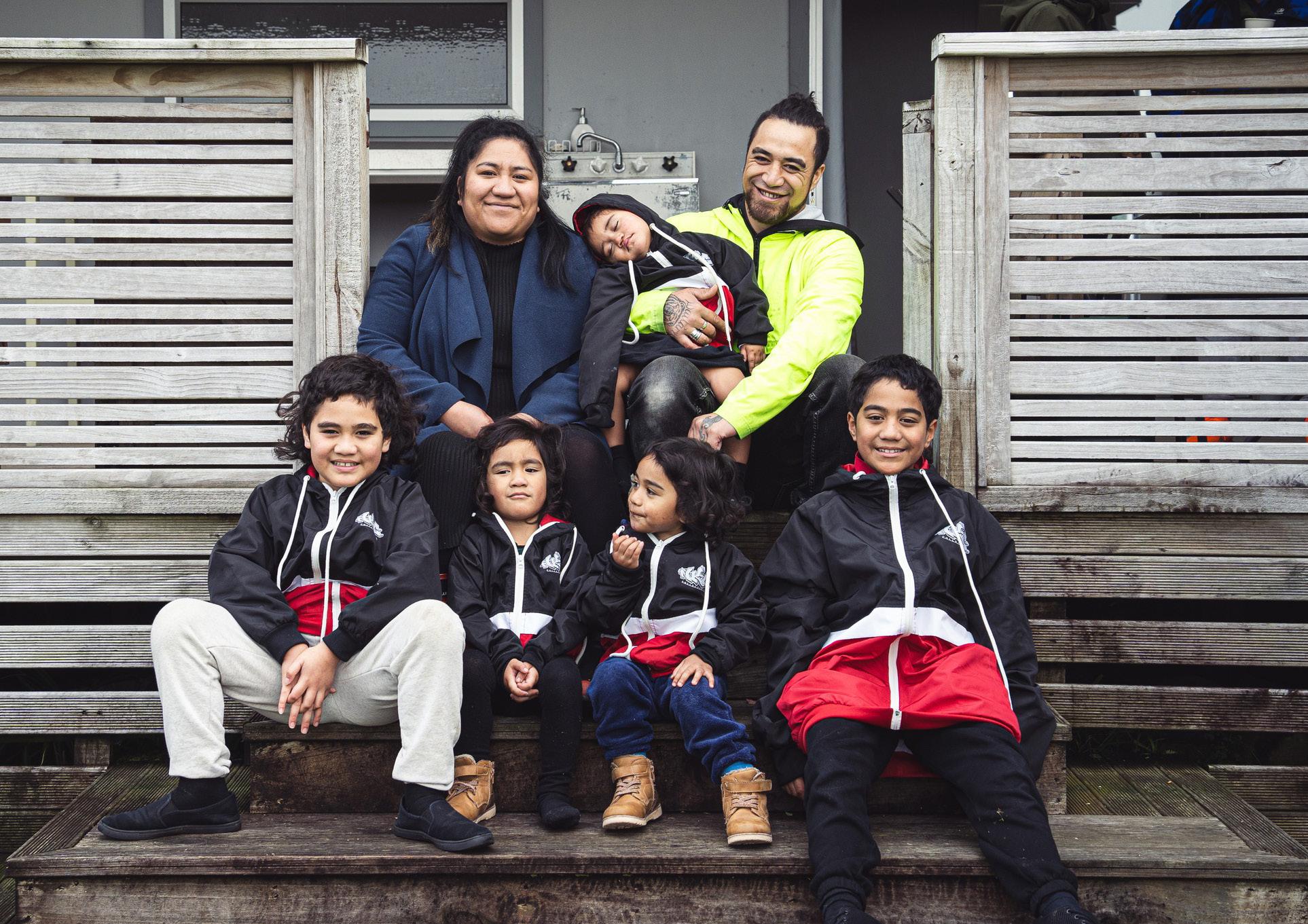
Te Iho Tū, represents our economic development designed to empower our whānau to achieve a greater degree of rangatiratanga over their own lives.
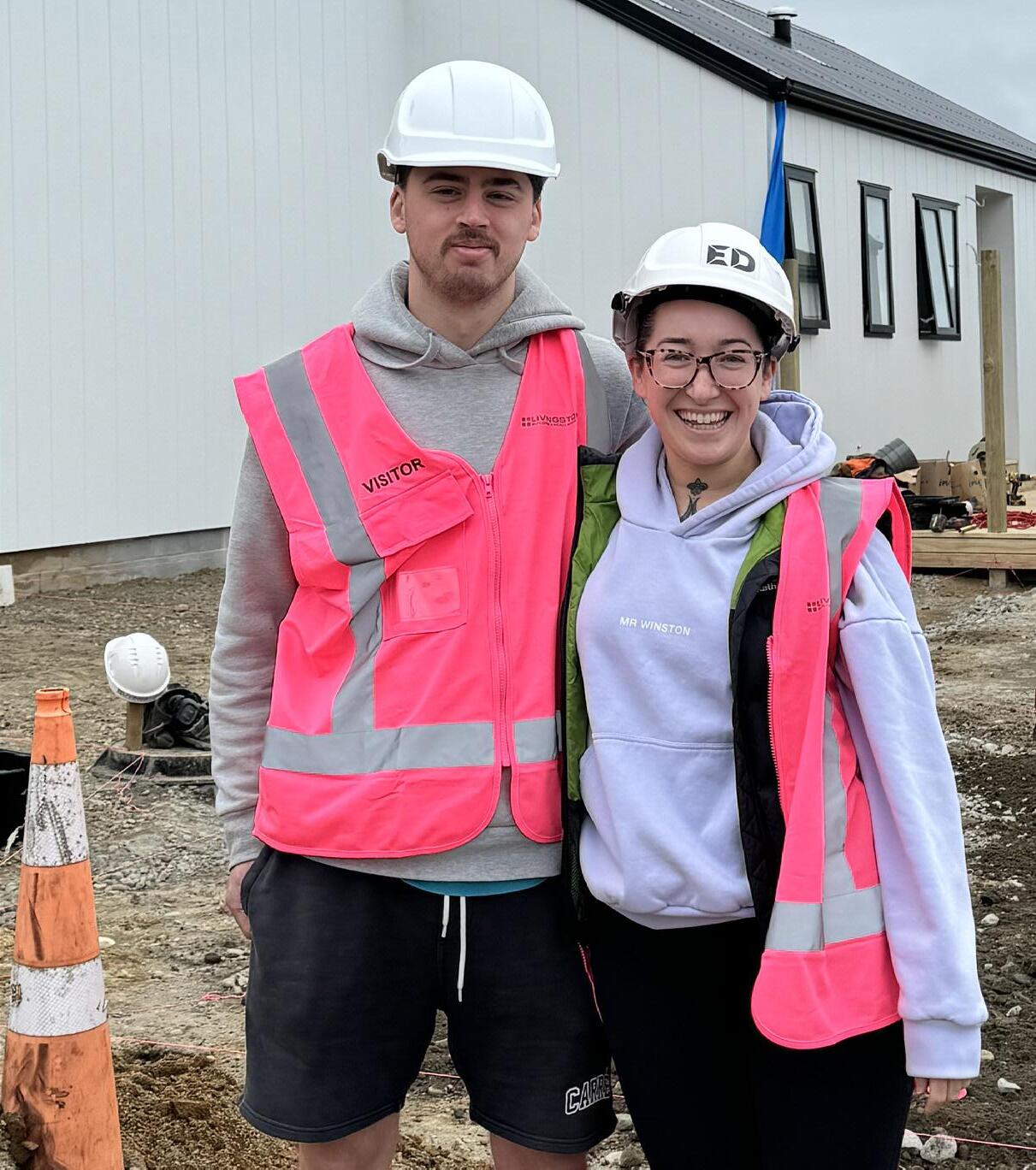
Te Atiawa Iwi Holdings Limited Partnership (TAIHLP) has experienced a remarkable year of growth and achievement in our housing program for 2023/2024. Construction commenced on two significant developments over this past year, Papapounamu (Barrett Street) and Pirikōhatu (Omata Road). These whare offer new and modern living with both home ownership and affordable rental opportunities.
Ka Uruora initiatives continue to support whānau seeking housing in Ngāmotu, Waitara, Te Kohanga Moa (Inglewood), Whanganuia-Tara and Tāmaki Makaurau. Throughout the year, we have had the privilege of welcoming 21 whānau into new or renovated homes, either through direct investment by TAIHLP or in partnership with Ka Uruora.
These initiatives are a testament to our commitment to providing warm, safe and affordable housing for Te Atiawa uri.
A major milestone was reached in June 2024 when TAIHL P committed to developing Ngā Rau Matatiki, our inaugural kaumātua housing project. This development, scheduled for completion in mid-2025, is strategically located at 29 David Street. This site will provide five homes which are within convenient proximity to Taranaki Base Hospital and the Westown shopping centre.
We are proud to support our kaumātua and whānau to move into their own homes and look forward to continuing this important work in the years ahead.

Karlos Ruakere has many titles — a father, a teacher, an actor and now, a homeowner. With the support of Ka Uruora and Te Kotahitanga o Te Atiawa, Karlos was able to purchase a house with a value that goes beyond dollars.
Karlos’s journey with Ka Uruora began at a time when his search for a house was being met with an expensive and unforgiving market. Acquiring a loan was proving difficult even with a mortgage broker unable to find him a lender. Despite frequent dead ends, his dream of a home was just around the corner.
Karlos reluctantly signed up for the Ka Uruora financial literacy course, which delved into the intricacies of buying a house. He now recognises that “the guidance was excellent” and that it was a necessary step towards purchasing a whare.
Karlos was thereafter informed of ownership opportunities, and a Te Atiawa-obtained and renovated townhouse in Te Kōhanga Moa (Inglewood) caught his eye. Through the Ka Uruora shared-equity model, this house was soon to be called his own.
In late March, with his daughter by his side, Karlos obtained the keys to his new home – a defining achievement that transpired from resilience, diligence and perseverance.
Karlos warmly acknowledges the consistent support of Ka Uruora throughout the entire process, from their technical guidance and financial assistance to the fostering of whānaungatanga.
He also highlights that this achievement will continue to prosper in the future as an asset for his children.
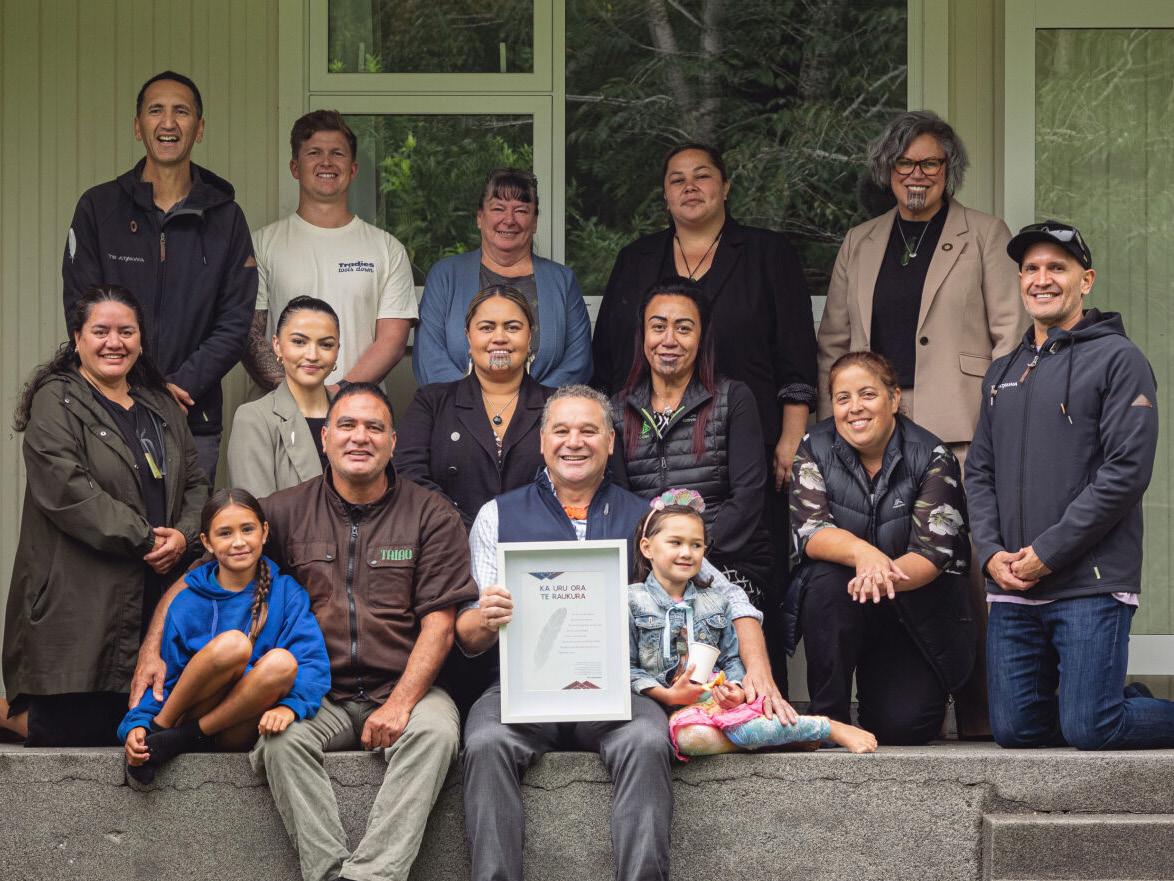
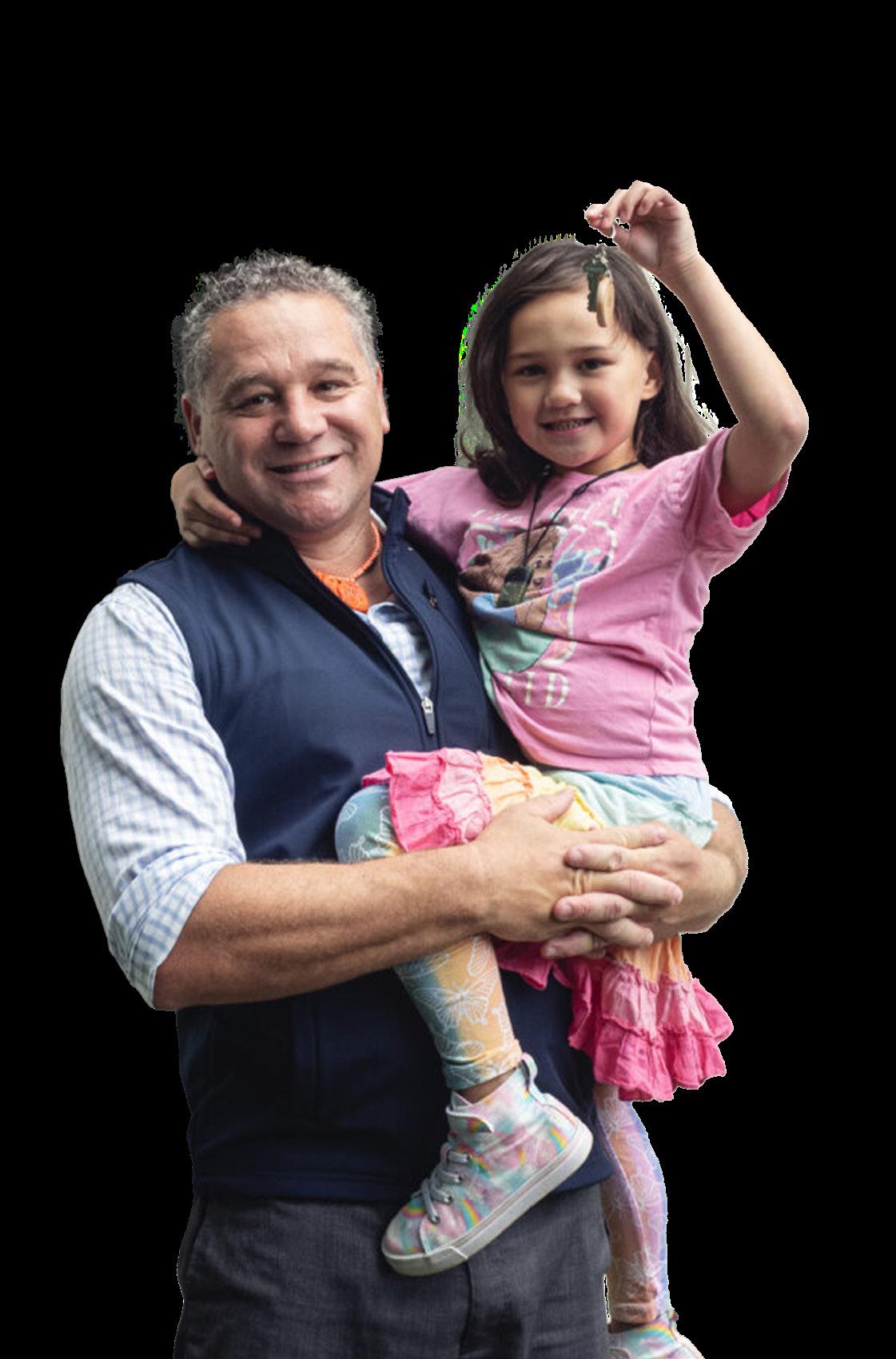
“I know that my investment will grow and that growth will be an investment in my kids,”
Karlos Ruakere
Te Uru Ahupūtea is a Ka Uruora Financial Education Programme that empowers whānau with the knowledge and tools required to achieve homeownership.
Embracing this opportunity was Te Kāhui Ririki, a group of Te Atiawa uri whose experience through the course was both “transformational” and “fun.”
After seeing the benefits of Te Uru Ahupūtea, Te Atiawa uri and kaimahi Matapaepae Urwin decided to seek a group of whānau to get involved. As people jumped on board, interest grew further and soon the rōpu had over 25 members, 4 generations and a lot of personality.
Te Kāhui Ririki participated eagerly over the course’s four-week duration as they learnt about financial-related activities including money systems and plans, spending philosophies and housing pathways.
Matapaepae says that the success of their experience was owing to the whānau-centred approach.
Culminating this approach was having their whānaunga Raymond Tuuta as the Financial Education programme facilitator, whose familiarity and great sense of humour were prized by participants.
Although everyone was in different positions — from people who never considered home ownership to those who already own a home — there was learning for everyone.
Matapaepae describes the course as a journey not only of financial education but of selfdiscovery.
She also acknowledges the transformation she has seen in her whānau since they completed the course.
“Everyone is still talking about the course. Their way of thinking, their way of living has all been impacted by Ka Uruora.”
Ka mau te wehi e whānau mā.
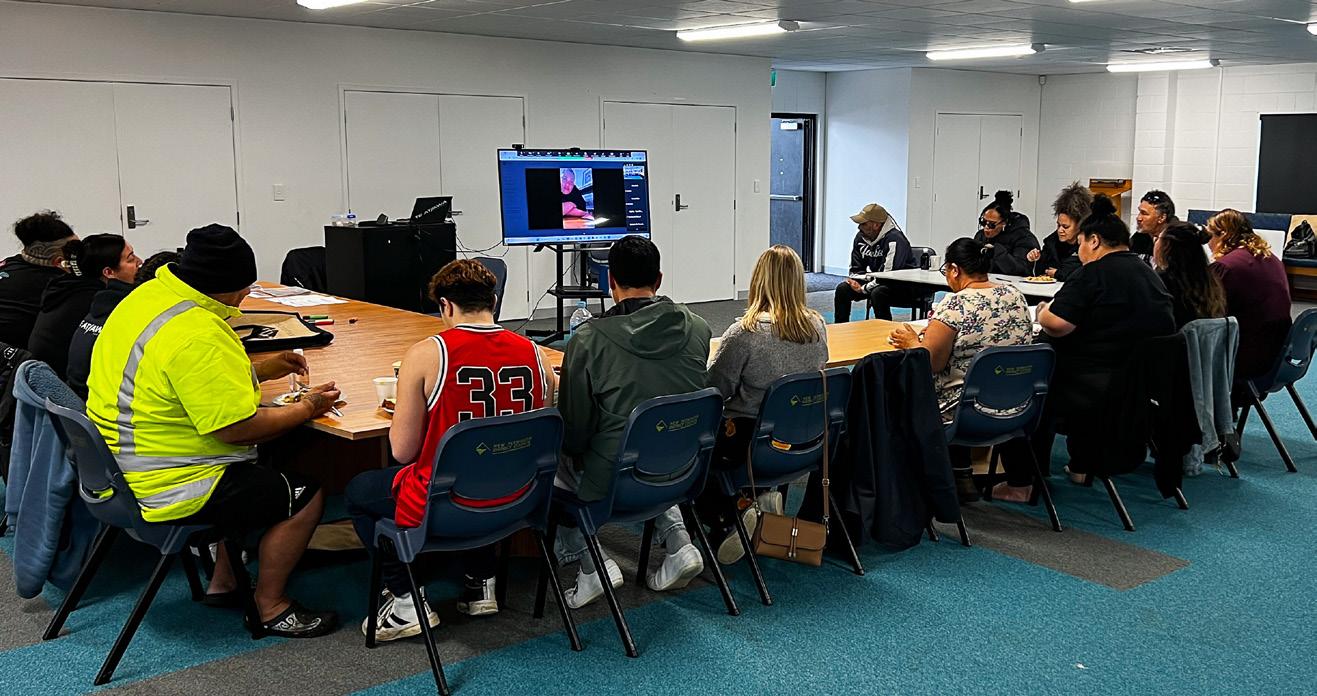
“It was about bringing the whānau together as a collective. We do things all together... it’s that support system that made it what it was,”
Matapaepae
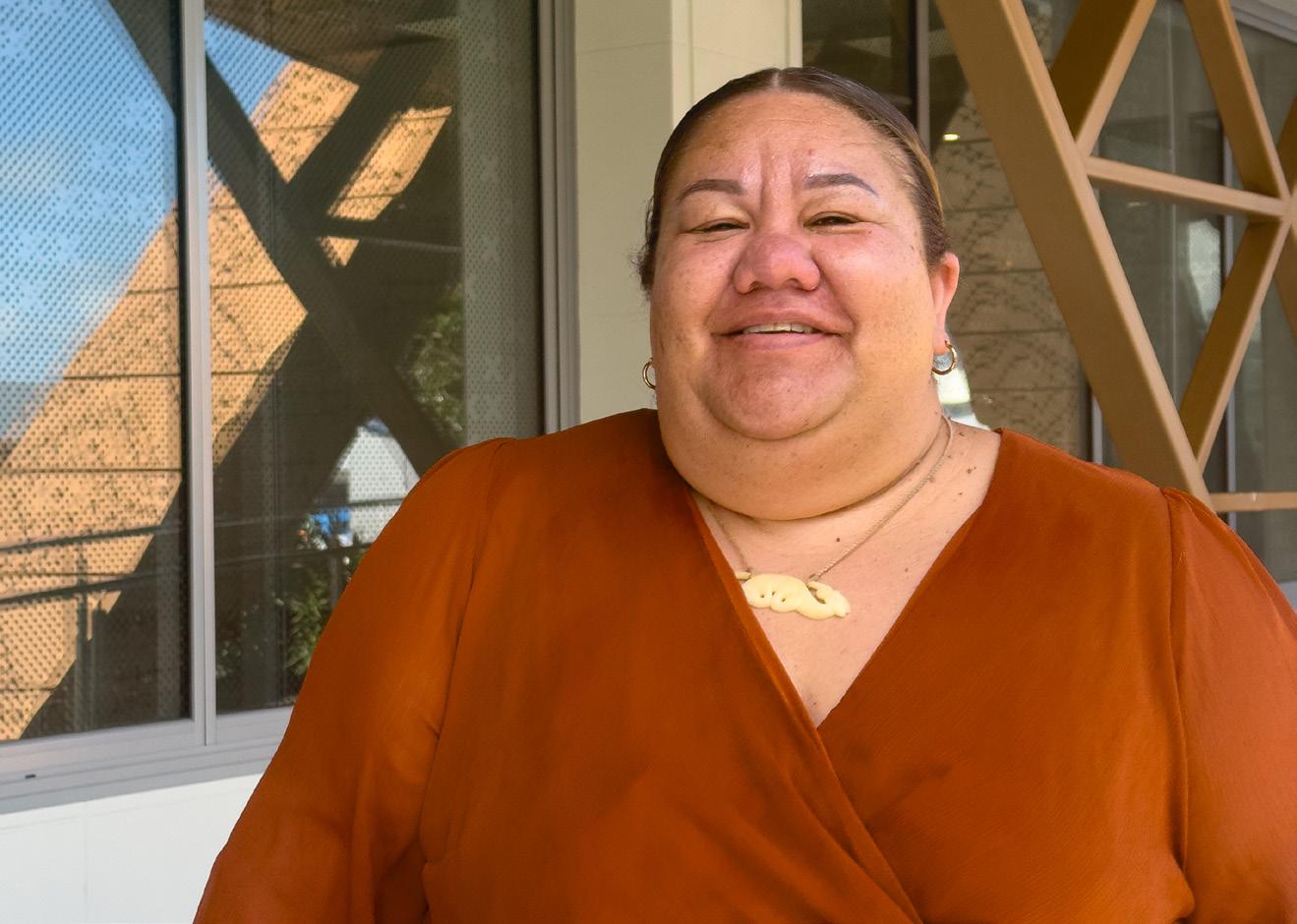
Te Kotahitanga have adopted a Group Procurement policy which aims to promote an increase in total group spend with Te Atiawa and Māori businesses. It forms part of our overall impact approach where we look beyond the grants and distribution programme to ask how we can utilise the full strength of our expenditure and our investments to drive improved outcomes for Te Atiawa and the local Māori economy. As a significant buyer within Taranaki, Te Kotahitanga is in a unique position to support the development of the Māori economy through both our direct spend and by setting the standard of supplier diversity for other buyers in the region to adapt.
Initiatives across the last year include mandating sub-contractor spend with Te Atiawa and Māori businesses as part of our construction activities and reviewing our existing supplier list for opportunities to engage Te Atiawa and Māori owned businesses. Through this, we have increased both the percentage and total group spend with Te Atiawa and Māori businesses from $1.65m (12%) in FY2023 to $2.5m (17%) in FY2024.
An integral activity to all our housing developments is ensuring that appropriate cultural practices are adhered to throughout the build process. Led by Te Poihi Campbell, we work with our local hapū to:
• Undertake karakia on site before development begins
• Ensure that cultural monitors are available during earthworks
• Provide all contractors and subcontractors working on the site with a cultural induction
• Introducing Te Atiawa and the hapū as tangata whenua, the cultural narrative around the site, the name of the development and a discussion around our core values
This is to ensure that everyone working on site can operate safely and in accordance with our values.
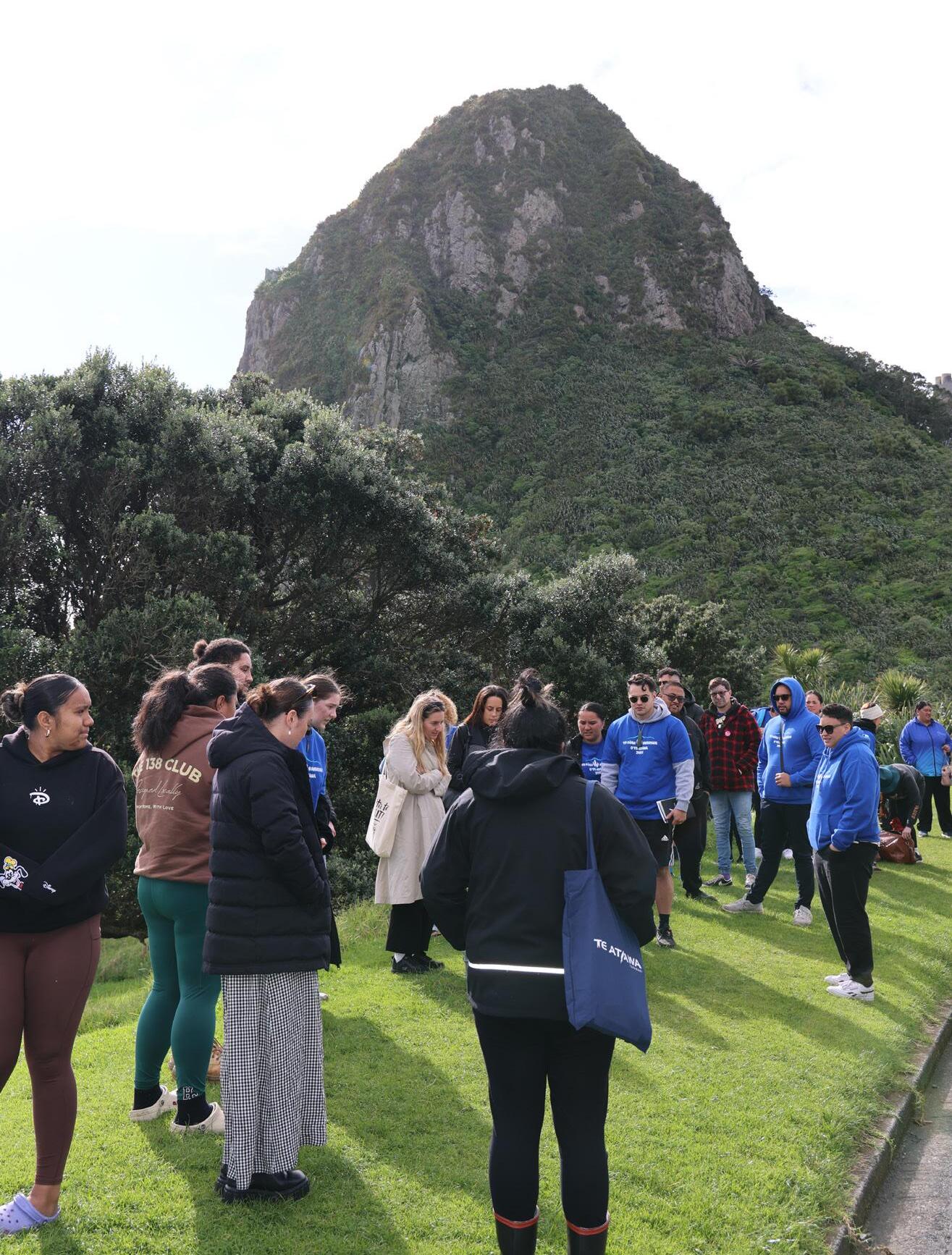
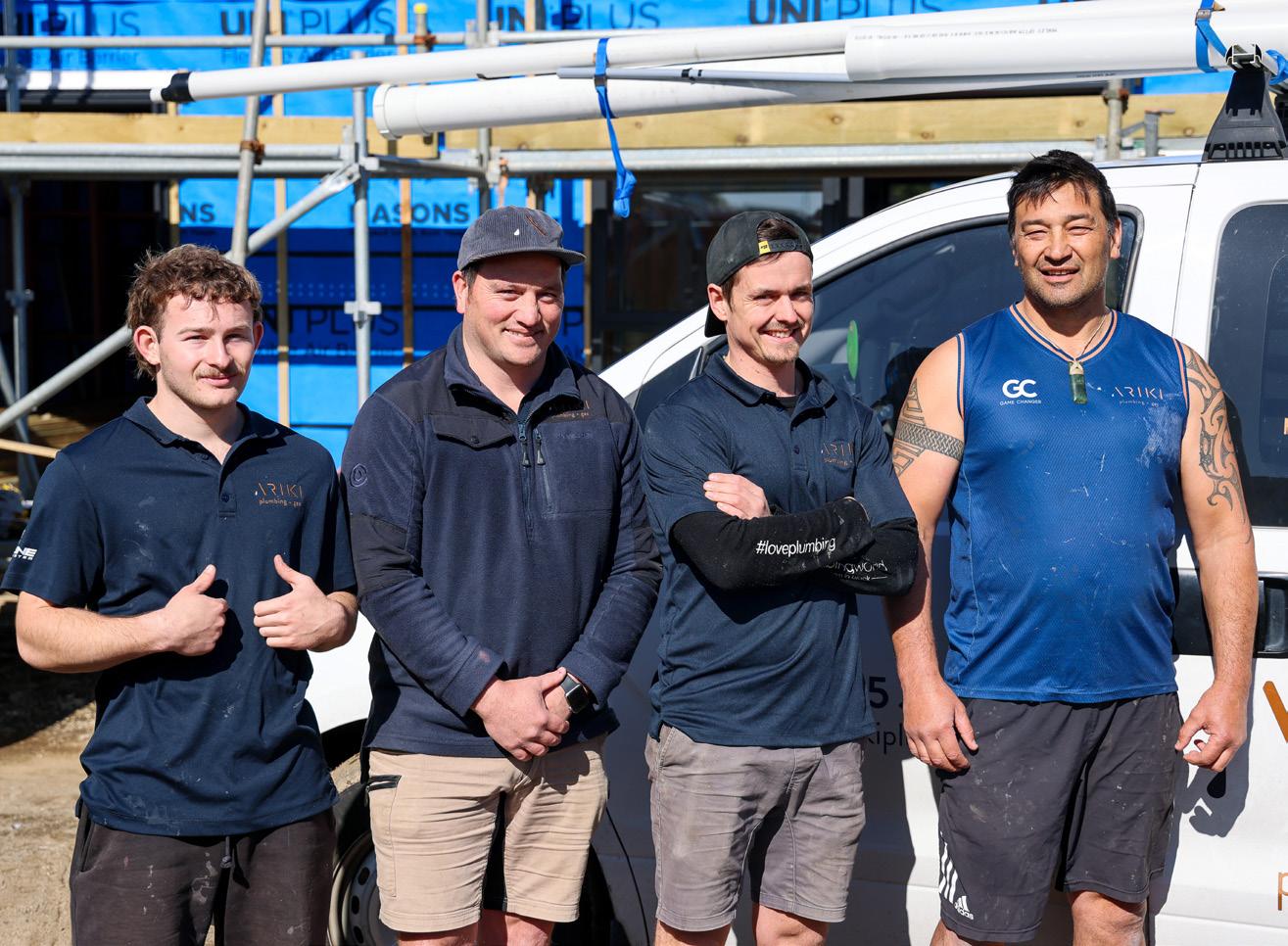
“If you have more of an understanding of the land that we are living and standing on... you end up treating it with a lot more respect”
Dan Brooks
Te Atiawa uri Dan Brooks is the director of Ariki Plumbing and Gas who is undertaking work at the Papapounamu development.
Dan and his team went through a cultural induction before beginning their mahi earlier in the year. During this induction, they gained insight into the area’s history and the name Papapounamu and attended the site’s blessing.
The session was described as one of “great learning,” brimming with important and effective information for the team.
Dan says that the cultural induction set a positive precedent as to how they conduct themselves on-site.
“We’ve been trying to implement throughout the journey of this job that tikanga, that approach, in how we present ourselves, how we engage with people”
Having Ariki Plumbing and Gas as a supplier is also a testament to successfully implementing the Procurement Prioritisation model embedded in the Te Kotahitanga Procurement Policy. The model seeks to provide opportunities for our own Te Atiawa and Māori businesses where practicable and possible. Through this approach,
Te Kotahitanga o Te Atiawa is trying to provide additional outcomes within the housing development sector that reach far beyond the sale or occupation of a whare.
This opportunity has inadvertently created another benefit for Dan. As an uri of Te Atiawa, this has provided not only chance to work for his own, but to reconnect him with his Iwi, whānau, whenua and whakapapa.

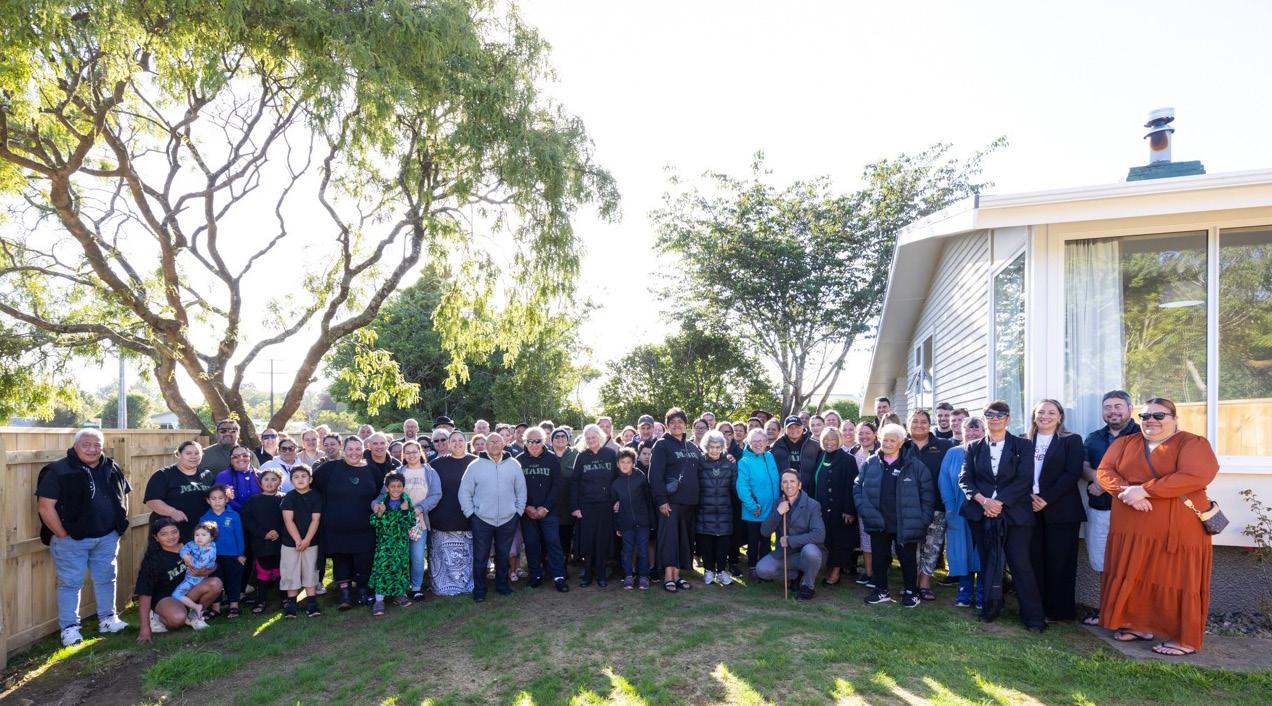
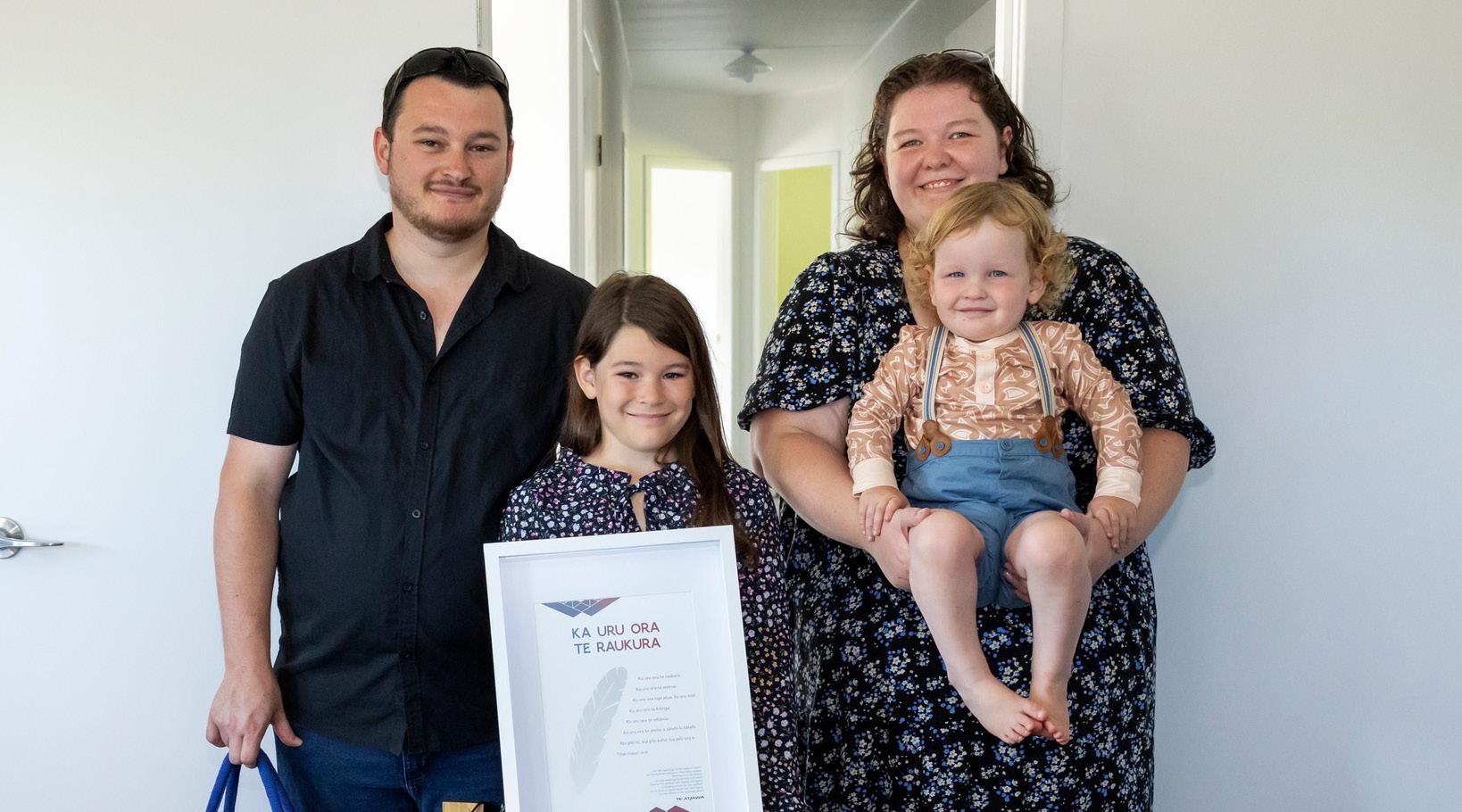
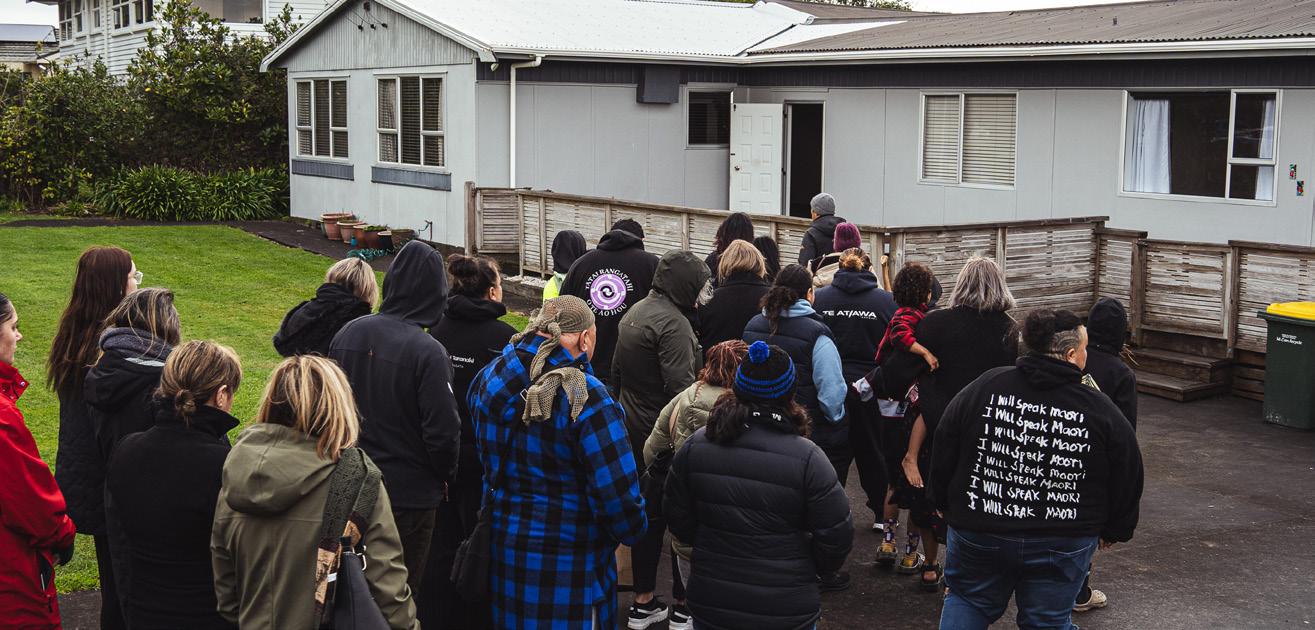
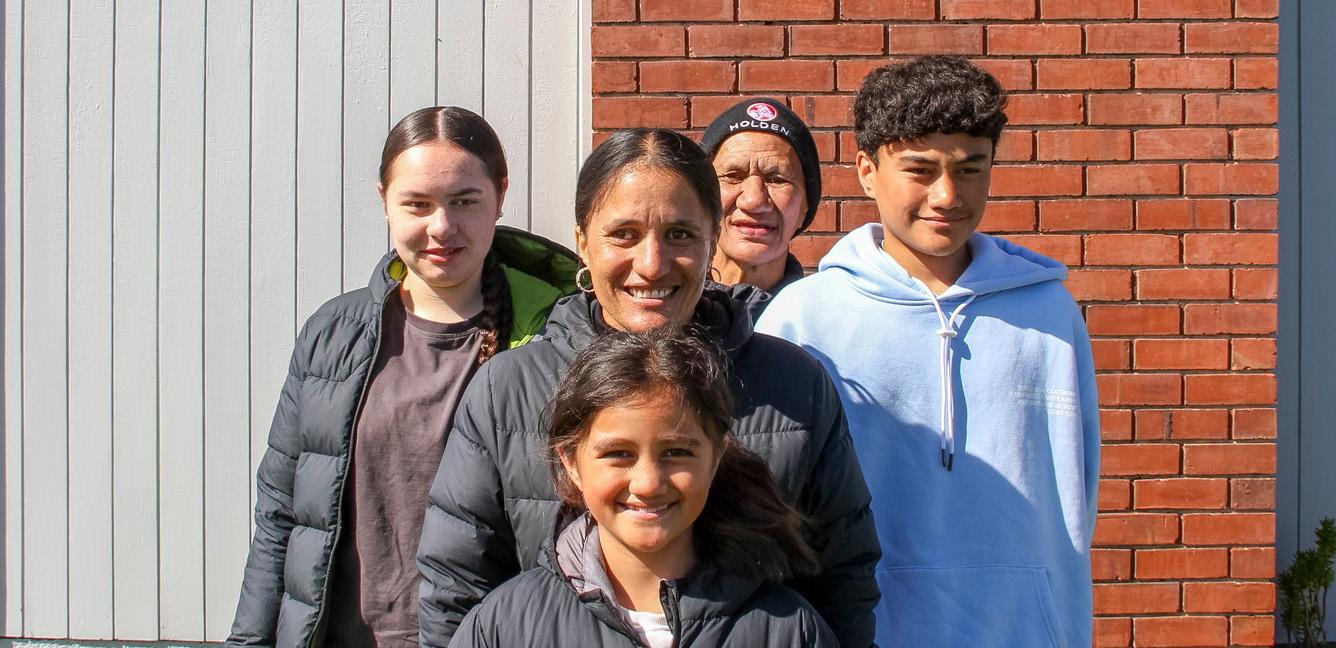
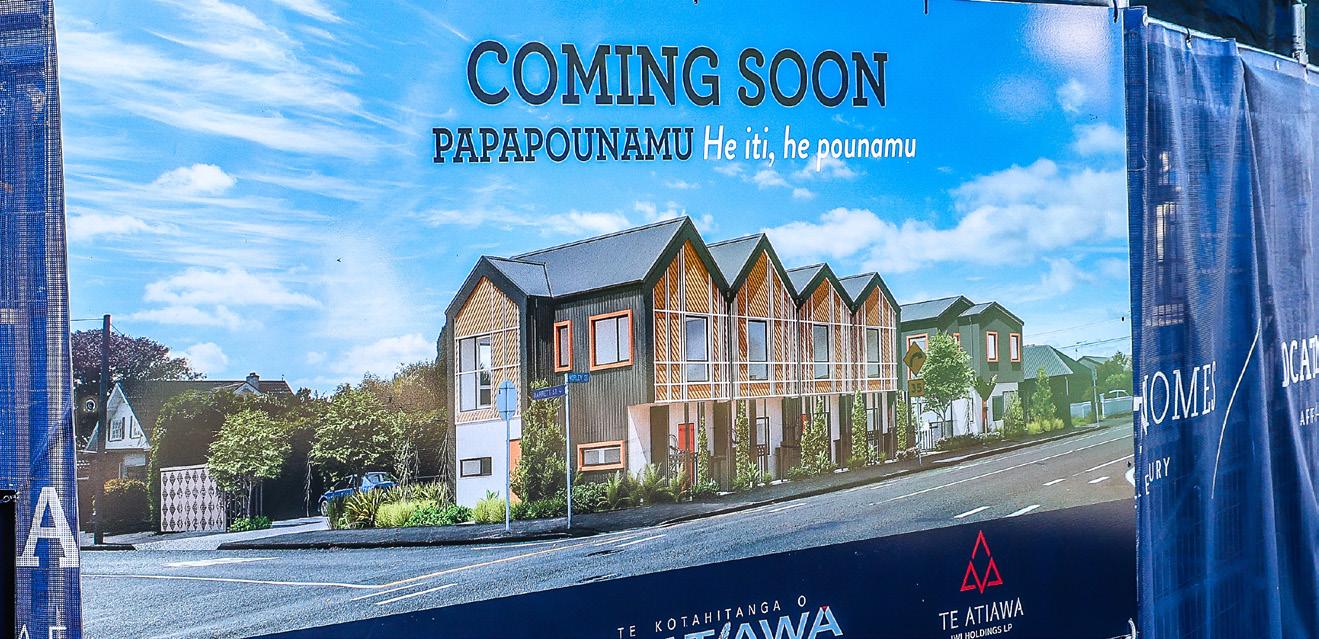
Ka Uruora was established by Te Kotahitanga o Te Atiawa and Te Kāhui o Taranaki to develop collective approaches to addressing housing needs in Taranaki. Whānau have access to three offerings through Ka Uruora:
The success of Ka Uruora in Taranaki has seen the collective grow throughout Aotearoa. Thirteen Iwi participated in the collective as of 30 June 2024, with another three planning to join in 2024/2025.
Our partnership with Ka Uruora means that alongside our housing developments in Taranaki, whānau are also able to access housing outcomes in other regions, with whānau accessing rental properties in Auckland throughout the year with further opportunities in Auckland and Wellington also on the horizon
• Te Uru Ahupūtea - Financial education through the Sorted Kāinga Ora financial literacy programme.
• Te Uru Tahua - WhānauSaver investment scheme, supported by match-funding from participating Iwi organisations.
• Te Uru Kāinga - Access to a range of housing options to support whānau at all stages of life, with the ability to support
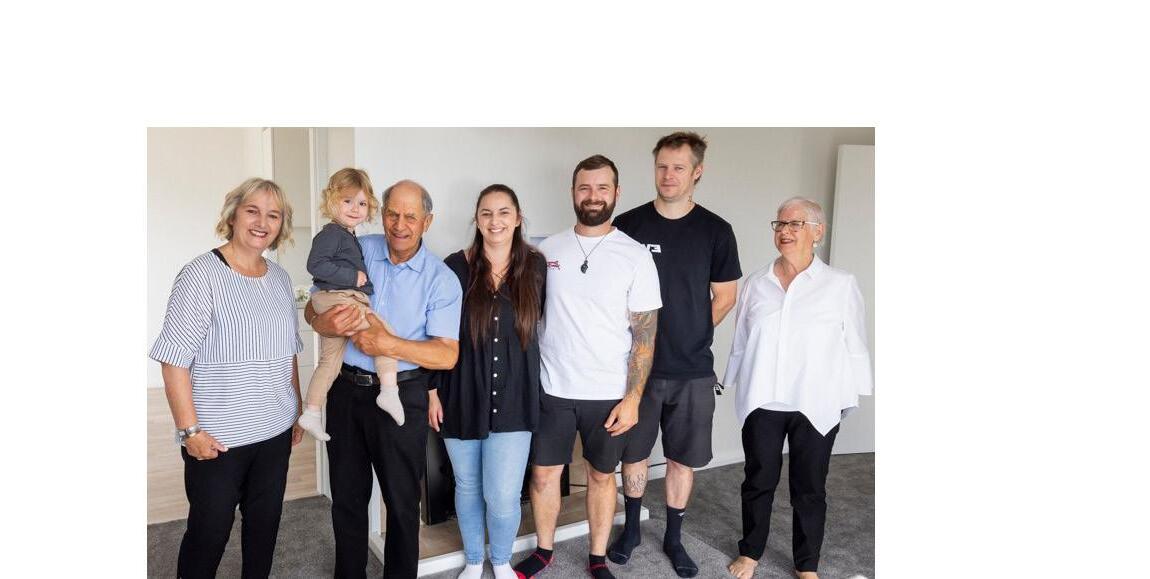
Tamarau nō runga i te rangi, Te Atiawa nō runga i te whenua ue hā! ue hā!
The formal opening of Ngāmotu House on February 24th 2024 was a momentous day for Te Atiawa Iwi and its many hapū. The morning was full of shared pride as we acknowledged that Ngāmotu House is more than just a beautifully designed building – it is a symbol of our restored presence and identity in the heart of the city.
Commencing the official opening ceremony was a group of kaipūoro playing their pūkāea, informing all that had gathered to advance towards the tomokanga. The calls of karanga were delivered in response, followed by karakia and the rhythmic beating of poi by the poi manu team. Whānau involved in the blessing continued to traverse through the building, where these traditional sounds, practices, and protocols transmitted our reverence to the new whare and culminated the special occassion.
To conclude the formal ceremonial process, whānau, hapū and community members gathered for waitata, official speeches, and
kai. The atmosphere was light and joyous as bright horizons radiated from the now officially opened whare.
An open day followed, where whānau were given the opportunity to take a tour of the building and the 5th floor where the office space of Te Kotahitanga resides. We were also joined by three guest speakers, Hemi Sundgren, Barry Te Whatu and Kereama Waru, who had contributed to the Ngāmotu House design. Embedding their heart and souls into the build, these affiliated Te Atiawa artists shared their inspirations and the cultural narratives behind their designs. We are blessed to have such skilled whānau whose expertise shines from the Ngāmotu house onto our community.
Closing the day, a special rākau was planted in the garden at the front of Ngāmotu House. This rākau represents new life and new beginnings, as Ngāmotu House becomes not only a cultural hub, but a monumental landmark.
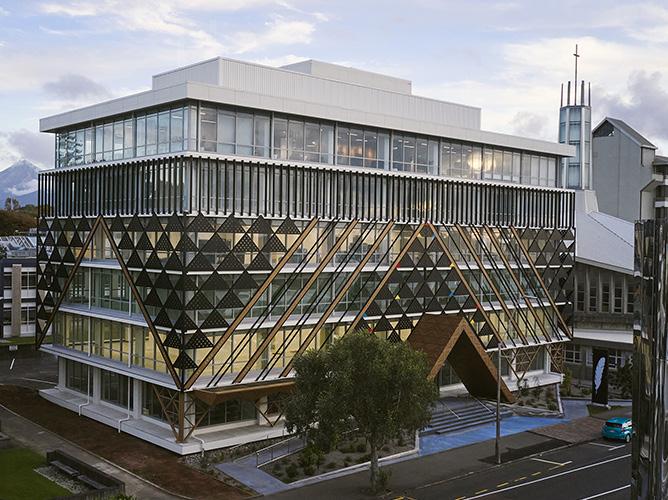


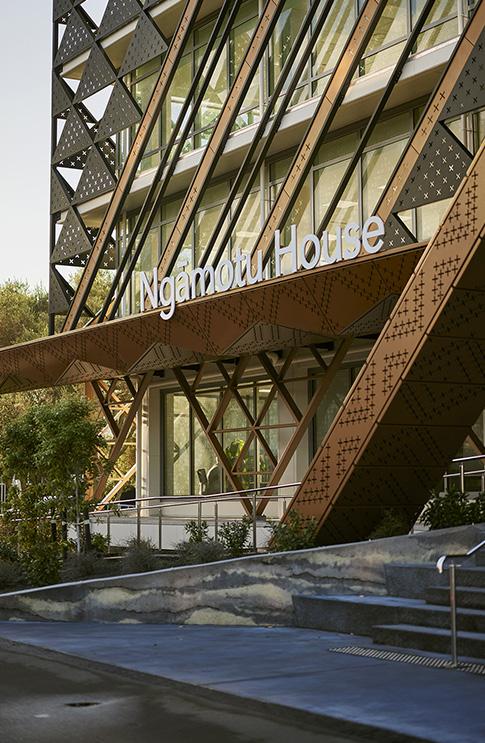

The Raukura stands as a pou outside the entrance of the Ngāmotu House
The Raukura symbolises the close connection that Te Atiawa Iwi have with the Parihaka movement, and our inherited whakapapa links with the leaders of this movement, Tohu Kākahi and Te Whiti o Rongomai
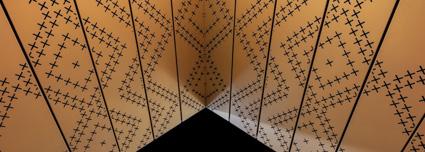
The tomokanga of the Ngāmotu House welcomes our whānau
The tomokanga (entranceway) of the Ngāmotu House represents Taranaki maunga. It also highlights the dominant triangle motif, niho taniwha, that has been integrated throughout the building’s overall design.
Nau mai e te ao awatea ka uru, ka rawe hei mua! Whakaoho e taku takapou, whakaoho a Ngāmotu House ki te whai ao, ki te ao mārama. Tihei mouri ora.
The unveiling of Ngāmotu House opened a new chapter for Te Kotahitanga o Te Atiawa that restores our whakapapa and reclaims our local history and our identity. Standing staunchly in the New Plymouth CBD, in the hapū territory of Ngāti Te Whiti, Ngāmotu House serves as a central hub for Taranaki and Māori businesses.
Previously named the Atkinson Building, this six-story commercial building was bought by Te Kotahitanga in 2018. An extensive transformation took place over a nine-month period where the building was strengthened and completely refurbished.
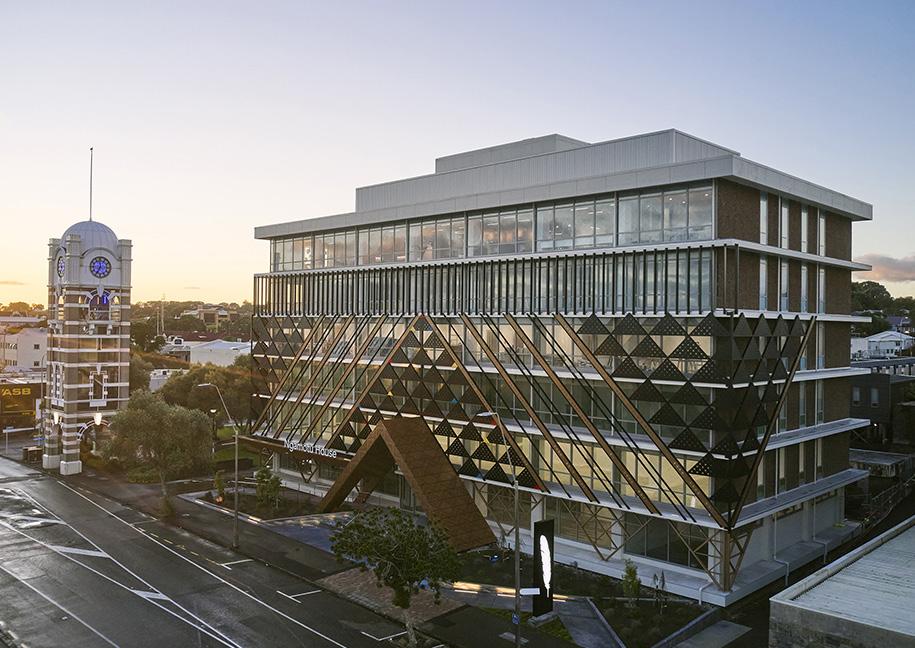
Te Kotahitanga and Ngāti Te Whiti worked alongside Boon Architects to design the building with Te Atiawa cultural narratives weaved throughout. The building’s design elements - patterns, shapes, colours, and structure – honours our whenua, our tupuna, our hapori and denotes our values.
The building’s name, Ngāmotu House, pays homage to an old hapū of the area that preceded Ngāti Te Whiti. It also refers to the culturally significant islands of Ngā Motu and is now commonly used as a name for the New Plymouth area.
“Ngāmotu House is a visual expression of commitment to whakapapa, to each other, and to our past,” says Hemi Sundgren, Cultural Advisor for the Ngāmotu House.


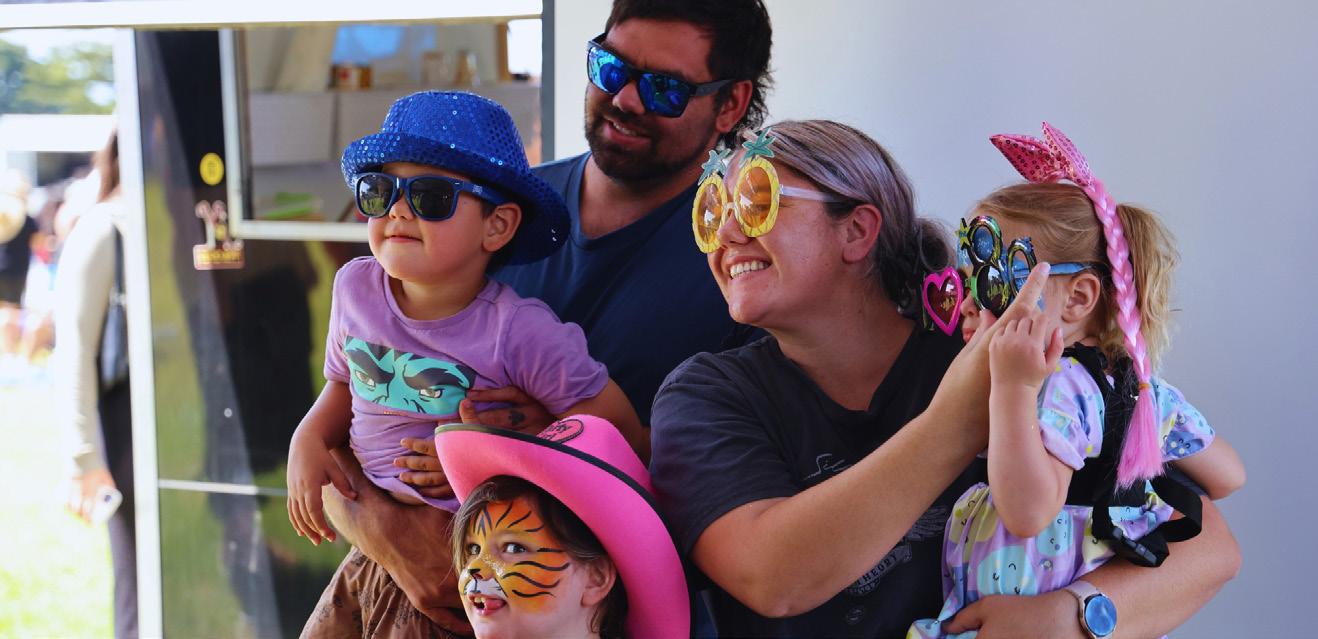
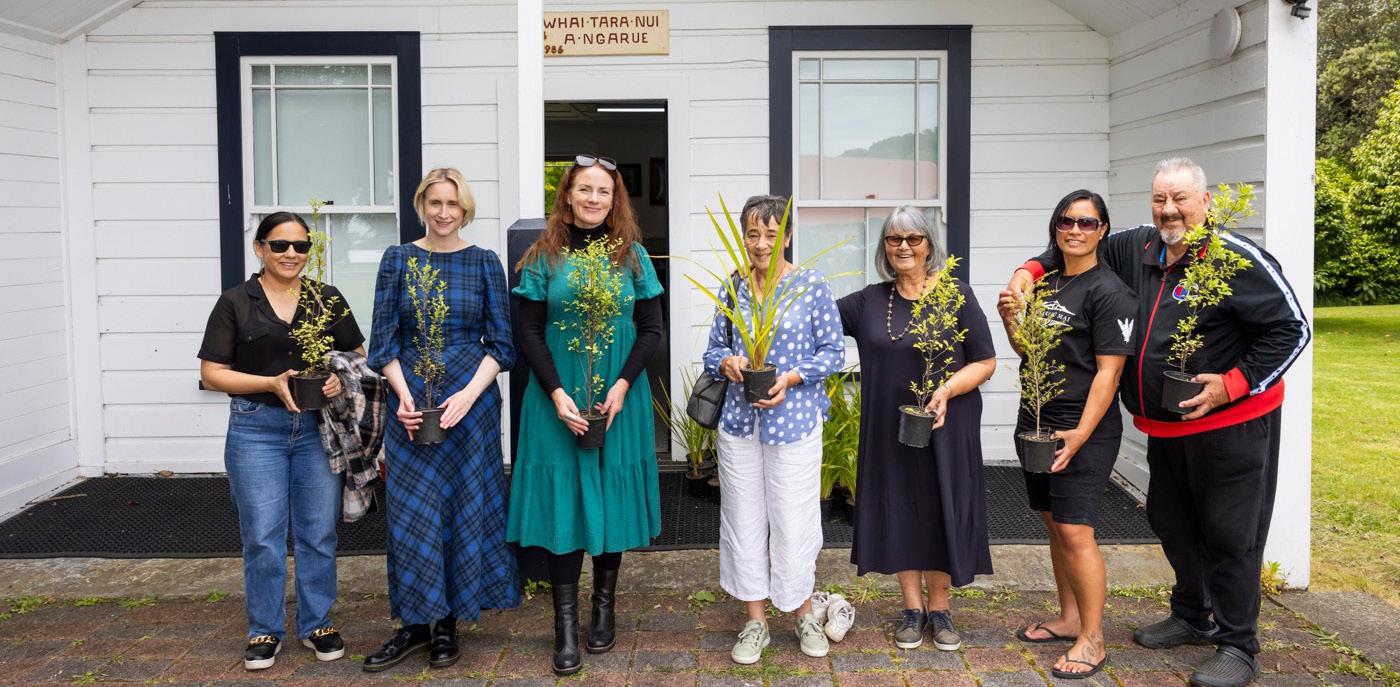
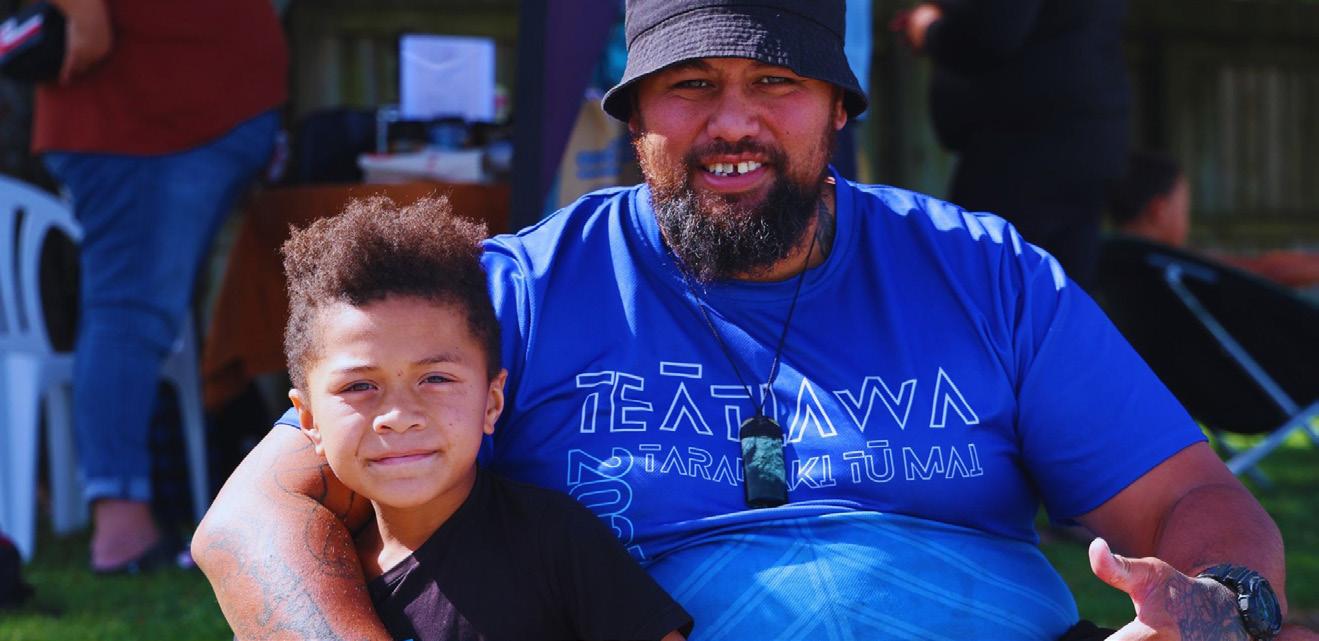

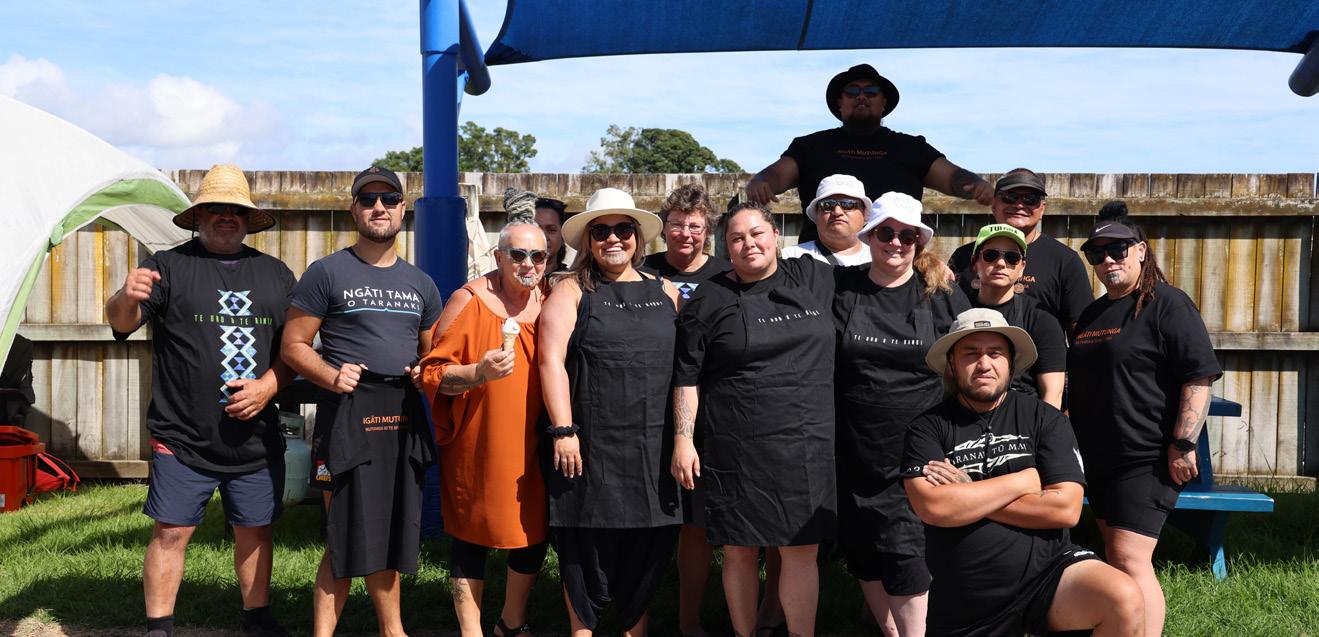
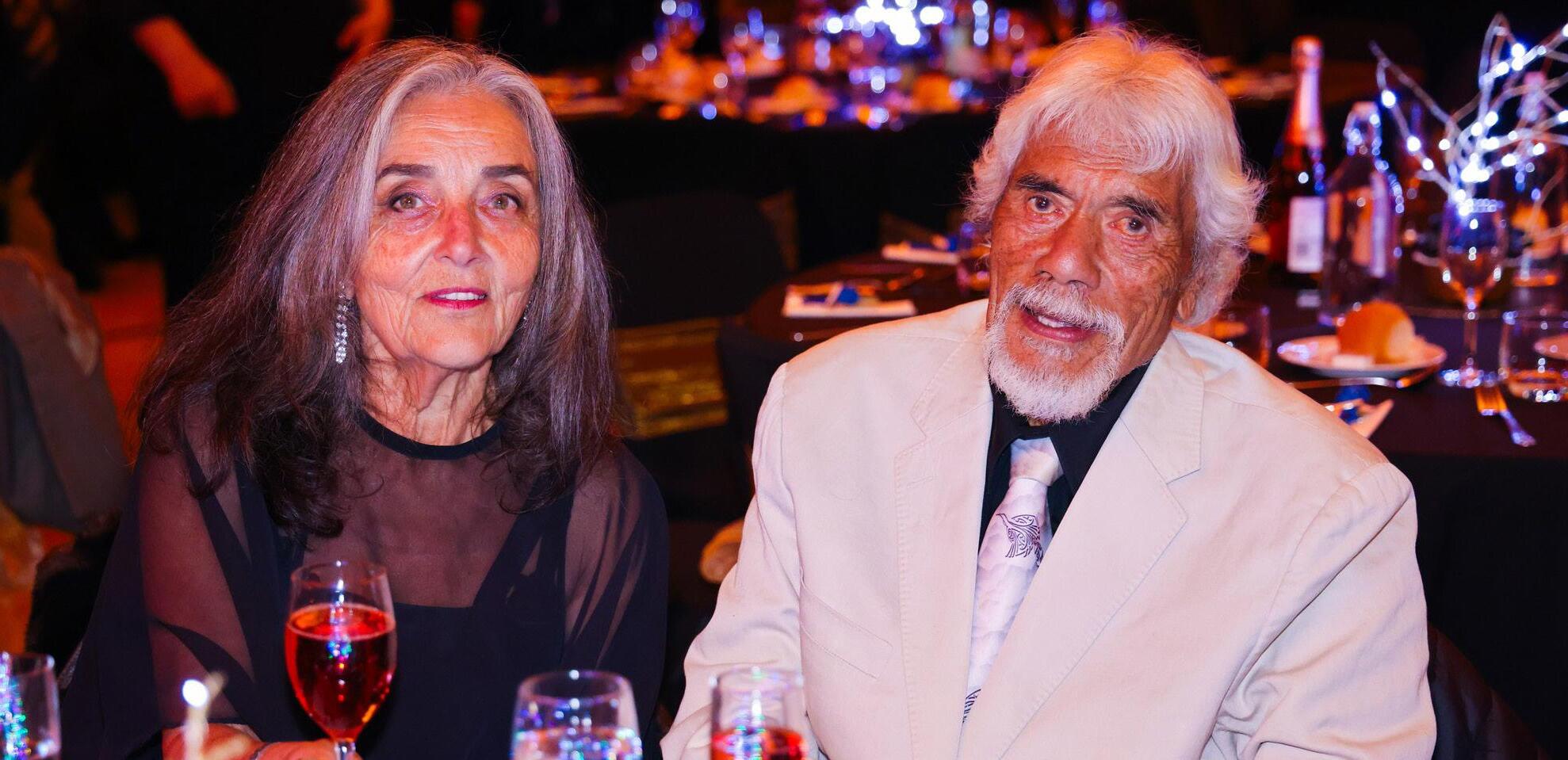

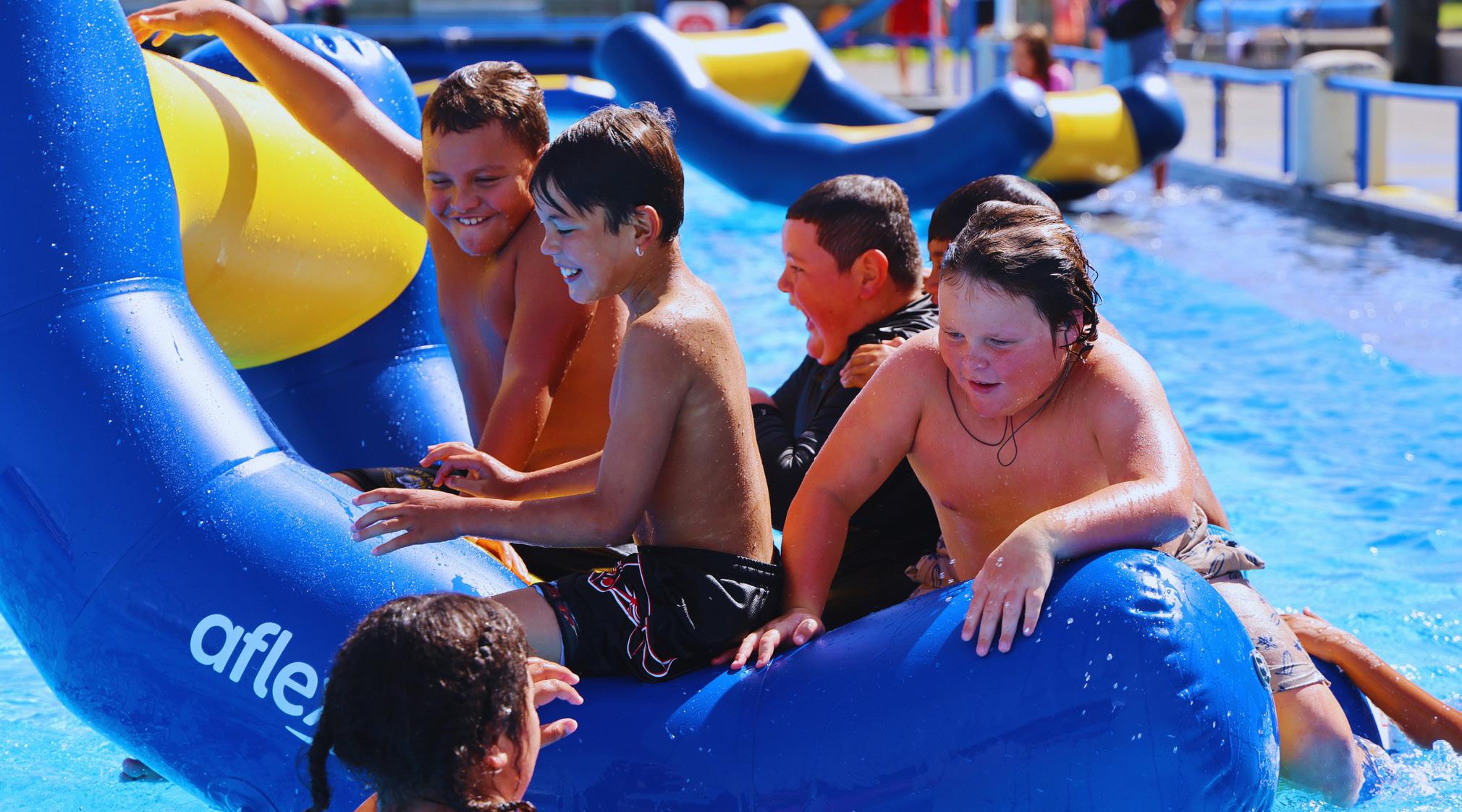


To the Trustees of Te Kotahitanga o Te Atiawa Trust
Opinion

52 to 80
We have audited the consolidated financial statements of Te Kotahitanga o Te Atiawa Trust (the Group) on pages 5 to 27, which comprise the consolidated statement of financial position as at 30th June 2024, and the consolidated statement of comprehensive income, consolidated statement of changes in equity and consolidated statement of cash flows for the year then ended, and notes to the consolidated financial statements, including material accounting policy information.
In our opinion, the accompanying consolidated financial statements present fairly, in all material respects, the consolidated financial position of the Group as at 30th June 2024, and its consolidated financial performance and its consolidated cash flows for the year then ended in accordance with New Zealand equivalents to International Financial Reporting Standards (NZ IFRS) Reduce Disclosure Regime.
We conducted our audit in accordance with International Standards on Auditing (New Zealand) (ISAs (NZ)). Our responsibilities under those standards are further described in the Auditor’s Responsibilities for the Audit of the Financial Statements section of our report. We are independent of the Group in accordance with Professional and Ethical Standard 1 International Code of Ethics for Assurance Practitioners (including International Independence Standards) (New Zealand) issued by the New Zealand Auditing and Assurance Standards Board and the International Ethics Standards Board for Accountants’ International Code of Ethics for Professional Accountants (including International Independence Standards) (IESBA Code), and we have fulfilled our other ethical responsibilities in accordance with these requirements and the IESBA Code. We believe that the audit evidence we have obtained is sufficient and appropriate to provide a basis for our opinion
Other than in our capacity as auditor we have no relationship with, or interests in, the Trust or any of its subsidiaries.
The trustees are responsible on behalf of the Group for the other information. The other information comprises the annual report but does not include the financial statements and our auditor’s report thereon.

Our opinion on the consolidated financial statements does not cover the other information and we do not express any form of assurance conclusion thereon.
In connection with our audit of the consolidated financial statements, our responsibility is to read the other information and, in doing so, consider whether the other information is materially inconsistent with the financial statements or our knowledge obtained in the audit or otherwise appears to be materially misstated. If based, on the work we have performed, we conclude that there is a material misstatement of this other information, we are required to report that fact. We have nothing to report in this regard.
The Trustees are responsible on behalf of the Group for the preparation and fair presentation of the consolidated financial statements in accordance with NZ IFRS RDR, and for such internal control as the Trustees determine is necessary to enable the preparation of consolidated financial statements that are free from material misstatement, whether due to fraud or error.
In preparing the consolidated financial statements, the Trustees are responsible on behalf of the Group for assessing the Group’s ability to continue as a going concern, disclosing, as applicable, matters related to going concern and using the going concern basis of accounting unless the Trustees either intend to liquidate the Group or to cease operations, or have no realistic alternative but to do so.
Our objectives are to obtain reasonable assurance about whether the consolidated financial statements as a whole are free from material misstatement, whether due to fraud or error, and to issue an auditor’s report that includes our opinion. Reasonable assurance is a high level of assurance, but is not a guarantee that an audit conducted in accordance with ISAs (NZ) will always detect a material misstatement when it exists. Misstatements can arise from fraud or error and are considered material if, individually or in the aggregate, they could reasonably be expected to influence the economic decisions of users taken on the basis of these consolidated financial statements.
A detailed description of the auditors’ responsibilities including those related to assessment of risk of material misstatement, evaluation of appropriateness of going concern assumptions and determining key audit matters are available on the external reporting board website: http://www.xrb.govt.nz/standards-for-assurance-practitioners/auditors-responsibilities/audit-report-7/

This report is made solely to the Trustees, as a body. Our audit has been undertaken so that we might state to the Trustees those matters we are required to state to them in an auditor’s report and for no other purpose. To the fullest extent permitted by law, we do not accept or assume responsibility to anyone other than the Trustees, as a body, for our audit work, for this report, or for the opinions we have formed.

Date: 25th October
Te Kotahitanga o Te Atiawa Group
For the year ended 30 June 2024
Nature of Business
Investment for the purposes of providing benefits and opportunities for Te Atiawa Iwi
Beneficiaries
Members of Te Atiawa iwi

This entity is comprised of Te Kotahitanga o Te Atiawa Trust, Te Atiawa Iwi Holdings Limited Partnership, Te Atiawa (Taranaki)
Holdings Limited and Te Atiawa Iwi Charitable Trust. All entities are domiciled in New Zealand.
Te Kotahitanga o Te Atiawa Trust is governed by a board of seven trustees. Te Atiawa Iwi Charitable Trust is governed by 7 Directors of the Corporate Trustee (Te Atiawa Iwi Trustee Limited). The Limited Partnership and Company are governed by a board of five directors.
Trustees of Te Kotahitanga o Te Atiawa are the appointed Directors of the Corporate Trustee.
Trustees
Liana Poutu - Chair
Damon Ritai - Deputy Chair
Wharehoka Wano
Shelley Kopu
Kim Skelton
Howard Tamati
Anaru White
Directors
Mark Tume - Chair
Liana Poutu
Tanya Skelton
Adrian Taylor
Mike Pohio (Retired 30 April 2024)
Tristram van der Meijden (Appointed 10 June 2024)
Rachel Winder (Appointed 10 June 2024)
Entity Structure Consolidated Financial Statements | Te Kotahitanga o Te Atiawa Group six
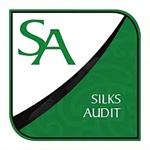
Bankers
ASB Bank Limited (ASB)
Australia New Zealand Banking Group (ANZ)
Bank of New Zealand (BNZ)
TSB Bank Limited (TSB)
Solicitors
Kahui Legal
Govett Quilliam
Whaia Legal
Greenwood Roche
Chartered Accountant Auditors
Vanburwray Chartered Accountants Limited
Silks Audit Chartered Accountants Limited
Registered Address
Ngāmotu House - Level 5, 139 Devon Street West, New Plymouth, 4310
P O Box 1097, Taranaki Mail Centre, New Plymouth, 4340

Te Kotahitanga o Te Atiawa Group For the year ended 30 June 2024


Te Kotahitanga o Te Atiawa Group For the year ended 30 June 2024

Te Kotahitanga o Te Atiawa Group As at 30 June 2024




Te Kotahitanga o Te Atiawa Group
For the year ended 30 June 2024
Cash Flows from Operating Activities
(595,962)
Charitable Distributions / Donations (1,708,564) (2,779,455)
Total Cash was applied to (6,216,417) (13,466,420)
Total Cash Flows from Operating Activities 1,519,936 (9,076,337)
Cash Flows from Investing Activities
Cash
Total Cash was received from 9,022,367 1,654,272 Cash was applied to
Investing in short term investments - 15,338,012
Investment in direct investments (4,791,675) (1,970,223)
Investment in other investments - (100,000)
Investing in investment property (7,541,763) (10,142,761)
Payments to acquire property, plant and equipment (1,740,645) (1,341,446)
Total Cash was applied to (14,074,083) 1,783,583
Total Cash Flows from Investing Activities (5,051,716) 3,437,855
Net Increase/ (Decrease) in Cash (3,531,780) (5,638,482)
Cash Balances
Cash and cash equivalents at beginning of period 10,392,787 16,031,269 Cash and cash equivalents at end of period 6,861,007 10,392,787
Net change in cash for period (3,531,780) (5,638,482)

Te Kotahitanga o Te Atiawa Group
For the year ended 30 June 2024
Te Kotahitanga o Te Atiawa Group comprises Te Kotahitanga o Te Atiawa Trust, Te Atiawa Iwi Holdings Limited Partnership, Te Atiawa (Taranaki) Holdings Limited and Te Atiawa Iwi Charitable Trust.
Te Kotahitanga o Te Atiawa Trust (Te Kotahitanga) is a trust established by a trust deed on 31 March 2014 and is subject to the Trusts Act 2019. Te Atiawa Iwi Holdings Limited Partnership (TAIHLP) is a limited partnership registered on 20 May 2016 and is subject to the Limited Partnership Act 2008. Te Atiawa (Taranaki) Holdings Limited is a company incorporated under the Companies Act 1993. Te Atiawa Iwi Charitable Trust is domiciled in New Zealand and is a charitable organisation registered under the Charitable Trusts Act 1957 and the Charities Act 2005.
The financial statements comprising Te Kotahitanga o Te Atiawa Group are presented for the year ended 30 June 2024.
These financial statements and the accompanying notes summarise the financial results of activities carried out by Te Kotahitanga o Te Atiawa Group. Te Kotahitanga is engaged in the business of investment for the purposes of providing benefits and opportunities to Te Atiawa Iwi.
These financial statements have been approved and were authorised for issue by the Board of Trustees.
The purpose and responsibilities of the Te Kotahitanga as outlined in the Trust Deed is to receive, hold, manage and administer the settlement assets received on behalf of ngā uri o Te Atiawa.
The Group has adopted the New Zealand equivalents to International Financial Reporting Standards - Reduced Disclosure Regime (“NZ IFRS – RDR”) as set out in the External Reporting Board’s “Accounting Standards Framework”.
The financial statements are general purpose financial statements that have been prepared in accordance with Generally Accepted Accounting Practice in New Zealand (“NZGAAP”). They comply with New Zealand equivalents to International Financial Reporting Standards (“NZ IFRS”) and other applicable financial reporting standards as appropriate for profit-oriented entities. The group has elected to report under NZ IFRS – Reduced Disclosure Regime of the External Reporting Board as the company is a for-profit Tier 2 entity for financial reporting purposes on the basis that it does not have public accountability and is a large for-profit public sector entity. The financial statements have been prepared in accordance with the requirements of the Limited Partnership Act 2008, Companies Act 1993 and the Financial Reporting Act 2013.


These financial statements have been prepared on a historical cost basis. The financial statements are presented in New Zealand dollars (NZ$) and all values are rounded to the nearest NZ$, except when otherwise indicated.
The consolidated financial statements comprise the Te Kotahitanga o Te Atiawa Trust (Te Kotahitanga), Te Atiawa Iwi Holdings Limited Partnership (Limited Partnership), Te Atiawa (Taranaki) Holdings Limited (Fisheries Holdings) and Te Atiawa Iwi Charitable Trust (Charitable Trust).
There were no changes in accounting policies during the year.
The Group presents assets and liabilities in the statement of financial position based on current/non-current classification.
An asset is current when it is:
• Expected to be realised or intended to be sold or consumed in normal operating cycle
• Held primarily for the purpose of trading
• Expected to be realised within twelve months after the reporting period, or
• Cash or cash equivalent unless restricted from being exchanged or used to settle a liability for at least twelve months after the reporting period.
All other assets are classified as non-current.
A liability is current when:
• It is expected to be settled in a normal operating cycle
• It is held primarily for the purpose of trading
• It is due to be settled within twelve months after the reporting period, or
• There is no unconditional right to defer the settlement of the liability for at least twelve months after the reporting period.
Te Kotahitanga classifies all other liabilities as non-current
Deferred tax assets and liabilities are classified as non-current assets and liabilities.

All amounts are stated exclusive of goods and services tax (GST) except for accounts payable and accounts receivable which are stated inclusive of GST.
The net amount of GST receivable from, or payable to the Inland Revenue is included as part of the receivables or payables in the statement of financial position.
A financial asset not carried at fair value through profit or loss is assessed at each reporting date to determine whether there is objective evidence that it is impaired. A financial asset is impaired if there is objective evidence of impairment as a result of one or more events that occurred after the initial recognition of the asset, and that the loss event(s) had an impact on the estimated future cash flows of that asset that can be estimated reliably.
Objective evidence that financial assets are impaired includes default or delinquency by a debtor, restructuring of an amount due to Te Kotahitanga on terms that Te Kotahitanga would not consider otherwise, indications that a debtor or issuer will enter bankruptcy, adverse changes in the payment status of borrowers or issuers in Te Kotahitanga, economic conditions that correlate with defaults or the disappearance of an active market for a security. In addition, for an investment in an equity security, a significant or prolonged decline in its fair value below its cost is objective evidence of impairment.
Te Kotahitanga considers evidence of impairment for financial assets measured at amortised cost (loans and receivables and held-to-maturity investment securities) at both a specific asset and collective level. All individually significant assets are assessed for specific impairment. Those found not to be specifically impaired are then collectively assessed for any impairment that has been incurred but not yet identified. Assets that are not individually significant are collectively assessed for impairment by grouping together assets with similar risk characteristics.
In assessing collective impairment Te Kotahitanga uses historical trends of the probability of default, the timing of recoveries and the amount of loss incurred, adjusted for management’s judgement as to whether current economic and credit conditions are such that the actual losses are likely to be greater or less than suggested by historical trends. An impairment loss in respect of a financial asset measured at amortised cost is calculated as the difference between its carrying amount and the present value of the estimated future cash flows discounted at the asset’s original effective interest rate. Losses are recognised in profit or loss and reflected in an allowance account against loans and receivables or held-tomaturity investment securities.
Interest on the impaired asset continues to be recognised. When an event occurring after the impairment was recognised causes the amount of impairment loss to decrease, the decrease in impairment loss is reversed through profit or loss.


At each balance date, non-financial assets are classified into four categories: assets measured at fair value; assets currently available that Te Kotahitanga intends to use to the end of its useful life; assets intended to be sold prior to the end of their useful life; and assets damaged or idle at balance date.
Assets measured at fair value or assets Te Kotahitanga intends to use to the end of its useful life, are not reviewed for impairment at balance date.
Assets intended to be sold prior to the end of their useful life or assets damaged or idle at balance date are reviewed to determine if any indicators of impairment exist. If indicators exist the asset is tested for impairment to ensure that the carrying amount of the asset is recoverable.
If the recoverable amount of an asset is determined to exceed its carrying amount then the resulting difference is recognised as an impairment loss in profit or loss for that period.
Recognition, initial measurement and derecognition
Financial assets and financial liabilities are recognised when the Group becomes a party to the contractual provisions of the financial instrument, and are measured initially at fair value adjusted by transaction costs, except for those carried at fair value through profit or loss, which are measured initially at fair value. Subsequent measurement of financial assets and financial liabilities are described below.
Financial assets are derecognised when the contractual rights to the cash flows from the financial asset expire, or when the financial asset and all substantial risks and rewards are transferred.
A financial liability is derecognised when it is extinguished, discharged, cancelled or expires.
and subsequent measurement of financial assets
For the purpose of subsequent measurement, financial assets are classified into the following categories upon initial recognition:
• Financial Assets Measured at Cost
• Financial Assets at Fair Value through Profit and Loss
All financial assets are subject to review for impairment at least at each reporting date to identify whether there is any objective evidence that a financial asset or a group of financial assets is impaired. Different criteria to determine impairment are applied for each category of financial assets, which are described below.
All income and expenses relating to financial assets that are recognised in profit or loss are presented within income, except for impairment of trade receivables which is presented within expenses.

Financial Assets Measured at Amortised Cost are non-derivative financial assets with fixed or determinable payments that are not quoted in an active market. After initial recognition, these are measured at amortised cost using the effective interest method, less an allowance for credit losses. Discounting is omitted where the effect of discounting is immaterial. The Group’s trade, cash and cash equivalents and current investments fall into this category of financial instruments.
For financial instruments, which are measured at fair value, changes in the fair values of these financial instruments are shown under the other income section of the statement of comprehensive income. If the value of the financial instrument has increased it will appear as income, if they have decreased it will appear as a loss. Revenue earned on financial instruments for example interest and dividends, is recorded separately in the profit and loss section of the statement of comprehensive income, this revenue is not included when calculating changes in fair value of the financial instruments.
Financial Instruments - Financial Liabilities
The Group’s financial liabilities include borrowings and trade and other payables.
Financial liabilities are measured subsequently at amortised cost using the effective interest method.
The determination of whether an arrangement is (or contains) a lease is based on the substance of the arrangement at the inception of the lease. The arrangement is, or contains, a lease if fulfilment of the arrangement is dependent on the use of a specific asset or assets and the arrangement conveys a right to use the asset or assets, even if that right is not explicitly specified in an arrangement.
Te Kotahitanga as a lessee
A lease is classified at the inception date as a finance lease or an operating lease. A lease that transfers substantially all the risks and rewards incidental to ownership to the Group is classified as a finance lease.
Operating lease payments are recognised as an operating expense in the statement of comprehensive income on a straightline basis over the lease term.
Benefits
Liabilities for wages and salaries, including accumulating holiday pay that are expected to be settled wholly within 12 months after the end of the period in which the employees render the related service are recognised in respect of employees’ services up to the end of the reporting period and are measured at the amounts expected to be paid when the liabilities are settled.


Definitions of the terms used in the Cash Flows:
• Cash includes coins and notes, demand deposits and other highly liquid investments readily convertible into cash, used by the Group as part of its day-to-day cash management
• Operating activities include all transactions and other events that are not investing or financing activities
• Investing activities are those activities relating to the acquisition and disposal of current and non-current investments and other non-current assets
• Financing activities are those activities relating to changes in the equity and those activities relating to the cost of servicing Te Kotahitanga's equity capital.
The preparation of financial statements requires management to make judgements, estimates and assumptions that affect the application of accounting policies and the reported amounts of assets, liabilities, income and expenses. Actual results may differ from these estimates.
Estimates and underlying assumptions are viewed on an ongoing basis. Revisions of account estimates are recognised in the period in which the estimate is revised and in any future periods affected.
In particular, the information about significant areas of estimation uncertainty and critical judgments in applying accounting policies that have the most significant effect on the amount recognised in the financial statements are described in the following note:
• Note 12 - Investments Recorded at Cost and Fair Value
• Note 15 - Investment Property
Included in operating income is the share of profits from Tai Hekenga Limited Partnership, Te Pūia Tāpapa Limited Partnership, Pūianuku Pastures Limited Partnership,Pūianuku Vines Limited Partnership and Pūia Tangaroa Limited Partnership as disclosed in note 3. The reason for this is that in management's view the nature of the income has retained its character.

Total
Revenue is recognised to the extent that it is probable that the economic benefit will flow to the Group and revenue can be reliably measured. Revenue is measured at the fair value of the consideration received. The following specific recognition criteria must be met before revenue is recognised:
Fisheries Income
Annual Catch Entitlement (ACE) income is recognised when cash is received or receivable for the sale of ACE in the fishing season to which it relates.
Lease & Rental Income
Income received from the rental of property is recognised within profit or loss in the Statement of Comprehensive Income on a straight line basis over the term of the lease.



Interest received is recognised as interest accrues, gross of refundable tax credits received, using the effective interest method.
Investment income received from investments within Managed Funds. Income received that is reinvested is recorded within profit or loss in the Statement of Comprehensive Income when recognised.
Dividends are recognised when declared and are measured gross of imputation credits.
Grants requiring specified future conditions to be met are recognised as a liability on receipt. The grants are recognised as income over the period that the specified conditions are complete and the associated costs are recognised.
Sales of services are recognised in the period by reference to the stage of completion of the transaction at the end of the reporting period.
Property development income is the trading income where property has been purchased, developed and then sold or held for sale.
4. Expenses (excluding exceptional expenses)




Staff Expenses
Expenses are recognised in net surplus upon utilisation of the service at the date of their origin.
5. Changes in the Fair Value of Investments
Changes in the Fair Value of Other Investments
6. Distributions and Grants
2024 hapū distributions represents seven hapū being distributed $85,000 each (Last Year: $80,000). The Ka Uruora Distribution is Te Kotahitanga's contribution to iwi members whānau saving scheme administered through SuperLife.

7. Cash and cash equivalents
Cash and short-term deposits in the statement of financial position comprise cash at bank and in hand and short-term deposits with an original maturity of three months or less plus bank overdrafts. Bank overdrafts are shown on the balance sheet as current liabilities within short term borrowings.
For the purposes of the Cash Flow Statement, cash and cash equivalents consist of cash and cash equivalents as defined above, net of outstanding bank overdrafts.

8. Debtors and prepayments
Accounts receivable are recognised initially at fair value and subsequently measured at amortised cost using the effective interest method less an allowance for any uncollectible amounts. Individual debts that are known to be uncollectible are written off in the period that they are identified. Govett Quilliam, The Lawyers are holding deposits received in advance for the Pukekura Parade development.
9. Property Development Work in Progress
Property Inventories - Properties classified as inventories are properties intended for sale in the ordinary course of business or are in the process of being constructed or developed for such a sale. These properties are accounted for under NZIAS 2 Inventories. It is the intention that these properties will be developed and / or sold.
Build to Rent Properties will be held as a non-current asset once the properties are completed.

Income
Total Income tax recognised in profit and loss and other comprehensive Income Term Deposits are stated at amortised cost.
profit and loss and other comprehensive Income
Reconciliation of income tax expense Accounting

Tax expense comprises current and deferred tax. Current tax and deferred tax is recognised in profit or loss except to the extent that it relates to a business combination, or items recognised directly in equity or in other comprehensive income.
Current tax is the expected tax payable or receivable on the taxable income or loss for the year, using tax rates enacted or substantively enacted at the reporting date, and any adjustment to tax payable in respect of previous years. Current tax also includes any tax liability arising from the declaration of dividends. Te Kotahitanga is registered with the Inland Revenue Department as a Maori Authority for tax purposes.
Deferred tax is recognised in respect of temporary differences between the carrying amounts of assets and liabilities for financial reporting purposes and the amounts used for taxation purposes. Deferred tax is not recognised for:
• Temporary differences on the initial recognition of assets or liabilities in a transaction that is not a business combination and that affects neither accounting nor taxable profit or loss; and • Temporary differences arising on the initial recognition of goodwill.
Deferred tax is measured at the tax rates that are expected to be applied to temporary differences when they reverse, using tax rates enacted or substantively enacted at the reporting date.
In determining the amount of current and deferred tax Te Kotahitanga takes into account the impact of uncertain tax positions and whether additional taxes and interest may be due. Te Kotahitanga believes that its accruals for tax liabilities are adequate for all open tax years based on its assessment of many factors, including interpretations of tax law and prior experience. This assessment relies on estimates and assumptions and may involve a series of judgements about future events. New information may become available that causes Te Kotahitanga to change its judgement regarding the adequacy of existing tax liabilities; such changes to tax liabilities will impact tax expense in the period that such a determination is made.
Deferred tax assets and liabilities are offset if there is a legally enforceable right to offset current tax liabilities and assets, and they relate to income taxes levied by the same tax authority on the same taxable entity, or on different tax entities, but they intend to settle current tax liabilities and assets on a net basis or their tax assets and liabilities will be realised simultaneously.
A deferred tax asset is recognised for unused tax losses, tax credits and deductible temporary differences, to the extent that it is probable that future taxable profits will be available against which they can be utilised. Deferred tax assets are reviewed at each reporting date and are reduced to the extent that it is no longer probable that the related tax benefit will be realised.
Te Kotahitanga and Fisheries are a Maori Authority for taxation purposes and are liable for income tax on assessable net income at the relevant Maori Authority tax rate. Taxation is charged for the current year is based on the estimated taxation payable.


12. Investments Recorded at Cost and Fair Value Investment Recorded at
Pūai
Investment in managed funds are recognised at fair value. Changes in the fair values are recognised in profit and loss. If the value of the funds has increased it will appear as income, if it has decreased it will appear as a loss. Investments are recorded at market value as determined by the fund managers using unit prices at year end.
Tai Hekenga Limited Partnership, Te Pūia Tāpapa Limited Partnership, Pūainuku Pastures Limited Partnership, Pūainuku Vines Limited Partnership and Pūai Tangaroa Limited Partnership are recognised at fair value. Changes in the fair values are recognised in profit and loss. If the value of the funds has increased it will appear as income, if it has decreased it will appear as a loss.
Audit was incomplete for Te Pūia Tāpapa LP as at 30 June 2024 and hence these financial statements use Te Pūia Tāpapa LP 30 June 2024 draft financial statements results.
An independent valuation was received from Arantis Corporate Finance as at 30 September 2015 with the shares having a value of $2,966,000. The valuation was based on a calculation of equity value.
Te Atiawa (Taranaki) Holdings Ltd owns 8,332 out of a total of 500,000 income shares in Moana NZ (formerly AFL). Based on Moana NZ 30 September 2023 audited financial statements, these have a value of $816 per share which is a total value of $6,796,000. The shares are not considered to be impaired at 30 June 2024.

Port Nicholson Fisheries Limited Partnership
On July 2015 the Company entered into a Limited Partnership Agreement with Port Nicholson Fisheries, so that the CRA9 Quota (178 Kgs) would be made available for a return greater than the current ACE lease prices.

13. Property, Plant and Equipment

Property, plant and equipment is stated at cost less aggregate depreciation to date. Depreciation has been charged over the expected useful life of the asset using depreciation rates and methods below:
Office Furniture & Equipment - at cost 10-67% DV Plant & Equipment - at cost 7% SL
Cultural Redress Properties
As part of the Treaty Deed of Settlement dated 9 August 2014, ownership of "cultural redress properties" were vested to Te Kotahitanga o Te Atiawa Trust. The Trustees have not undertaken a valuation of the properties. The properties are listed below:
Properties Vested in Fee Simple Taumata Property - Historic Reserve
Ngā Motu:properties jointly held in fee simple Ngā Motu, which comprise, as 1 property, Mataora (Round Rock), Motuotamatea (Snapper Rock), and Pararaki (Seagull Rock): as 1 property, Motumahanga (Saddleback), Moturoa, Waikaranga (Seal Rocks), and Whareumu (Lion Rock): as 1 property, Koruanga / Motukuku and Tokatapu.
Land refers to two properties held by the Charitable Trust at 26 Weymouth Street, New Plymouth and 9-11 Cody Place, New Plymouth.
Quota Shares are accounted for using the cost model and have an indefinite life and therefore are not amortised. They are recorded at cost less impairment, with cost being the initial settlement value.
An independent valuation was received from Quota Management Systems Limited as at 30 June 2024 which states that the market value of quota owned to be $6,778,247. It has been determined that this quota has an indefinite useful life given the renewable nature of sustainably-managed fish stocks. This renewability is the primary factor used in determining that the quota has an indefinite useful life.
Management does not expect that a reasonable change in key assumptions would result in a material reduction in the recoverable amount of the fish quota below its carrying value. The fishing quota is not considered to be impaired as at 30 June 2024.

Investment Property Measured at Fair Value
Transfer to Property Development - (265,903)
Transfer to Feasibly Costs (73,934) -
Transfer to Affordable Housing Work in Progress (148,779) -

Investment property includes properties held to earn rental income and / or for long-term capital appreciation which generates cash flows largely independently of other assets held by the entity. A property is also classified as investment property if it does not have an operating lease in place but is held with the intention of securing an operating lease. Land held for an undetermined future use is also classified as Investment Property.
Any gain or loss resulting from either a change in the fair value or the sale of an investment property is immediately recognised in profit or loss within change in fair value of investment property.
Rental income from investment property are reported within revenue and are recognised as described in Note 3. Prior to purchase of investment property, costs involved are recognised as an asset. Once the property is purchased, the costs involved are transferred to the cost of the investment property recorded in the Statement of Financial Position. If Te Atiawa Holdings Limited Partnership does not intend to purchase the specific property, the costs are transferred to expenses within profit or loss in the Statement of Comprehensive Income as at the date the intention to not purchase is recognised.
Investment properties are revalued every year. Investment properties were valued on 30 June 2024 by the following valuers who are Registered Valuers, FNZIV, FPINZ: • CBRE
The valuers have recent experience in the location and category of the item being valued. Investment properties are stated at fair value by the independent valuer supported by market evidence of sale transactions and leasing activity. Fair value is the price that would be received to sell an asset or paid to transfer a liability in an orderly transaction between market participants at the measurement date. Fair Value under NZFRS 13 is generally synonymous with the concept of Market Value under International Valuation Standards.
The level of fair value hierarchy within the fair value measurement is category 2 as there are observable inputs for the valuation.

The Group's share of results are included in these financial statements from the date that joint control begins, until the date that joint control ceases.
Under the equity method, an investment in an associate is initially recognised in the balance sheet at cost and adjusted thereafter to recognise the Group’s share of the profit or loss and other comprehensive income of the associate less any impairment losses.
The Group has a 33% share in the general partner, Ngāmotu Hotels General Partner Limited. The LP's investment in the limited partnership has been accounted for as an associate.
Details of the LP's associates are as follows:

The associate is incorporated in New Zealand and has a 30 June balance date.
The movement in the carrying value of the investment in associates is as follows:

Trade and Other payables are carried at amortised cost. They represent liabilities for goods and services provided prior to the end of the financial year that are unpaid at year end. The amounts are unsecured and are usually paid within 30 days of the year end. Govett Quilliam, The Lawyers are holding deposits received in advance for the Pukekura Parade development.
Te Kotahitanga had entered into a lease arrangement for the property at 19 Eliot Street, New Plymouth on 1 June 2022 for 36 months. This lease ended 30 April 2024.
Te Kotahitanga entered into a lease arrangement with Fleet Partners for a vehicle on 27 September 2022 for 24 months.
Te Kotahitanga entered into an finance lease with Ricoh New Zealand Limited for a photocopier on 25 June 2023 for 48 months.

19.
The Kaitiaki Initiatives Reserve Fund is to provide training and resources to the kaitiaki who are guardians of customary fisheries, inshore fisheries and coastlines.
20.
Note 2 provides a description of each category of financial assets and financial liabilities and the related accounting policies. The carrying amounts of financial assets and financial liabilities in each category are as follows:

All financial instruments are recorded at amortised cost except investment, as stated above.
21. Fair Value Measurement
There is no difference between the fair value and carrying amount of the financial assets & liabilities.
The carrying value of the investments are equivalent to the fair value which has been categorised as Level 1 in the fair value hierarchy. The investments have been categorised as level 1 as they are managed by independent fund managers and the fair value of the investments are valued on the market price of traded securities, shares and equities.
The Limited Partnership has entered into land lease agreements. The minimum - -

Te Atiawa Iwi Holdings Limited Partnership are the lessors in regard to the land leases with the Ministry of Justice and the New Zealand Police. The Ministry of Justice lease is paid annually in advance from the 13th of October each year. The initial term is 15 years with subsequent rights of renewal every 10 years. The New Zealand Police lease paid by two installments on 1st July and 1st January in each year. The initial term is 20 years with subsequent rights of renewal every 10 years.
Management note that there is very little risk associated with these leases as the properties are under long-term lease to Government agencies.
Te Kotahitanga’s capital includes retained earnings.
Te Kotahitanga’s policy is to maintain a strong capital base to operate in a financially prudent manner which will enable market confidence and to sustain the future development for the people of Te Atiawa.
Te Kotahitanga’s policies in respect of capital management and allocation are reviewed regularly by the Board of Trustees.
Te Kotahitanga is not subject to any externally imposed capital requirements.
Mark Tume is a director of Te Atiawa (Taranaki) Holdings Limited (TATHL), Te Atiawa Iwi Holdings Management Limited (TAIHML) and a shareholder of Koau Capital Partners Limited. During the year, the Group paid $199,500 to Koau Capital Partners Limited for investment management (Last Year: $132,000). At year end there was $23,575 owing.
Adrian Taylor is a director of Te Atiawa (Taranaki) Holdings Limited (TATHL), Te Atiawa Iwi Holdings Management Limited (TAIHML) and Vanburwray Chartered Accountants Limited. During the year, the Group paid $39,400 to Vanburwray Chartered Accountants Limited for accounting services (Last Year: $39,400). At year end there was $3,105 owing.(Last Year: $3,105)
During the year, Te Atiawa Iwi Holdings Limited Partnership received a share of loss of $108,630 from Ngāmotu Hotels Limited Partnership. (LastYear: $109,635 share of profit received). Adrian Taylor is a Director and Chair of the general partner Ngāmotu Hotels General Partner Limited.Wharehoka Wano is an ex-officio member of the Board
Te Atiawa Iwi Charitable Trust paid a service fee to Ka Uruora Foundation of $30,000 (GST excl) (Last Year: $30,000). Wharehoka Wano is a Director of Te Atiawa Iwi Trustee Limited and a Director of Ka Uruora Trustee Limited.
Te Kotahitanga o Te Atiawa Trust holds 50% of the shares of Ka Uruora Corporate Trustee Limited (Ka Uruora Trustee Ltd).
Ka Uruora Trustee Ltd through it’s directors administers the broader Ka Uruora financial wellbeing programme, a joint initiative between Te Atiawa and Taranaki Iwi.
Ka Uruora Trustee Ltd also established the Ka Uruora Foundation Trust to administer the Ka Uruora Whānau Saver Scheme for registered iwi members. As a part of this programme, Te Kotahitanga o Te Atiawa Trust has agreed to match Te Atiawa iwi member contributions up to $100 per annum, per member.
Ka Uruora Trustee Ltd has also established the Ka Uruora Housing Trust. This Trust will deliver financial education programmes for members and provide opportunities to participate in an affordable housing programme.


Under the terms of the Ka Uruora Foundation and Housing Trust, Te Kotahitanga o Te Atiawa Trust cannot benefit from the net assets held by the Foundation and Housing Trusts and is therefore not a joint arrangement. As a result, the Ka Uruora Trusts are not included as a part of the Te Kotahitanga Group.
Dion Tuuta is the Chair of Parininihi ki Waitotara Incorporation and CEO of the Te Atiawa Group. Liana Poutu is a Board Member of Parininihi ki Waitotara Incorporation. Parininihi ki Waitotara Incorporation is a limited partner in Ngāmotu Hotels Limited Partnership.
Te Kotahitanga o Te Atiawa Trust received a grant from TOI Foundation of $1,500,000. Liana Poutu and Wharehoka Wano are Trustees of TOI Foundation and Te Kotahitanga o Te Atiawa Trust. Dion Tuuta is a Trustee of TOI Foundation and Pouwhakahaere of Te Kotahitanga o Te Atiawa.
Liana Poutu is a director of TSB Bank Limited and a director of the Corporate Trustee of TAICT. Te Atiawa Charitable Trust bank with TSB Bank Limited.
Te Kotahitanga o Te Atiawa Trust received dividends of $61,359 from Te Ohu Kai Moana. (Last Year: $29,548) Dion Tuuta is a Trustee of Te Ohu Kai Moana Trustee Limited and Pouwhakahaere of Te Kotahitanga o Te Atiawa Trust.
Key management of the Group are the executive members of the Limited Partnerships' Board of Directors, members of the Board of Trustees and CEO. Key Management Personnel remuneration includes:
a
Te Atiawa Iwi Holdings LP has submitted notices of interest or is in negotiations with the Crown on properties but no other commitments have been made.
There are no contingent assets or liabilities as at reporting date (Last Year: Nil).
The Group has the following commitments:


The following subsequent events were noted for Te Atiawa Iwi Holdings Limited Partnership following the 2024 year end:
The Pukekura Parade development will proceed with construction due to start prior to Christmas.
The Limited Partnership has become aware of potentially significant issues affecting the facade of the Novotel Hotel. To preserve its position under limitation periods, Ngāmotu Hotels LP has initiated legal proceedings against a number of parties inrelation to these issues.
These financial statements have been subject to audit, please refer to Auditor's Report.









Te Kotahitanga o Te Atiawa (Te Kotahitanga) is a private trust that operates under the governance rules outlined in its Trust Deed. As of 30 June 2024, the board members were Liana Poutu (Chair), Damon Ritai (Deputy Chair), Anaru White, Howard Tamati, Kim Skelton, Shelley Kopu, and Wharehoka Wano.
Trustees serve a three-year term. The current board, elected on 21 September 2021, completed its term on 20 September 2024. Subsequently, a full board election was held in accordance with the Trust Deed, and the trustees elected will serve a new three-year term.
Te Kotahitanga holds the responsibility of governing Te Atiawa (Taranaki) settlement assets for the benefit of the iwi. It is the mandated body for holding the assets derived from the Te Atiawa Historical Treaty of Waitangi Settlement and the Fisheries Settlement.
To manage these assets and pursue commercial objectives, the Trust Deed regulates the establishment of subsidiaries. The trustees have formed Te Atiawa Iwi Holdings Management Limited and Te Atiawa Iwi Holdings Limited Partnership (TAIHLP), collectively referred to as the Holdings LP. These entities oversee the commercial activities of the Te Kotahitanga Group.
Additionally, Te Atiawa (Taranaki) Holdings Limited transitioned to become a subsidiary under Te Kotahitanga as part of the Treaty Settlement process.
In its charitable capacity, Te Kotahitanga has established Te Atiawa Iwi Charitable Trust (TAICT), which facilitates distributions and carries out various cultural and social initiatives for the iwi.
To ensure proper oversight, the trustees have also formed two key sub-committees, in accordance with the Trust Deed: the Financial Audit and Risk sub-committee and the Human Resources (HR) sub-committee.
For the FY24, the Financial Audit and Risk Sub-Committee members are Joe Hanita (Independent Chair), Anaru White, Kim Skelton, Liana Poutu (ex-officio), Wharehoka Wano, and Emma Park (observer).
The Human Resources Sub Committee members are Shelley Kopu (Chair), Damon Ritai, Howard Tamati and Liana Poutu (ex-officio).
o Te Atiawa Register of Intrest As at 30th June 2024
Trustee Intrest or Concern
Anaru Parker WHITE Pukerangiora Hapū (Chairperson), Manukorihi Pa Reserve (Trustee), Te Huinga Taumatua (Te Atiawa Representative), Taranaki Regional Council Operations and Regulatory Committe (Tokomaru Representative)
Iwi Affiliations: Te Atiawa, Ngāti Maru (Taranaki)
Howard Kevin TAMATI
Te Ana Trust (Board Member), NZ Rugby League (President), Taranaki Tu Mai Trust (Trustee), Te Pou Tiringa (Trustee), Te Mataara Ltd, Maori Advisory Panel to Commissioner of NZ Police (Member), Te Pae Oranga Panel Member
Iwi Affiliations: Te Atiawa, Ngāti Mutunga, Ngai Tahu
Shelley Jane KOPU
Kopu and Associates (Director), St Peter’s College (Trustee), Tui Ora Ltd (Director) Papa, Rererangi i Puketapu Ltd (Director); Youthline (Trustee/Chair), Josiah Mika Foundation, Visiting Justice (Ministry of Justice)
Iwi Affiliations: Te Atiawa
Damon Pau
Waru-Te-Puu RITAI
Liana Huia POUTU
Māori Achievement Collaborative (Member), Te Akatea (Member), Toroanui Marae (Chairperson), Ngati Rahiri (Member), Taranaki Cathedral – Project Exhibition Board Member, Te Kawa o Rongo Taua – Chairperson, Taranaki Retreat (Chair), Cultural Advisor – Ngati Te Whiti, Motunui Epa Guardians Trust (Trustee)
Iwi Affiliations: Te Atiawa, Taranaki iwi, Ngā Ruahinerangi, Ngāti Koata, Ngāti Rarua, Ngāti Mutunga
Te Reo o Taranaki Charitable Trust (Trustee), Taranaki-Whanganui Conservation Board (Member); Te Atiawa Iwi Holdings Management Ltd (Director), Taranaki Maunga Negotiator, Te Atiawa (Taranaki) Holdings Ltd (Director), Taranaki Crossing Steering Group Member (Chair), Toi Foundation (Trustee), Toi Foundation Holdings Ltd (Director), Taranaki Emergency Management Joint Committee (Tokomaru Waka Representative), Parininihi ki Waitotara Inc (Board Member), Kaipakopako 2C2 Ahu Whenua Trust (Chair), Parininihi Ki Waitotara Trust (Chair), Te Tōpuni Ngārahu General Partner Limited (Chair), Severe Weather and Emergency Recovery Panel (Member), TSB Bank (Director), Te Tōpuni Ngārahu Trust (Trustee), Toi Foundation Investments Ltd (Director) and Te Kāhui Raraunga Charitable Trust (Trustee)
Iwi Affiliations: Te Atiawa, Taranaki Iwi, Maniapoto, Whanganui, Taranaki Whanui ki te Upoko o te Ika
Tanya Kim
SKELTON Solas Consulting Ltd (Director); Te Atiawa Iwi Holdings Management Ltd (Director), Te Atiawa (Taranaki) Holdings Ltd (Director), Te Ohu Kaimoana (Alternate Director), Te Ara Tupua: Nga Uranga ki Pito-One Cycling & Walking Link (NZTA Project – Steering Group Chair), Poutama Trust (Chair), Te Ohu Kaimoana Audit & Risk Committee (Member), Te Rau o Rongo, Charitable Trust (chair)
Iwi Affiliations: Te Atiawa, Taranaki Iwi, Ngati Raukawa ki te Tonga, Taranaki Whanui ki te Upoko o te Ika
Wharehoka
Craig WANO
Tihi Ltd (Director); Te Niho o Te Atiawa House Committee (Member), Taranaki Māori Trust Board (Chair, Te Atiawa Member), Taranaki Tū Mai Trust (Chair) Te Kāhui o Taranaki – Tumu Whakarito, Ka Uruora Trustee Ltd (Director), Toi Foundation (Deputy Chair), St Mary’s Cathedral (Cannon), Ngamotu Holdings Ltd (Novotel Hotel – ex officio), Port Nicholson Block Settlement Trust (Trustee)
Iwi Affiliations: Te Atiawa, Taranaki Iwi, Ngāti Awa, Ngāti Tama, Ngāti Mutunga, Taranaki Whānui ki te Ūpoko o te Ika
Dion TUUTA Parininihi ki Waitōtara Inc (Chair), Te Manawaroa o Ngati Tama Charitable Trust (Trustee), Toi Foundations (Trustee) and Toi Holding Limited (Director), WOMAD NZ (Chair), Toi Foundation Investment Ltd (Director), Te Ohu Kai Moana Trustee Ltd (Director).
Iwi Affiliations: Te Atiawa, Ngāti Mutunga, Ngāti Tama, Taranaki
Commercial Director Register of Interest As at 30 June 2024
Trustee Intrest or Concern
Mark Tume CHAIR Director – ANZ, Shareholder and Director – Blink Pay Global Group Limited, Director – Welltest Limited, Director – Long Board Limited, Director – Yeo Family Trustee Limited Director – Precinct Properties NZ Limited, Director – Koau Capital Partners Limited, Shareholder – Booster Financial Services Ltd, Director – Vector Metering Board and subsidiaries Iwi Member – Ngāti Maru, Ngāti Tūwharetoa, Chair – Bluecurrent
Liana Huia POUTU Chair – Te Kotahitanga o Te Atiawa Trust, Director – Te Atiawa Iwi Trustee Limited, Trustee – Te Reo o Taranaki Charitable Trust, Member – Taranaki-Whanganui Conservation Board Trustee – Toi Foundation, Director – Toi Foundation Holdings Limited, Chair – Paraninihi ki Waitōtara Trust, Chair – Kaipakopako 2 C2 Ahuwhenua Trust, Committee Member – Paraninihi ki Waitōtara Incorporation, Director – TSB Bank Ltd, Iwi Member – Te Atiawa, Taranaki Iwi, Maniapoto, Whanganui, Taranaki Whanui ki te Upoko o te Ika, Ngāti Mutunga, Ngāti Tama Chair – Te Tōpuni Ngārahu General Partner Ltd, Member – Severe Weather Emergency Review Panel, Trustee – Te Tōpuni Ngārahu Trust, Trustee – Edward Rongomai Ira Tamati Whānau Trust, Director – Toi Foundation Limited, Trustee – Te Kāhui Rarunga Trust Trustee – Te Kāhui Rarunga Trust
Tanya Kim SKELTON Trustee – Te Kotahitanga o Te Atiawa Trust, Director – Solas Consulting Limited, Director – Te Atiawa Iwi Trustee Limited, Alternate Director – Te Ohu Kaimoana Trustee Limited Chair – Poutama Trust, Iwi Member – Te Atiawa, Taranaki, Ngati Raukawa ki te Tonga, Taranaki Whanui ki te Upoko o te Ika
Adrian TAYLOR Director – VanBurWray Chartered Accountants Limited and Shareholder (various client-related companies), Director – Ngahina Developments, Director – Liardet Holdings Limited, Trustee – Taranaki Iwi Charitable Trust, Trustee – Paradise Trustees Limited, Trustee – Lark Trustee Company Limited, Trustee – A&J Lands Limited, Accountant – Various clients and entities, Iwi Member – Te Atiawa, Taranaki, Ngati Mutunga, Director – Te Atiawa Taranaki Holdings Ltd, Trustee – Puketapu ki Kapiti Trust, Trustee – Ngahina Trust, Director – Ngamotu Hotels GP
Dion
TUUTA
Lewis
ENGLAND
Tristram Miles van der MEIJDEN
Chair – Paraninihi Ki Waitōtara Incorporation, Pou Whakahaere – Te Kotahitanga o Te Atiawa, Trustee – Toi Foundation, Iwi Member – Te Atiawa, Ngāti Mutunga, Ngāti Tama, Taranaki, Trustee – Ngāti Tama, Director – Toi Foundation Holdings Ltd, Director – Toi Foundation Investments Ltd, Trustee – Te Manawaroa o Ngati Tama Charitable Trust, Director – Te Oho Kai Moana Trustee Limited
Director – Pupuke Limited, Iwi Member – Te Atiawa, Taranaki Iwi, Te Atiawa Whakarongotai, Taranaki Whanui ki te Upoko o te Ika, General Manager – Property – Te Rūnanga o Toa Rangatira
Rachel WINDER
Andrew HARRISON
Director/Shareholder – Westend Consulting Limited, Director – Black + White Trust Services, Director/Shareholder – Cuesko Nominees Limited, Shareholder – Sudserella Laundry & Drycleaning Limited, Shareholder – Vermont Street Trustee Limited, Director – Cuesko Limited, Shareholder – Sudserella Property Limited, Director – Hackett Street Development, Director – Sudz Laundromat Limited, Shareholder – Westend Projects Limited, Director – Caretex Systems Management Limited, Director – Burger Fuel Group Limited, Director – Retire Australia Limited, Chair – Audit & Risk Committee, Retire Australia Limited, Member – Board of Governors, Kings College, Auckland, Chair – Audit and Risk Committee, Burger Fuel, Director – Te Atiawa Iwi Holdings Limited Partnership
Director/Shareholder – Current Trading Company Limited, Director/Shareholder – Cadman Rock Limited, Director – Argosy Property Limited, Director – Auckland Thoroughbred Racing
Managing Director – Koau Capital Partners Limited, Director – Home Development Group, Director – Karaka Pines Group Ltd, Director – Pare Hauraki Asset Holding Company Limited,
Director – Te Kakano Whakatipu Limited (general partner for Kakano), Member – Pioneer Capital Private Debt Advisory Committee, Director – Te Pūia Tāpapa General Partnership Limited, Director – Hāpai Mackersy Drury Limited Partnership
Te Kotahitanga o Te Atiawa (Te Kotahitanga) is a mandated iwi organisation (MIO) as defined by the Māori Fisheries Act 2004 (the Act).
In accordance with the Act, Te Kotahitanga established Te Atiawa (Taranaki) Holdings Limited (TATHL) as its Asset Holding Company (AHC) to receive and manage the settlement fisheries interests and assets including settlement quota and Moana income shares. Te Kotahitanga as MIO and TATHL as AHC both have reporting and compliance requirements under the Act. This report has been prepared in compliance with the requirements under the Act.
(MIO)
Te Kotahitanga took the following steps to increase the number of members registered on the iwi register:
Registration service available on the iwi website – www. teatiawa.iwi.nz
Registration is promoted by staff at significant iwi events.
Registered members increased by 250
Performance Comparison with Annual Plan
Refer to annual plan highlights for performance comparison with annual plan.
Annual Audited Financial Report
Refer to annual audited financial report.
No sales and exchanges of settlement quota took place in the financial year.
• The quantity of settlement quota held – total number. of quota shares is 96,496,758 and remains unchanged. Refer also to note 14 Intangibles of financial report.
• The value of any settlement quota sold or exchanged – nil.
• The identity of the purchaser or other party to the exchange – not applicable.
• Any transaction with settlement quota that has resulted in a registered interest by way of caveat or mortgage being placed over the quota – nil
• Settlement quota interests that have been registered against the quota shares of the MIO – nil
• The value of income shares sold, exchanged or acquired – nil
Te Kotahitanga interacted in fisheries matters with:
• Other entities within the Iwi through the Pātaka Whata and on fisheries policy
• Other MIOs on customary non-commercial fishing matters. Te Ohu Kaimoana on fisheries policy.
Amendments to Trust Deed (Constitutional Documents) No amendments were made to the Trust Deed of Te Kotahitanga.
TATHL measures its performance in terms of net profit before tax.
• TATHL’s FY24 budget was for profit before tax of $374,056.
• Actual result was $215,946 with the variance driven by a lower than budgeted dividend from Moana New Zealand.
TATHL invests in quota and income shares. It invests excess cash via loan to TAIHLP. During FY23, TATHL made no new investments.
The Te Atiawa pātaka continues to provide fish for its members for customary non-commercial purposes in line with its distribution policy.
Te Kotahitanga wishes to acknowledge our relationship with Egmont Seafoods Ltd for being our Te Atiawa pātaka supplier in this reporting year.
It is also important to remind whānau that customary fishing permits are also available through your hapū Kaitiaki and can be used to gather Kaimoana and fish.
From time to time, it may be necessary to limit the amount of pātaka distributed due to availability of harvest. Should this take effect, we will endeavour to communicate this to members in a timely manner.
For FY24, 50 pataka were distributed for events
including tangi, unveilings, cultural events, wānanga, birthdays and other celebrations. This was up from 37 in FY23.
TATHL prepares an annual plan each year for approval by Te Kotahitanga as MIO.
For FY24/25 this plan includes:
Key strategies for use and development of settlement fisheries assets:
TATHL will:
• Continue to own settlement quota.
• ACE will be leased to Sealord under c/4713. ontract Ngā Tapuwae o Māui agreed from 1 October 2018.
• Continue to own Moana New Zealand income shares without sale or change.
• Invest surplus funds via TAIHLP.
• Expected financial return TATHL’s budget net profit before tax for FY25 is $250,000.
• Programme to management settlement ACE. The vast majority is leased to Sealord under contract, Ngā Tapuwae o Māui. The remaining ACE is leased to commercial fishermen, quota brokers and iwi collectives on a case- by-case basis.
• Programme to reorganise settlement quota
- There are no plans to reorganise, sell or exchange any settlement quota.
• Constitutional amendments - There may be a requirement to amend the TATHL constitution to align with the Māori Fisheries Amendment Act 2024.
The Chair provided instructions regarding emergency exits and assembly areas and advised on the ‘Earthquake Drop, Cover, Hold’ protocol. For online webinar participants, a Q & A section was available for submitting questions. The Kahui Kaimahi is available to support throughout the event.
Adam White, Aisha Campbell, Albie Tipene, Alya Broughton-Reweti, Anahera Antonovich, Anaru Adams, Anaru Wilkie, Bev Gibson, Bodhi White, Carol Pearse, Charmaine Sarten, Christine Clapcot, Darcy Nicholas, Dolly Horo, Donna Eriwata, Donna Martin-Kemp, Elsie Kearns, Felicity Te Whata, Fern Brand, Garry Nicholas, James Nicolas, James Porter, Jo White, Johanna Rodgers, Julie Healey, Kathleen Pomare, Kelly Baily, Kelly Moeahu, Kumeroa Pihama, Laura Harris, Lewis England, Libby White, Linda Rawiri, Lucas Larraman, Maesha Rawiri, Maikara Tapuke, Maria Kingi, Mark Rodgers, Mawhaturia White, Mel Wilkie, Miriam Pearse, Paula Cronin, Perry Cassidy, Peter Moeahu, Peter Priest, Rakeiora Nagle, Raukura Salisbury, Rawinia Leatherby-Toia, Roina Graham, Ross Kelly, Sue Priest, Taarati Taiaroa, Tania Piki, Tere Porter-Rawiri, Teresa Rawiri, Tina Moeahu, Tiri Bailey, Tiri Porter, Michael Urwin, Tracey Harris, Wayne Ngaia, Wendy Healey, Wiki Michalanney, Ngamata Skipper, Patrick Bidois, Patsy Bodger, Patsy Porter, Huia Morehu, Moana Skelton, Murray Bidois, Hone Toia, Iris Ward, Gary Cochran, Geoff
White, Graeme Porter, Hideyoshi Matsuyama, Hinemarie Bailey
Board, Directors, Management, Staff
Liana Poutu, Damon Ritai, Howard Tamati, Wharehoka Wano, Anaru White, Shelley Kopu, Kim Skelton, Mark Tume, Adrian Taylor, Dion Tuuta, Joshua Hitchcock, Denishea Karipa-Cribb, Te Poihi Campbell, Raymond Tuuta, Sarah Mako, Gina Blackburn, Nicky Walden, Tui MacDonald, Maria Hokopaura, Karina Lewis, Matapaepae Urwin, Sharyn Tamarapa
Apologies
Anne Somerville, Hana Buchanan, Katene Alice Doorbar, Rita Rukuwai, David Gibson, Lane Gibson, Tami Cave, Brownyn Koroheke, Moana Denness, Dickie White, Ella White
Resolution 01
The apologies for the Annual General Meeting of 2 December 2023 be accepted.
Moved by: Peter Moeahu
Seconded by: Wiki Machalanney
Outcome: Carried
2. Minutes of Previous AGM
The minutes of the previous Annual General Meeting held on 3 December 2022 were presented and accepted.
Resolution 02
That the minutes of the Annual General Meeting of 3 December 2022 be accepted as a true and correct record.
Moved by: Peter Moeahu
Seconded by: Sharmane Sarton
Outcome: Carried
3. Chair’s Report and Highlights to 30 June 2023 – Liana Poutu, Chair Te Kotahitanga o Te Atiawa
The Chair provided an overview of Te Kotahitanga’s activities for the past financial year, highlighting the progress made under Te Atatū and its alignment with the iwi’s longterm aspirations. Key achievements in cultural, environmental, and economic initiatives were acknowledged, covering:
• Te Mana o Te Wai freshwater management programme, and a review of the Iwi Environmental Management Plan.
• Te Iho Tangata: Cultural initiatives included the return of the Rangatahi Wānanga, which saw over 60 youth participants reconnect with their cultural identity and leadership. The Māui Pomare Day commemoration returned after a break due to COVID-19, bringing whānau together to honor the legacy of Māui Pomare. The I Am Hana Project commemorated the 50th anniversary of the Māori Language Petition and saw $50,000 in Te Hononga Grants awarded to support the kaupapa. The Taranaki Tū Mai events also successfully brought the iwi together to celebrate Te Atiawa identity.
Organisational Development:
Te Kotahitanga made significant investments in operational capacity, including expanding staff, upgrading internal systems, and improving procurement strategies to increase spending on Te Atiawa-owned businesses.
Resolution 03
That the Annual Report (including the audited financial statements) for Te Kotahitanga o Te Atiawa Group for the financial year ending 30 June 2023 be received.
Moved by: Mawhaturia White
Seconded by: Tiri Porter
Outcome: Carried
4. Guest Speaker – Te Kotahitanga o Te Atiawa Postgraduate Education Grant Recipient
Tere Porter-Rawiri, a recipient of the Postgraduate Education Grant, expressed her gratitude to the iwi for the financial support. She discussed her ongoing research on wetland restoration and the integration of mātauranga Māori with environmental sustainability. Tere shared her aspirations for the future, including contributing to the restoration of wetlands across Aotearoa, a field closely linked to preserving traditional knowledge and environmental health.
5. Te Atiawa Iwi Holdings Limited Partnership Annual Report 2023 –Mark Tume, Chair of TAIHLP
Mark Tume presented the financial and operational highlights of TAIHLP for FY23. He noted this was his seventh year presenting to the iwi and expressed pride in the satisfactory performance achieved during his tenure. Key points from his report include:
TAIHLP is working to deliver approximately 50 homes for whānau through Ka Uruora, with a mix of community rentals, affordable rentals, and progressive home ownership. The first four homes in Ngāmotu were completed by the year-end, with an additional five nearing completion. Post-financial year, resource consent was received for eight more affordable rental homes at Papa Pounamu, with construction set to begin in the summer of 2023.
De Havilland Drive Development: The De Havilland Drive project yielded a $5 million uplift in valuation, with further development to continue once cultural master planning is complete.
Collective Direct Investments:
• Taihekenga: A $21 million investment as part of a collective of 11 iwi partners, including a Crown property portfolio in Wellington. FY23 delivered an operating return of 4.2%, though a 1.6% total return loss was noted due to revaluation adjustments.
• Te Pūia Tāpapa: A $6.2 million investment
in a collective investment fund alongside 26 iwi and Māori entities. Returns since inception stand at 3%.
• Pūainuku Pastures LP: A $5.5 million investment, which has delivered a 15.5% total return driven by revaluations.
• Pūainuku Vines LP: A $2.2 million investment yielding a 30.9% total return due to revaluation gains.
• Pūai Tangaroa LP: A $2.2 million investment in kōura quota acquisition, with further returns expected.
Te Atiawa (Taranaki) Holdings Limited (Fisheries):
TATHL delivered a pre-tax profit of $449,000 in FY23, up from $377,000 in FY22, reflecting effective management of fisheries assets through the Ngā Tapuwae o Māui arrangement with Sealord.
Mark concluded by acknowledging that his time with TAIHLP has been one of the best governance experiences of his life and expressed pride in the work delivered alongside the parent board.
2023
Minutes of the previous Annual General Meeting 2023
Adrian Taylor (VanBurWray Chartered Accountants)
Adrian Taylor provided an overview of the Audited Financial Statements for FY23, highlighting key financial details, including:
• Group surplus of $6.7 million for FY23, compared to $10.7 million in FY22.
• 4.9% increase in net assets, bringing the total to $145 million.
• Revenue and expenses: Revenue was reported at $5.975 million, with total expenses rising to $3.592 million, reflecting the deployment of commercial profits toward strategic outcomes for the iwi. Adrian noted that in FY22, the Group received a $2.5 million dissolution payment from the Taranaki Māori Trust Board and a $1.3 million gift of property, which contributed to the higher revenue for that year.
• Unrealised investment gains: The De Havilland Drive property revaluation contributed significantly to the overall gains.
• Distributions and Grants: A total of $1.676 million was distributed in education and community grants.
Resolution 04
That the audited Financial Statements for the year ending 30 June 2023 be received.
Moved by: Mawhaturia White
Seconded by: Tiri Porter
Outcome: Carried
Resolution 05
That Silks Audit be appointed as the auditors for Te Kotahitanga o Te Atiawa Group for the financial year ending 30 June 2024.
Moved by: Wiki Michalanney
Seconded by: Ngamata Skipper
Outcome: Carried
The Chair noted that the Trust Deed does not require the Trustee Fees to be approved at the AGM however the Trust is required to disclose what the fees are and if there is to be a change, the Trust must seek independent advice. The annual trustee remuneration for Te Kotahitanga o Te Atiawa is as follows:
Chairperson: $41,000
Deputy Chairperson: $26,000
Trustees: $20,000
TAIHLP Director Fees:
Chairperson: $60,000
Directors: $30,000
The Chair presented the Annual Plan for 20232024, outlining strategic objectives aligned with Te Atatū. Key focus areas include:
• Te Iho Tū: The Education Strategy has been
approved, with implementation underway.
•
• The Te Atiawa Housing Programme has started construction on the Tūkāpō and Papa Pounamu developments. Continued deployment of the Hapū Development Fund and Tribal Development Fund.
• Te Iho Whenua: The Kai Sovereignty Strategy is being led by Pounamu Skelton, with the Te Tai Ki Te Whenua programme supporting whānau to develop māra kai. Completion of the Iwi Environmental Management Plan, development of the Taiao Strategy, and participation in the Te Mana o Te Wai Project are also key priorities.
• Te Iho Tangata: Develop the Te Reo me ōna Tikanga Strategy, commence construction of the North Taranaki Visitor Centre, and support whānau events, wānanga, and participation at Taranaki Tū Mai 2023.
10. He Kete Raukura – Raymond Tuuta (Pouwhakarite Pūtea Tautoko)
Raymond Tuuta presented He Kete Raukura –Pēpi Packs, an exciting new initiative from Te Kotahitanga o Te Atiawa for whānau. The He Kete Raukura Pēpi Packs will be available to all registered parents for pēpi born on July 1, 2023, and onwards. Whānau are encouraged to register at the following link: Fund.
Pēpi Packs, an exciting new initiative from Te Kotahitanga o Te Atiawa for whānau. The He Kete Raukura Pēpi Packs will be available to all registered parents for pēpi born on July 1,
Governance Opportunity:
Te Atiawa Iwi Holdings LP announced that they are recruiting for a Director and an Associate Director role. Applications for these positions close on December 8th, 2023. For more information contact the Pou Amotake – Joshua Hitchcock Joshua@teatiawa.iwi.nz
The AGM concluded with closing remarks by the Chair, acknowledging Te Kahui Kaimahi o Te Kotahitanga for their mahi behind the scenes.
Karakia: Damon Ritai
Pou Wānanga (Teritary Grant)
Holly Ahern, Mikaia Allan, Erika Alldridge, Nicole Anstis, Waiora Ashby, Sydnie Bailey-Neels, Teira Matthew Bailey-Neels, Te Atahuia Barbarich-Love, Jayla Berge, Bonita Bigham, Jae Jaye-Storm Awhina Brooking, Matthew Brunning, Nadia Brunton, Barbara Burnard, Alice Burnett, Kimiora Burrows, Naomi Butler, Aisha Campbell, Donna Campbell, Paul Chaumont, Reuben Coffey, Anneliese Coltman, Freedom Cooper Pakinga, Chalice Crean, Te Amo Crow, Renee Cubitt, Kelly Davis, Lillian Denness, Metiria-Hinekorangi Doyle, Te Puni Doyle, Daniel Edwards, Juanita Eriwata, Sarah Forbes-Knott, Teresa Foster, Tyrone Foster, Georgie Furnell, Wairereraki Giffen, Nina Goble, Mahara Haitana, Hunter Halcombe, Meilla Halcombe, Zoe Hall, Ana Hamlin, Hamiora Harrison-Love, Kereama Harrison-Love, Tasheena Hema, Jordan Hemopo, Corbyn Henderson, Miriama Hetet, Joshua Hitchcock, Ella Hodgson, Lyn Hoskin, Kayla Howard, Esme Hunt, Sarah Hunt, Grayson Hunt-Urwin, Tangaroa Hutchieson, Virginia Innes-Jones, Mauria Jack-Kino-Urwin, Matiu Jennings, Sumer Karaitiana, Tonga Karena, Lena Kemp, Janae Kidd, Renata King, Rireana Kirkwood, Keita-Mere Koroheke, Alec Kozenof, Taylor Kupe, Cindy Lake, Lucas Larraman, Chloe Light, Claire Light, Georgia Limmer, Luka Love, Moia Love, Ella Lyon, Ray MacDonald, Tui MacDonald, Poppy MacMillan, Bobbi-Jo Manukonga, Ethan Matuku, Hannah McAdie, Kelvin McDonald, Cjay McMinn, Dinnie Moeahu, Jaxon Moeahu, Tina Moeahu, Briar Mortensen, Ihongaro Ngaia, Bradie Niederberger, Jermaine O’Brien, Dwayne O’Carroll, Kalani O’Carroll Haami, Maddison Oliver-Coffey, Takaterangi O’Sullivan, Caius Owen, Tiaan Owen, Lincoln Pearson, Monica Janet Ngaire Peka, Tania Piki, Rere-No-A-Rangi Pope, Teremoana Porter-Rawiri, Jordan Powell, Nate Preston, Wiremu Jahelle Puna-Leeks, Hayden Rapana, Anthony Raumati, Ngatupara Ritai, Jurisha Roberts, Kohein Rona, Sarika Rona, Jorja Rosser, Keiryn Rowe, Alyssa Rowlands, Tapeka Ruakere Papuni, Te Karira Ruakere-Norris, Myah Sadler, Raukura Salisbury, Hunter Samson, Tracey Sanson, Michael Scott, Heleena Simpson, Jorja Simpson, Keighley Simpson, Adelle Stevenson, Janaya Stevenson, Quinessa Sullivan, Chevourne Tairi, Tamaarangi Te Rei Tuta, Harmony Te Waaka, Tavita Teariki, Rachelle Thurgood, Deni Tipene, Mollie Tuohy, Sophie Tuohy, Phoebe Tuuta, Hinemaia Uruamo-Taiaki, Arabella Urwin, Jessie Urwin, Maia Waetford, Moana Wakefield, Grace Walford, Rahira Walsh, Charles Walters, Kerena Wano, Reta Ward, Charlie Webb, Bailey Wensor, Pikiteora Weston-Jacobson, Rawinia Ayla Wharehoka, Alesha Williams, Samuel Williams, Daniel Wilson, Ella Wipatene, Oliver Woodward
Pou Kōrero (Secondary School Grant - Year 11-13)
Ariria Blackburn, Flynn Ihaka Cave, Max Ngaiwi Cave, Polly-Anna Cooper, Te Waipiata Doyle, Zahria Edwardson, Kayleigh Fleming, Teina-Lee James, Keisha (Kitemoana) Hema, Te Ariki Hema, Witerina Hough, Caleb Jenkins, Cayden Wiremu Jonathan, Kauri Lake, Cali Langley, Kiana Hope Ocharnia Leylander, Rory Scott Eruera Lichtwark, Dan Limmer, Logan Limmer, Kaelynn Lowe, Cjay Wetini McMinn, Finn McNeil, Mason Moeahu, Leigha Moffitt, Ammon Nepia, Lenox Nevin, Kodee Ngaia, Silvia Chikaina Holly O’Brien-Russell, Maia Palmer, Roera Preston, Kiwa Rata, Mena Raven, Nikau Grant, Te Para Ruakere, Humaarie-Maanawatanga Hika, Jordi Sands, Molly SergentShadbolt, Louie Michael Short, James Rangikotuku (Stanyon) Rukuwai, Te Rau o te Huia Sullivan, Mia Swann, Leigh Te Mohiraia Te Ahuru, Tamara Te Waaka, Tiotiana Tito, Tuwhakaea Jodi Taylor-Tupaea, Payton Turner, Waitohi Vano-Mohi, Charley Wallacehoskin, Letisha-Rei Aroha Weston-Jacobson, Pakiarohirohi Wilson, Tamarereti Wilson
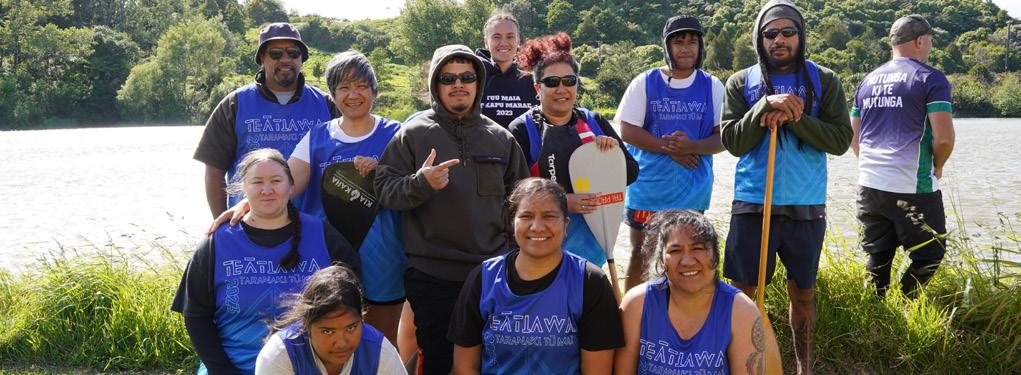
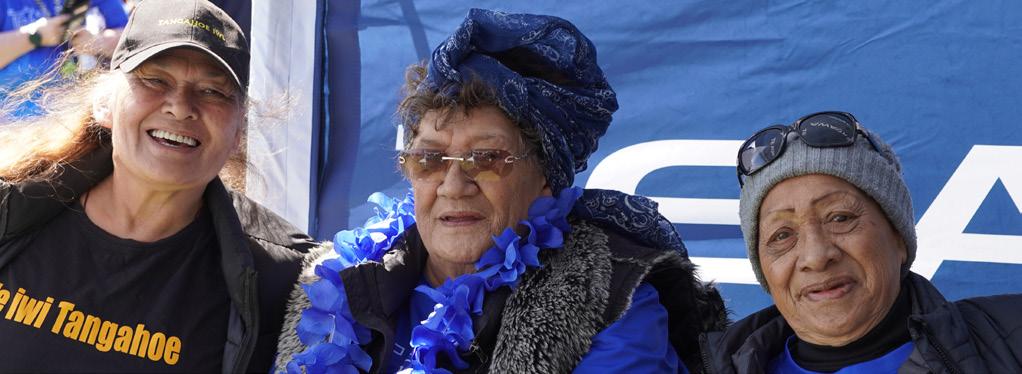
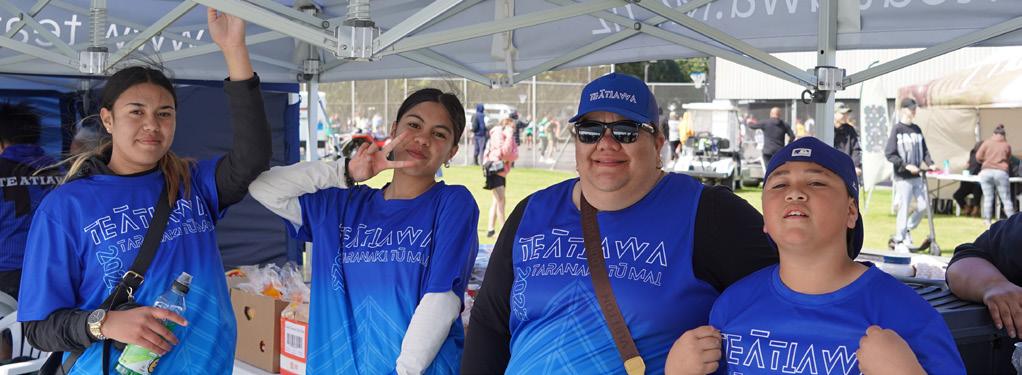
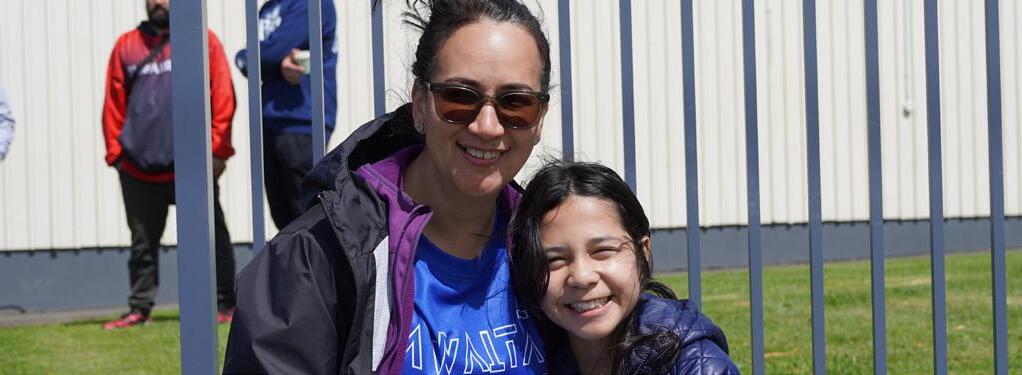
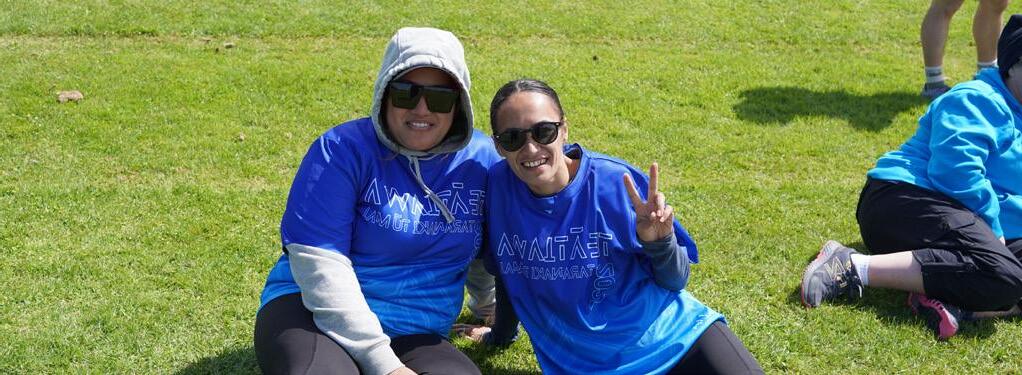

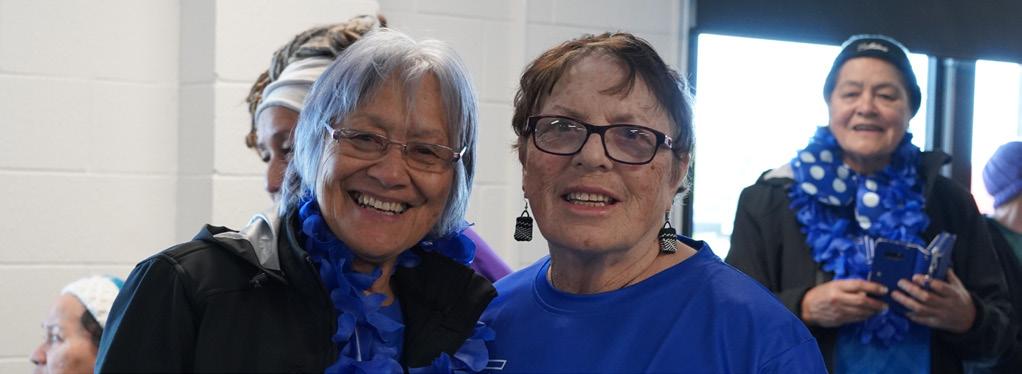
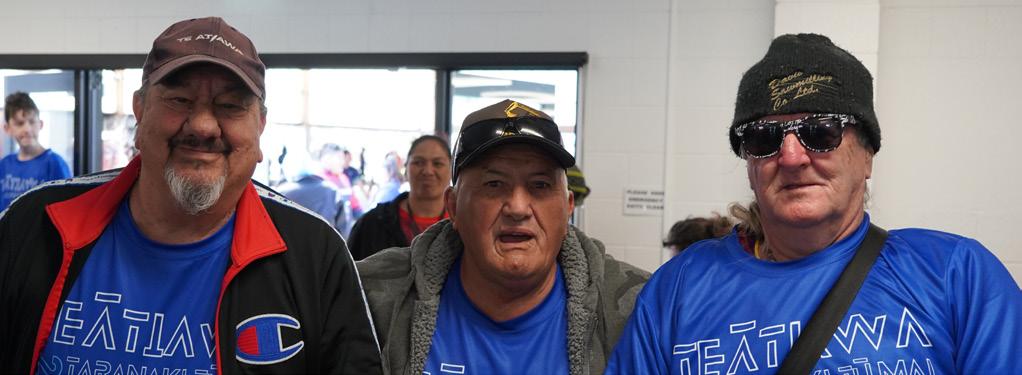
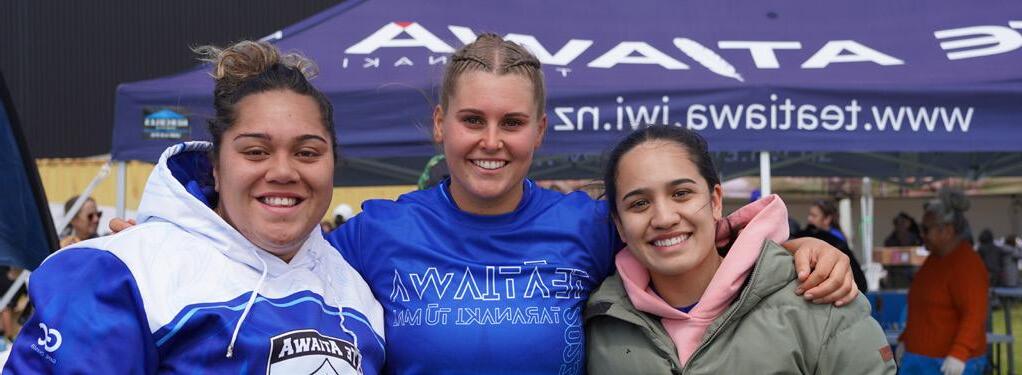
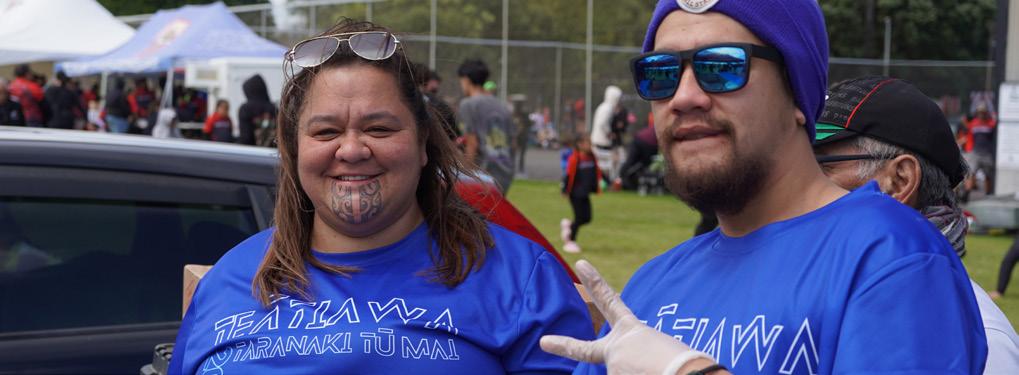
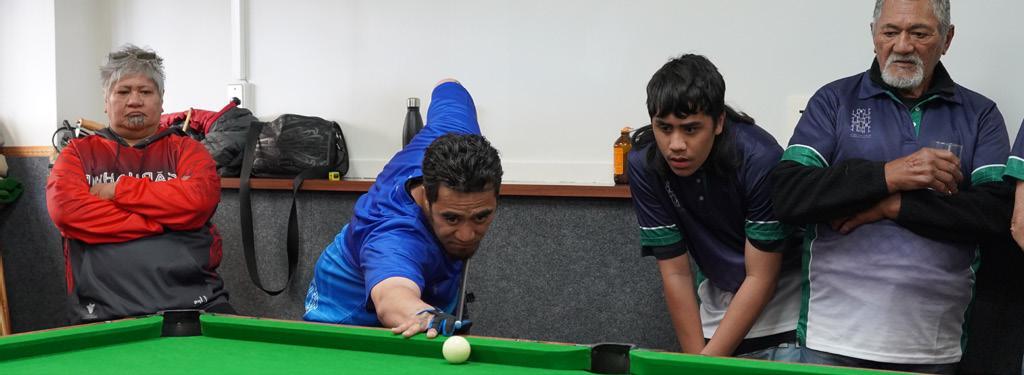
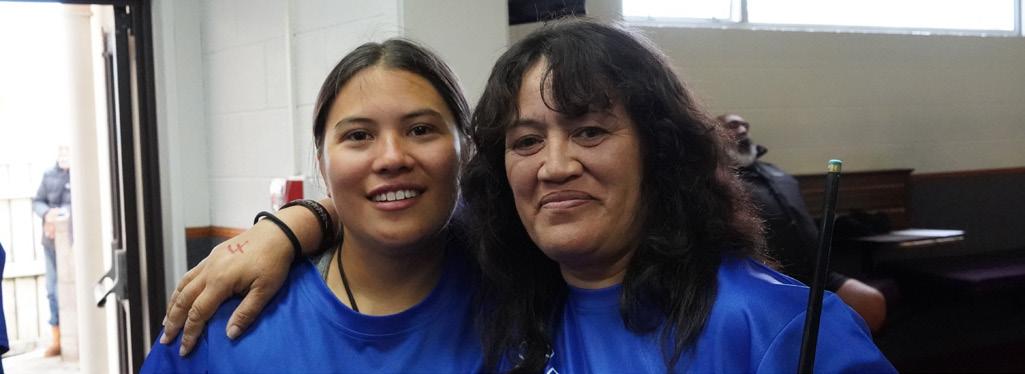
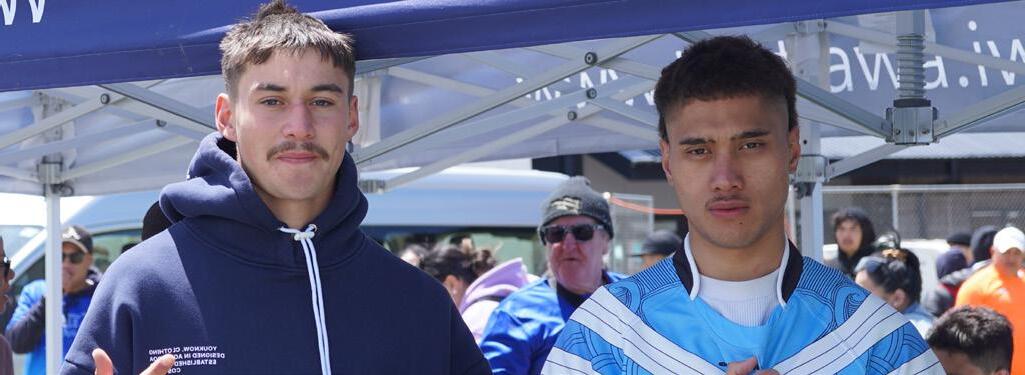
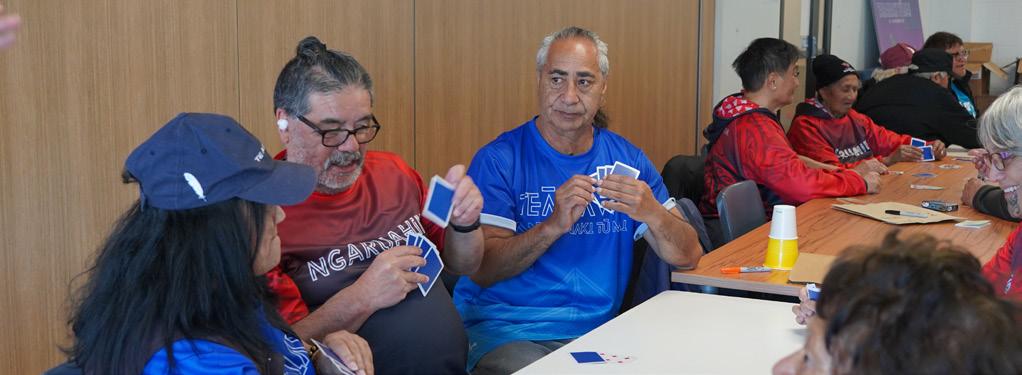
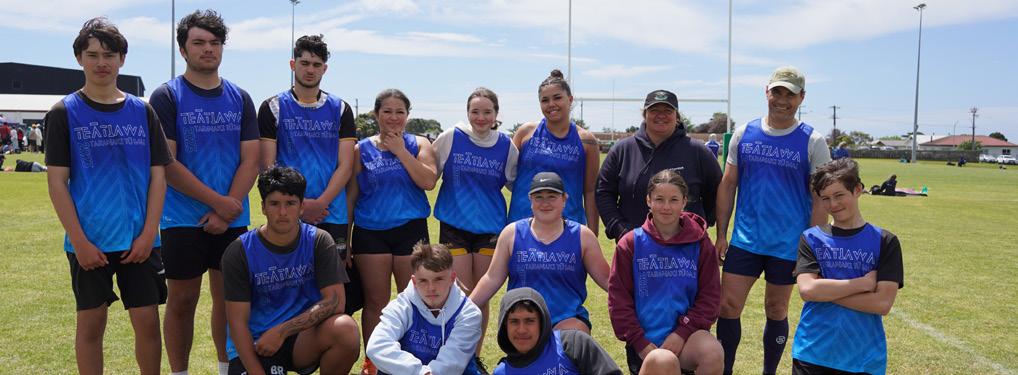
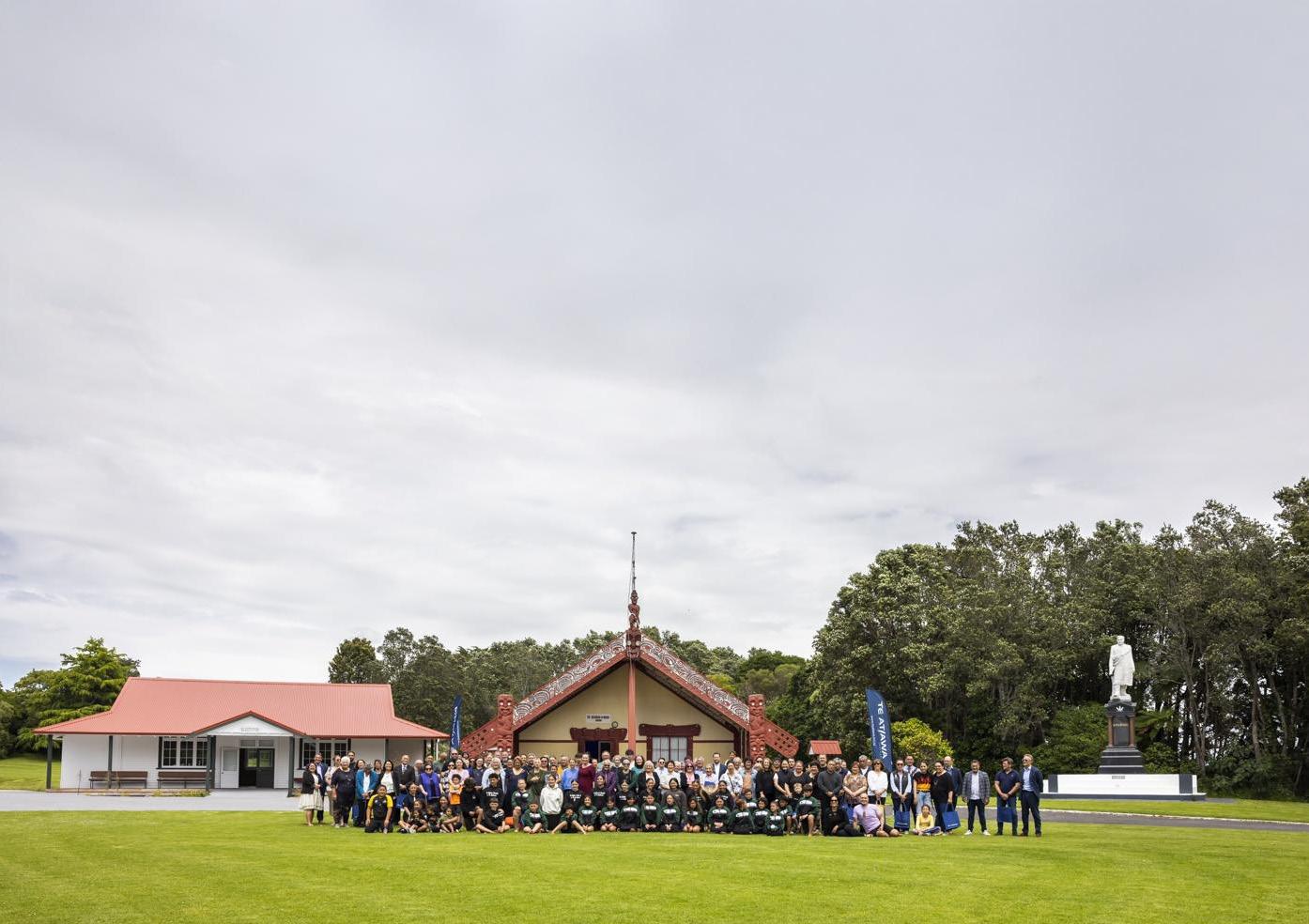
Rere pūhoronuku atu rā te mihi whakatairanga ki a koutou, ngā ringa kohikohi i whakakao mai nei a kupu manomano rāua ko kōrero whakamārama. Māringanui hoki ko Te Kotahitanga o Te Atiawa i a koutou e whakapito ngoi ana ki te hanga i tēnei pūraurau ā-tau 2023-2024.
Kei Te Kāhui Apārangi arā, Te Kāhui Maunga Regional Kapa Haka Committee, Boon Ltd, Ka Uruora, Ngā Iwi o Taranaki (Tania Niwa) me Raymond Tuuta Photography (Raymond Tuuta), nei rā te mihi whakawhētai atu rā ki a koutou. Me pēnei kē te whakaaro “ki te kotahi te kakaho ka whati, engari anō ki te kapuia e kore e whati”. He whakataukītanga kōrerotanga tēnei mō te mahi ngātahi, ā, nā konā ka puta mai ngā hua e whaitake ai ngā uri whakaheke a Tamarau rāua ko Rongoueroa huē hā! huē hā!
Te Kotahitanga o Te Atiawa would like to express our gratitude to all individuals, organisational partners and business who have contributed to the development and publication of this Annual Report 2023-2024. Ngā mihi manahau ki a koutou katoa.
